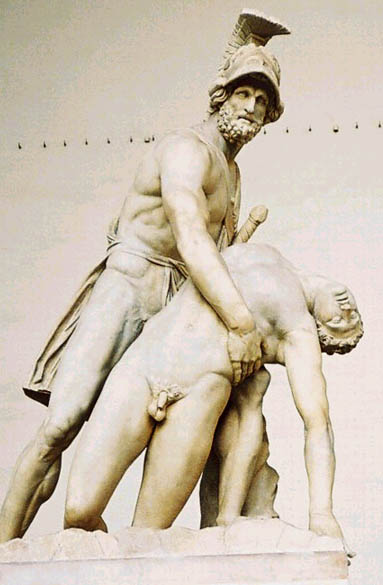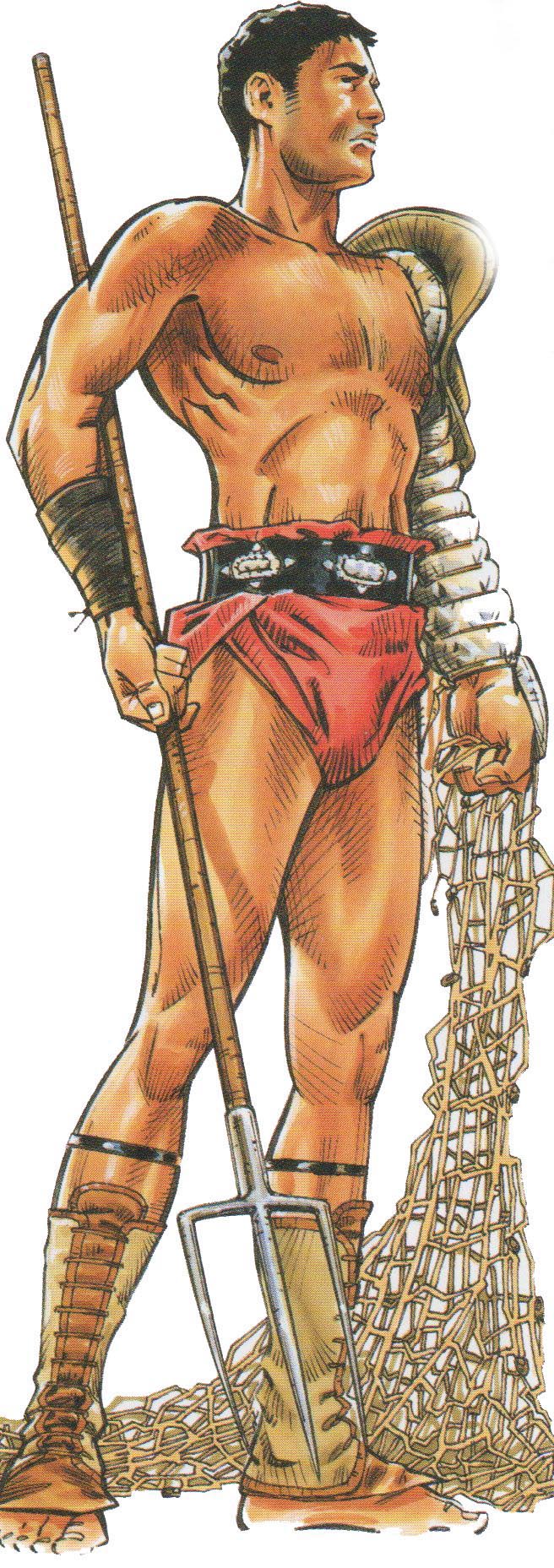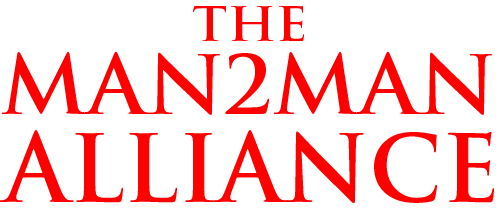




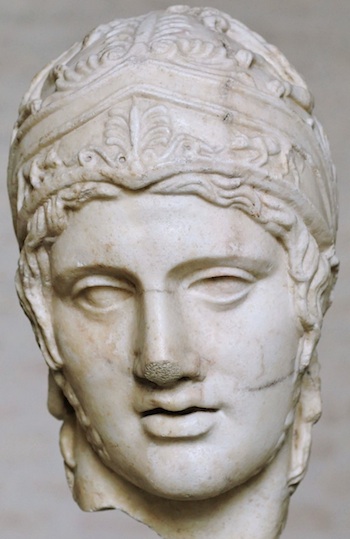

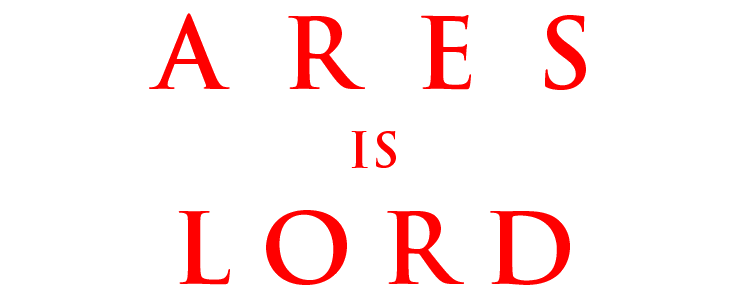
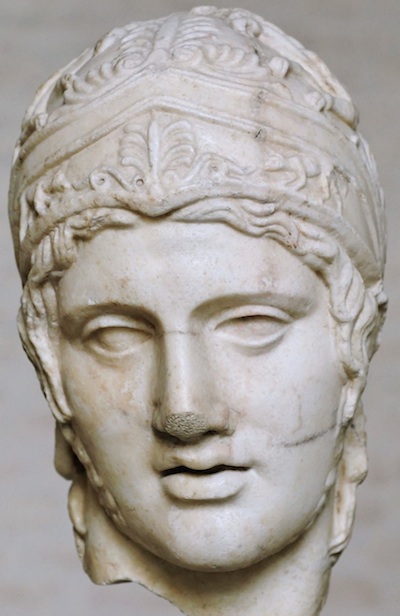









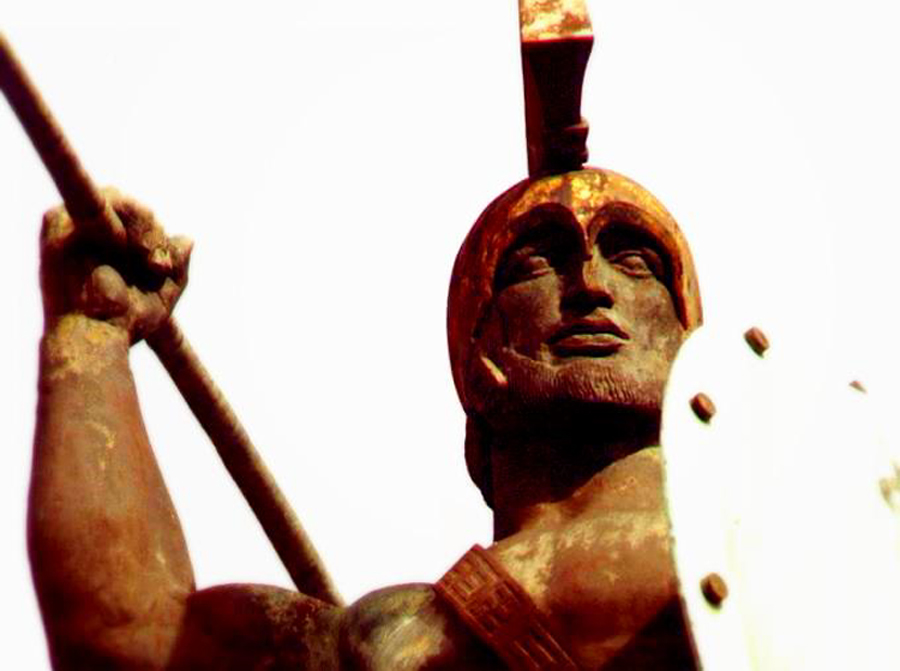


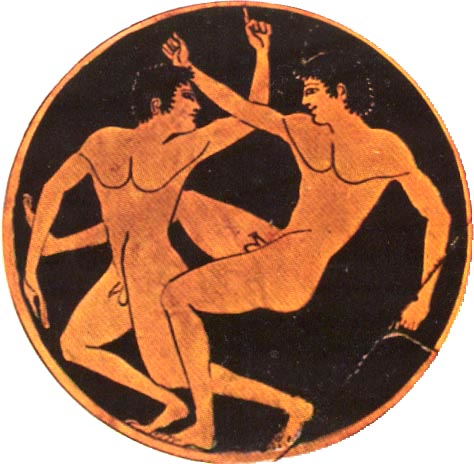
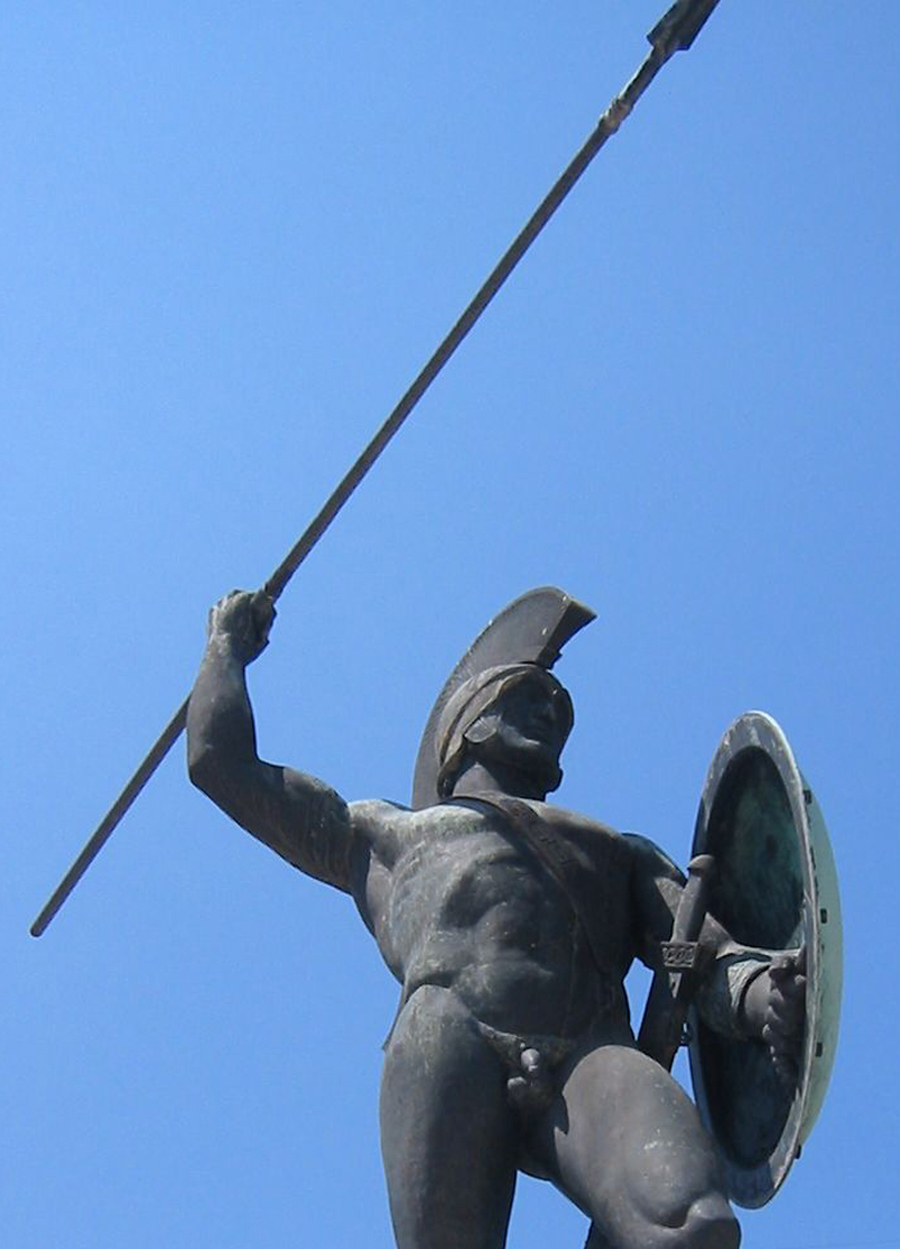
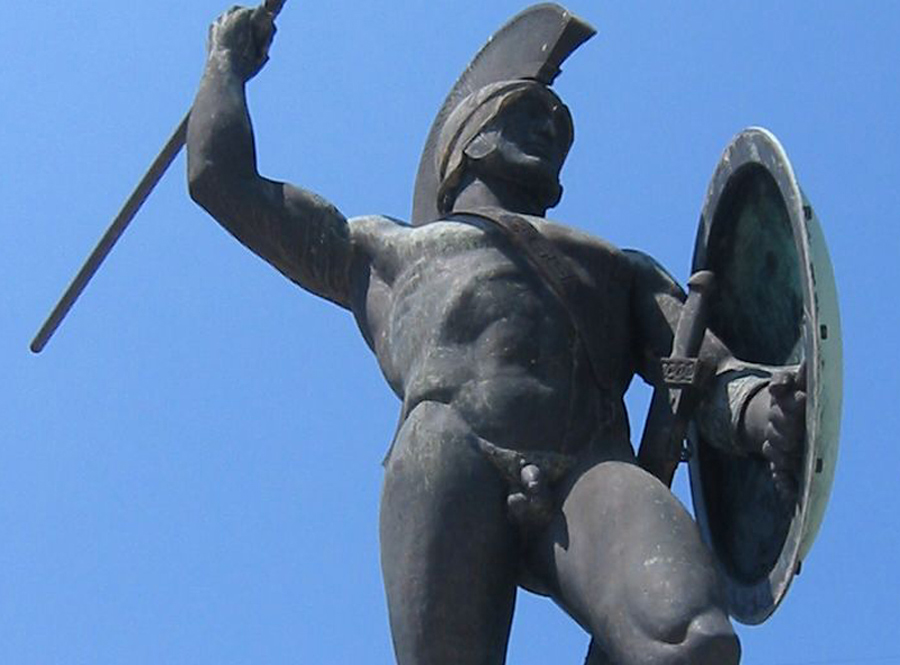
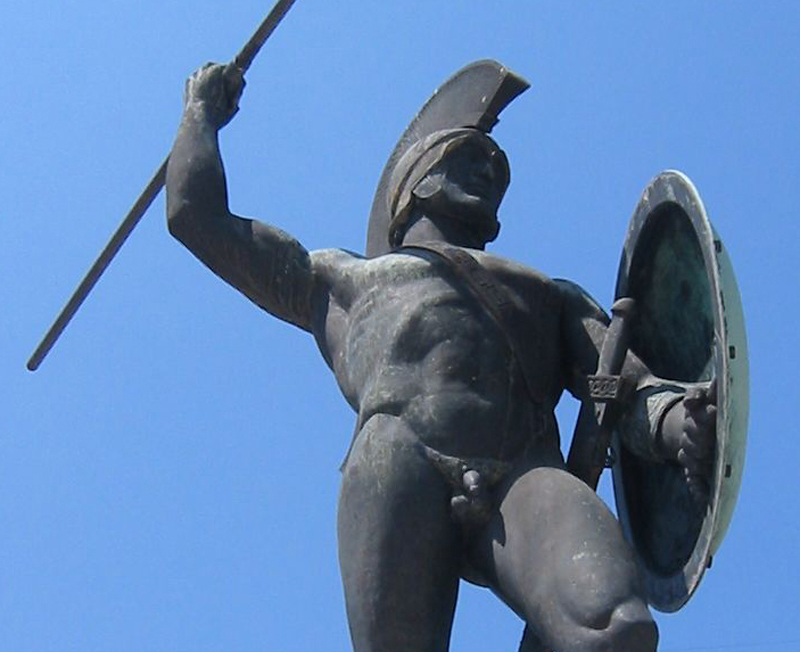
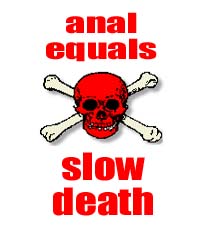

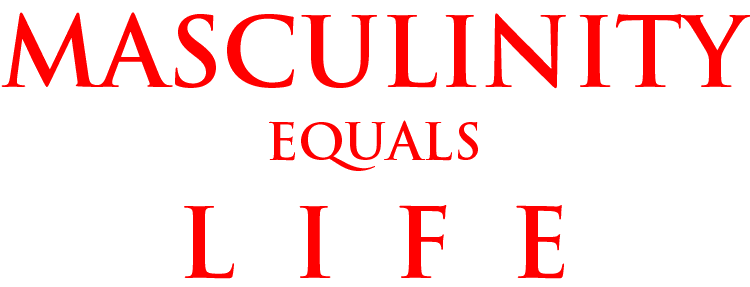







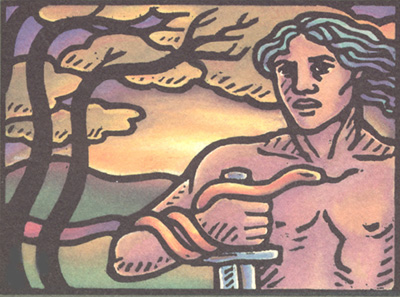


MANHOOD: A Reductional, Functional, Teleological, Incantational, and, above all, Sanctional --
Lexicon
Hi guy.
Welcome to the second half of Biblion Tetarton -- Book IV -- of Manhood: A Lexicon.
My name is Bill Weintraub, and I'm the creator of The Man2Man Alliance and Ares is Lord websites, and the author of Manhood: A Lexicon.
Manhood: A Lexicon is, basically, a book -- masquerading as a webpage.
And, like any book, it's best read from the beginning.
So -- I strongly encourage you to read, if you haven't already, the Prefatory Note and Prolegomena to Manhood: A Lexicon ;
And then Biblion Proton ;
Followed by Biblion Deuteron and Biblion Triton.
It's important that you read that material, and in that order:
Doing so will greatly aid your understanding of the material you encounter in Biblion Tetarton and the rest of Manhood: A Lexicon.
Also:
Biblion Tetarton -- Book IV -- is divided into sections:
WARRIORS AND WARRIORDOMS
FATHER AND KING
ARES - EROS - AGON
MANLY MORAL ORDER
IN UNION WITH VALOUR
Again, it's important that you read all five sections, and in the order given.
Finally:
Because Biblion Tetarton -- Book IV -- is long, and because some people have slower internet connections than others, the Book occupies two separate files online.
You can access the first three sections of Biblion Tetarton either by clicking here ;
Or simply by using this List of Contents:
WARRIORS AND WARRIORDOMS
FATHER AND KING
ARES - EROS - AGON
MANLY MORAL ORDER
IN UNION WITH VALOUR
And -- if you have a fast internet connection, you can access the entirety of Biblion Tetarton by clicking here.
July 20, 2013
BIBLION TETARTON
WARRIORS AND WARRIORDOMS
FATHER AND KING
ARES - EROS - AGON
MANLY MORAL ORDER
IN UNION WITH VALOUR
By Bill Weintraub
BIBLION TETARTON
By Bill Weintraub
Let's get back to Plato and Heraclitus.
Question:
Does Plato ever say that "Fighting Manhood and its attendant Struggle and Fight -- is the Father of All?"
No.
Does that bother or concern me -- Bill Weintraub?
No, not in the least.
Because it's my hard-held belief, the justification for which I've amply documented in the Prolegomena and Biblion Proton, Deuteron, and Triton of this Lexicon of Manhood, that Fighting Manhood was the sine qua non -- the "without which not" -- of Life both in the Warriordoms of "sensible" life in the ancient world -- and in the Warrior Kosmos -- the "intelligible" World of Being -- which informed all Life -- in the Warriors' sensible realm.
And, you know, I can make the same statement with the word "Manly" inserted before the word "Life" --
That is, that Fighting Manhood was the sine qua non -- the "without which not" -- of Manly Life both in the Warriordoms of "sensible" life in the ancient world -- and in the Warrior Kosmos -- the "intelligible" World of Being -- which informed all Manly Life -- in the Warriors' sensible realm --
but I don't think it's necessary.
Fighting Manhood is the sine qua non of Life -- period.
What about Plato then?
And what he says and doesn't say?
Plato is concerned, on the whole, in his writing, with his Theory of (Hypostatized) Ideas -- which was of huge importance to him;
With demonstrating that the Kosmos is fundamentally Moral, and the soul immortal, and that therefore a Life devoted to the Good is a Good Life -- and that one devoted to pleasure, vice, and hedonism -- is not; and
that ethically, socially, and politically, what matters is the Idea of Good, which he also, sometimes, calls "Justice" -- and which, as you'll see, is intimately related to Fighting Manhood -- but which, however, and as I've explained, Plato NEVER defines.
Instead, it's up to *us* -- each and every one of us -- to define our own Idea of Good -- and to be able to rationally defend that definition.
For, as Shorey makes clear, that Idea is, in the Republic, a blank check ; we -- or the Spartans or anyone else who wants a state -- have to fill it in.
Nevertheless, what, according to Shorey, might we deduce to be Plato's Idea of Good?
"a Dorian ideal" : Dorian = Spartan -- the Spartans spoke a form of ancient Greek known as Dorian, and the Spartan aka Dorian aristocracy and its norms and mores had a huge impact on all other aristocracies throughout Greece.
Shorey says the Dorian was an "ideal of order, harmony, discipline, and restraint."
But what sort of "order?"
Answer: A Manly Moral Order.
Again, the Greeks didn't need the word "manly" -- they were living in a Masculinist and Warrior Culture ;
But you're not -- you're living in an effeminized and hedonistic culture -- which is why you need to hear the words Manly -- and Moral -- and Order.
You need also to understand that when Plato uses the words "justice" and "just" he means, more often than not, exactly that:
A "well-ordered" and "righteous" Manly Moral Order.
So -- the ancient Greek word often translated as "just" is
And the significant term in Liddell and Scott's list is -- "well-ordered."
Because Plato believes that if both the City-State and the Man are "well-ordered" -- and by "well-ordered," of course, he means "morally well-ordered" -- it will also, and virtually automatically, be Just.
And because Plato lives in a Warriordom informed by a Warrior World of Being, a Warrior Kosmos, he de facto, and as you'll see, conceptualizes that Moral Order as a Manly Moral Order ; that is, a "well-ordered" and "righteous" Manly Moral Order which is suffused with Fighting Manhood.
Shorey also says "harmony."
And what sort of Harmony?
The Harmony and Concord of a Homonoia -- a Society of Warrior Equals.
A Harmony, as you're about to see, which is brought about and maintained -- by Fighting.
So -- there's "Order" and "Harmony" ; and they're both products of Fighting Manhood.
While Discipline and Restraint are core Spartan values -- as any of you who'd bothered to look at Plutarch's Sayings of the Spartans and, especially, The Ancient Customs of the Spartans -- would know.
For example:
~Plut. Inst. 4, translated by Babbitt.
And:
Two boys were fighting [δυο παιδες εμαχοντο] and one of them wounded the other mortally with the stroke of a sickle. The friends of the wounded boy, as they were about to separate, promised to avenge him and make away with the one who had struck him, but the boy said, 'In Heaven's name [προς Θεων = By the Gods] do not, for it is not right [dikaios = just, well-ordered]; the fact is, I should have done that myself if I had been quick enough and brave [agathos = manly] enough.'
~Plut. Apoph. 69.34, translated by Babbitt.
Plato develops the Dorian themes of a Manly Order and Masculine Harmony informed by Fighting Manhood -- in a small panygeric to Sparta which occurs in a dialogue known as Alkibiades I or the First Alkibiades, in which Plato's spokesman Sokrates addresses the young, handsome, and very ambitious but undisciplined Alkibiades, who wants to have a career in Athenian politics, but who, says Sokrates, lacks the necessary qualifications.
Sokrates:
Should you choose, again, to look at the temperance and orderliness, the facility and placidity, the magnanimity and discipline, the courage and endurance, and the toil-loving, success-loving, honor-loving spirit of the Spartans, you would count yourself but a child in all these things.
~Plat. Alc. 1 122c, translated by Lamb.
Let's break that down.
Sokrates lists the following qualities which characterize Sparta and the Spartans, and which, he says, Alkibiades, and, by extension, Athenians in general, lack:
Sophrosyne = self-control
Kosmiotes = propriety, decorum, orderly behaviour
from
Kosmios = well-ordered, regular, moderate ; with to [the] = decency
from
Kosmos = order, good order, good behaviour, decency, the world or universe, from its perfect order
Euchereia -- see Roman numeral II -- indifference to danger or hardship: hence, coolness, fortitude, also, ease, agreeableness
Eukolia = contentedness, good temper
Megalophrosyne = greatness of mind
Eutaxia = good order, discipline -- eutaxia is, above all, keeping one's position in the hoplite formation no matter what -- never breaking the line, the shield wall
Andreia = Manhood, Manliness, Manly Spirit
Karteria = patient endurance, patience
from
Karteros = strong, staunch, stout, sturdy, steadfast, mighty, potent
from
Kartos = strength, vigor, courage
Philoponia = love of labour, laboriousness, industry
from
Philos = love ; and
Ponos = work, esp. hard work, toil, the toil of battle (μαχης πονος), bodily exertion, exercise
Philonikia = love of victory, rivalry, contentiousness -- Liddell says "mostly in bad sense," but that's clearly not the case here
from
Philos = love ; and
Nike = victory in battle, and in the games
Philotimia = love of honour or distinction, ambition, and again, Liddell says "freq. in bad sense," but that's not so here
from
Philos = love ; and
Timé = Worth
Quite a list, huh?
Now, and just for starters, let's be clear:
Every one of the qualities listed here, from Sophrosyne -- self-control -- to Philotimia -- love of Worth -- are Manly qualities.
They all, ultimately, reduce to Manhood, and to Fighting Manhood, which is what fathers them -- in both the World of Becoming and the World of Being.
And, you'll notice, Plato, through his spokesman Sokrates, puts Andreia in the very center of the list.
Lamb translates Andreia as Courage, but that's NOT the dictionary definition; rather, and according to Liddell and Scott,
Andreia is Manhood, Manliness, Manly Spirit.
Sparta was supreme, says Prof Lendon, in Andreia.
In short, it's Andreia -- Fighting Manhood -- which gives Sparta all those sterling qualities enumerated by the wisest Man in the ancient world -- Sokrates.
And it's the lack of Andreia -- an-andria = want of manhood -- want of a particular sort of Manhood, a Morally-Ordered Fighting Manhood, which, says Sokrates, has ruined Athens and which we, the audience both ancient and modern, know will destroy Alkibiades.
Notice, in that regard, how many of the words denote moral order and orderliness -- whether that moral order be within the individual Man in the form of Masculine self-control and Manly restraint ; or a societal good order -- expressed as discipline and harmony.
So -- there's Sophrosyne, self-control ; and Kosmiotes or orderliness -- the word derives from Kosmos itself, which denotes the moral order of the Universe.
To Plato, both the city-state and individual, the city-state and the Man, should have a Manly Good Order, a Manly Moral Order, which mirrors the Manly Moral Order of the Warrior Kosmos itself.
And that's really what Plato means, most of the time, by Justice -- Manly Moral Order.
Continuing down the list, we see Euchereia, which is indifference to danger or hardship -- coolness and fortitude ; and
Eukolia, contentedness and good temper.
Again, these are traits of both the well-ordered Man -- and his harmonious society -- his Homonoia.
Then there's Megalo-phrosyne, which Liddell translates as "greatness of mind"; there's a strong suggestion of greatness of heart -- magnanimity -- in the word as well.
Which is followed by Eutaxia, discipline in battle, and in particular, in the hoplite line.
Eutaxia has a rich historic-mythologic history -- and in his book Soldiers and Ghosts, Lendon discusses that history in a chapter titled "Two Stubborn Spartans," one of whom refuses to give up his place in the hoplite formation even though all the Men around him have been killed.
Eutaxia, obviously, is strongly linked to the echt Spartan value of --
Andreia -- Manhood, Manliness, Manly Spirit -- which is core and which occurs in the center of the list Sokrates presents -- and is followed by
Karteria -- endurance -- which derives from Karteros -- strong, staunch, stout, sturdy, steadfast, mighty, potent -- and Kartos -- strength, vigor, and courage.
And finally there are the three "philo's":
Philoponia -- love of hard work and toil, including the toil of battle;
Philonikia -- love of victory, whether in war or the games; and
Philotimia -- love of Worth -- which, as we've seen, is Manhood.
So -- and once again, while many of these words are concerned with Order, it's a Manly Moral Order they're concerned with, a Manly Moral Order rooted in Fighting Manhood.
Again -- and I'm belaboring the point because it needs to be belabored:
ALL these words reduce to Manhood, Fighting Manhood:
Sophrosyne and Kosmiotes are both Manly traits;
as are Euchereia and Eukolia, which express a Manly Moral Harmony.
Eutaxia of course is Manly.
As is Karteria -- the Strength to Endure, to be Staunch, Sturdy, Steadfast, Mighty, and Potent.
And Philoponia, Philonikia, and Philotimia -- are all Manly -- love of the toil of battle, of victory, of Worth -- all are expressions of Manhood, Fighting Manhood.
So -- when Shorey speaks of a Dorian -- that is, Spartan -- "ideal of order, harmony, discipline, and restraint opposed to the laxity of the Athenian democracy" --
he's referring to passages like this one in the First Alkibiades, in which core attributes of Spartan Fighting Manhood -- are lauded and praised -- by Plato -- the West's and the World's first and greatest thinker.
There's no way around that.
Nor should we expect there to be.
Plato can't escape the fundamental postulates of his own culture -- which is a Warriordom; or of that culture's World of Being, which is a Warrior World of Being.
Suffused -- with Fighting Manhood.
Nor does he have any reason to wish to escape those postulates.
For they're not dysfunctional.
To the contrary, it's the absence of manliness -- the want of Manhood -- which results in dysfunction, disorder, dis-harmony and dissonance.
While Manhood is harmonious.
And more.
For, as we'll see in Biblion Pempton, to be like to God, Plato will tell us -- is to be Manly.
In short, Sparta is supreme in Andreia -- Manhood, Manliness, Manly Spirit -- which in turn produces the Platonic and Shorey-an ideal of order, harmony, discipline, and restraint.
BIBLION TETARTON
By Bill Weintraub
How important, then, is Manhood -- Fighting Manhood -- in Plato's (closely and privately held) definition of the Idea of Good, the Supreme Good, the Sanction, the Primal Love and First Cause, that which is "the cause for all things of all that Stands Erect and is Morally Righteous and Morally Beautiful, Father in the visible world to Light, Author of Light and itself in the Intelligible World being the Authentic Source of Truth and Reason?"
EXTREMELY IMPORTANT.
First off, and as I've explained, Fighting Manhood was not just an intrinsic but the absolutely vital part of the Warrior and Masculinist Culture in which Plato lived -- intrinsic and absolutely vital because in that Warrior and Masculinist Culture, which was virtually world-wide, Fighting Manhood was not just a but the requirement for survival.
Fighting Manhood was the requirement for survival in the ancient world -- and that went without saying.
But Plato does say it, and on more than one occasion.
For example, in the opening pages of Plato's Laws, a conversation between and among an Athenian, a Spartan, and a Cretan -- the Spartans and the Cretans were buddies, and many of their core institutions were very similar --
Clinias, the Cretan, says that "All our customs
are adapted for war, and, in my opinion, this was the object which [our Cretan] lawgiver had in view when he ordained them all. Probably this was his reason also for instituting common meals: he saw how soldiers, all the time they are on campaign, are obliged by force of circumstances to mess in common, for the sake of their own security. And herein, as I think, he condemned the stupidity of the mass of men in failing to perceive that all are involved ceaselessly in a lifelong war against all States. [State = polis πολις = city-state.] If, then, these practices are necessary in war -- namely, messing in common for safety's sake, and the appointment of relays of officers and privates to act as guards -- they must be carried out equally in time of peace. For (as he would say) "peace," as the term is commonly employed, is nothing more than a name, the truth being that every State is, by a law of nature, engaged perpetually in an informal war with every other State. And if you look at the matter from this point of view you will find it practically true that our Cretan lawgiver ordained all our legal usages, both public and private, with an eye to war, and that he therefore charged us with the task of guarding our laws safely, in the conviction that without victory in war nothing else, whether possession or institution, is of the least value, but all the goods of the vanquished fall into the hands of the victors.
Athenian
Clinias
Megillus [a Spartan]
Athenian
Clinias
Athenian
Clinias
Athenian
Clinias
Athenian
Clinias
Athenian
Clinias
[emphases mine]
~Plat. Laws 1.625e - 626e, translated by RG Bury.
So what are expressed are attitudes and beliefs which were very common and core -- among Men in the ancient Greek world:
Again, these were very common attitudes in the ancient Greek world, and we can easily see, just by the amount of space devoted to the development of the Warrior Caste in the Republic -- which is both Plato's ideal city-state and his ideal Man -- how important Fighting and Fighting Manhood were -- not just to the average Greek, but to Plato himself.
Further, Plato consistently recommends, praises, and extols training and preparation for Fighting and War, and -- also consistently -- says that the lust for money gets in the way of that training and preparation:
Clinias
Athenian
Clinias
Athenian
Clinias
Athenian
Clinias
Athenian
Clinias
Athenian
~Plat. Laws 8.830-832, translated by Bury and myself.
Again, Plato is very consistent in promoting the development of what is, in fact, Fighting Manhood, while being highly critical of greed and love of gain --
And, that criticism always, whether it's in the Republic or the Laws or elsewhere, and as I discussed in the Prologue to Biblion Proton, comes down to this:
So the thing to do, says Plato -- is what the Spartans do:
Separate the Men -- the Fighting Men -- from money:
Gold and silver, we will tell them, they have of the divine quality from the Gods always in their souls, and they have no need of the metal of men nor does holiness suffer them to mingle and contaminate that heavenly possession with the acquisition of mortal gold, since many impious deeds have been done about the coin of the multitude, while that which dwells within them is unsullied. But for these only of all the dwellers in the city it is not lawful to handle gold and silver and to touch them nor yet to come under the same roof with them, nor to hang them as ornaments on their limbs nor to drink from silver and gold.
So living they would save themselves and save their city.
~Plat. Rep. 3.416d-417a, translated by Shorey.
"So living they would save themselves and save their city."
The Republic is full of such beautiful -- and true -- sentiments -- masterfully presented.
Which is why you should read the Republic.
So, and that said -- for Plato -- as for his fellows in the ancient world -- Manhood -- Fighting Manhood -- is synonymous with Virtue, and Fighting Manhood is developed and becomes most pronounced in a Warrior Caste which is kept free of the pursuit of gain -- of money ;
and instead passes its time -- in exercises, "gymnastic," "choristic," and "agonistic" -- which develop that Manhood -- that Fighting Manhood.
Moreover:
The people in Plato's dialogues are, more often than not, real people -- people he knew:
Sokrates, Cratylus, Timaeus, Theaetetus, Lysis, Hippothales, Charmides, Meno, Menexenus, Parmenides, Laches, Nicias, Glaucon, Critias, Alkibiades, etc. -- all real, and all Men, and all therefore Warriors.
And we often hear, in those dialogues, discussion of what's happened to those Warriors -- and how they've behaved -- in War.
Here, from among a great many, are just two examples:
Charmides, as narrated by Sokrates:
Socrates, he said, how did you survive the battle? (Shortly before we came away there had been a battle at Potidaea, of which the people here had only just had news.)
In the state in which you see me, I replied.
It has been reported here, you know, said he, that the battle was very severe, and that many of our acquaintance have lost their lives in it.
Then the report, I replied, is pretty near the truth.
You were present, he asked, at the fighting?
I was present.
Then sit down here, he said, and give us a full account; for as yet we have had no clear report of it all. And with that he led me to a seat by Critias, son of Callaeschrus. So I sat down there and greeted Critias and the rest, and gave them all the news from the battlefield, in answer to their various questions; each had his inquiry to make.
When we had had enough of such matters, I in my turn began to inquire about affairs at home, how philosophy was doing at present, and whether any of the rising young men had distinguished themselves for wisdom or beauty or both. . . .
~Plat. Charm. 153a-155e, translated by Lamb
Alkibiades, Sokrates' Beloved, tells us more of the story of Sokrates the Warrior at Potidaea -- and at another battle -- in Plato's Symposion :
Sokrates and I later went on a campaign together to Potidaea; and there we were messmates [syssiteo]. Well, first of all, he surpassed not me only but every one else in bearing hardships [ponos] ; whenever we were cut off in some place and were compelled, as often in campaigns, to go without food, the rest of us were nowhere in point of endurance [karteria]. Then again, when we had plenty of good cheer, he alone could enjoy it to the full, and though unwilling to drink, when once overruled he used to beat us all; and, most surprising of all, no man has ever yet seen Socrates drunk. Of this power I expect we shall have a good test in a moment. But it was in his endurance of winter -- in those parts the winters are awful -- that I remember, among his many marvellous feats, how once there came a frost about as awful as can be: we all preferred not to stir abroad, or if any of us did, we wrapped ourselves up with prodigious care, and after putting on our shoes we muffled up our feet with felt and little fleeces. But he walked out in that weather, clad in just such a coat [a cloak, called a himation] as he was always wont to wear, and he made his way more easily over the ice unshod [barefoot anupodetos] than the rest of us did in our shoes. The soldiers looked askance at him, thinking that he despised them.
So much for that: but next, the valiant deed our strong-souled hero dared
on service there one day, is well worth hearing. Immersed in some problem at dawn, he stood in the same spot considering it; and when he found it a tough one, he would not give it up but stood there trying. The time drew on to midday, and the men began to notice him, and said to one another in wonder: 'Socrates has been standing there in a study ever since dawn!' The end of it was that in the evening some of the Ionians after they had supped -- this time it was summer --brought out their mattresses and rugs and took their sleep in the cool; thus they waited to see if he would go on standing all night too. He stood till dawn came and the sun rose; then walked away, after offering a prayer to the Sun.
Then, if you care to hear of him in battle [mache]-- for there also he must have his due -- on the day of the fight in which I gained my prize for valor [aristeia] from our commanders, it was he, out of the whole army, who saved my life: I was wounded, and he would not forsake me, but helped me to save both my armor [hopla] and myself. I lost no time, Socrates, in urging the generals [strategos] to award the prize for valor to you; and here I think you will neither rebuke me nor give me the lie. For when the generals, out of regard for my consequence, were inclined to award the prize to me, you outdid them in urging that I should have it rather than you.
And further let me tell you, gentlemen, what a notable figure he made when the army was retiring in flight from Delium [where the Thebans defeated the Athenians in 424 BC -- Sokrates was now forty-five, while Alkibiades was probably about twenty-six]: I happened to be there on horseback, while he marched under arms [hopla -- that is, as a hoplite, a foot-soldier]. The troops were in utter disorder, and he was retreating along with Laches, when I chanced to come up with them and, as soon as I saw them, passed them the word to have no fear, saying I would not abandon them. Here, indeed, I had an even finer view of Socrates than at Potidaea -- for personally I had less reason for alarm, as I was mounted; and I noticed, first, how far he outdid Laches in collectedness, and next I felt -- to use a phrase of yours, Aristophanes -- how there he stepped along, as his wont is in our streets, "strutting like a proud marsh-goose, with ever a side-long glance," turning a calm sidelong look on friend and foe alike, and convincing anyone even from afar that whoever cares to touch this person will find he can put up a stout enough defence. The result was that both he and his comrade [hetairos] got away unscathed: for, as a rule, people will not lay a finger on those who show this disposition in war; it is men flying in headlong rout that they pursue.
[And that, by the way, is true: Men whose body-language states that they know how to Fight, and will not back down from a Fight, are far less likely to be attacked -- in most situations.]
This is from the opening of the Theaetetus:
Eucleides
Terpsion
Eucleides
Terpsion
Eucleides
Terpsion
Eucleides
Terpsion
Eucleides
Terpsion
Eucleides
Terpsion
Eucleides
~Plat. Theaet. 142a-c, translated by Fowler
Eucleides, who took notes of the conversation between the aged Sokrates and the young Theaeteus, then tells Terpsion he developed a book from those notes, a book which Eucleides then instructs his "boy" -- probably a slave-boy -- to read aloud.
As the boy reads, we learn that Sokrates and Theaetetus conversed at a palaistra -- as did Sokrates and Charmides.
And that Sokrates was introduced to the young Theaetetus by another teacher named Theodorus, who said of him
So once again you see the union of Goodness -- with Manhood.
And you see words which we've much discussed, kalon, agathon, andreion -- and all of which reduce to Manhood -- applied to Theaetetus the Warrior.
And you see, as we also see at Sparta, in, for example, the story of Kleonymus and Archidamus, how the promise of "Goodness" in boyhood is realized on the battlefield once the youth has achieved "Fighting Age."
And you also see how the palaistra, with its emphasis on the beauty of both the Manly body and the Manly soul, is one of the chief focal points for Manly Eros.
Now:
These examples are, one could argue, parenthetical ; that is, that the Warrior attributes of Sokrates in the Charmides and Symposion and Theaetetus in the dialogue of his name -- are not core to what's subsequently discussed.
Not so.
The Warriorhood of both Sokrates and Theaetetus matters a great, great deal.
I know that's hard for you to understand, but -- they're living in a Warriordom informed by a Warrior Kosmos, a Warrior World of Being -- and their Warriorhood matters.
Their Human Worth -- and since they're Men, we can call it Manliness -- is measured not by their greed and selfishness and stinginess -- but by their conduct -- in War:
Terpsion
Eucleides
Terpsion
Conduct in War -- Conduct in Battle -- Conduct in Fight -- matters.
A lot.
Sokrates defends the wounded Alkibiades -- and his armor -- and then refuses to accept the award of valour, insisting it go to his beloved instead;
and then, when retreating from Delium, his body-language is such that would-be attackers won't go near him.
While Theaetetus' conduct in the battle is highly praised -- and is seen as fulfilling the Manly promise -- of his boyhood.
Once again:
Conduct in War -- Conduct in Battle -- Conduct in Fight -- matters.
A lot.
A Man's Worth is measured not, as it is in our culture of greed-and-growth, by how much money he has, how selfish he is, how greedy he is --
but by Virtue --
which is FIGHT --
Fighting Manhood --
the Man's Willingness and Ability to PHYSICALLY FIGHT -- another Man -- often genitally nude -- with or without weapons.
There are, in theory, other components to Virtue -- specifically, Piety, Self-Control, and Justice.
But as we'll see, they're intimately connected to and involved with Fighting Manhood -- the Man's Willingness and Ability to Fight.
So -- and again:
Conduct in War -- Conduct in Battle -- Conduct in Fight -- matters.
A lot.
A Man's Worth is measured by Fight -- and Fighting Manhood.
Which is made even more plain and even more explicit in the Platonic dialogue known as the Menexenus, which is a funeral oration for the Athenian Warrior dead, and which ends with extraordinarily powerful words "spoken" by the dead Warriors themselves and addressed to their children ; Paul Shorey says that Plato "concludes with an apostrophe to the children of the glorious dead, expressing what their fathers said or would have wished to have said to their sons, which Cicero [ca 50 BC] tells us was read annually at Athens and which is still read in schools throughout the world today [ca 1934 AD] as one of the world's noblest and most inspiring utterances of essential patriotism":
Wherefore you must bear in mind our words, and whatsoever else you practice you must practice it in union with valor [areté -- Manhood], being well assured that when divorced from this all possessions and pursuits are base and ignoble. For neither does wealth bring honor to its possessor if combined with cowardice [an-andria -- lack of manhood, UN-manliness] --
for such an one is rich for another rather than for himself -- nor do beauty and strength appear comely, but rather uncomely, when they are attached to one that is cowardly and base, since they make their possessor more conspicuous and show up his cowardice; and every form of knowledge when sundered from justice [dikaiosyne δικαιοσυνη = righteousness, justice, from dikaios]
and the rest of virtue [areté -- Manhood] is seen to be plain roguery rather than wisdom.
[Again:]
Wherefore you must bear in mind our words, and whatsoever else you practice you must practice it in union with valor [areté -- Manhood], being well assured that when divorced from this all possessions and pursuits are base and ignoble. For neither does wealth bring honor to its possessor if combined with cowardice [an-andria -- want of manhood, UN-manliness] -- for such an one is rich for another rather than for himself -- nor do beauty and strength appear comely, but rather uncomely, when they are attached to one that is cowardly and base, since they make their possessor more conspicuous and show up his cowardice; and every form of knowledge when sundered from that which is just, right, lawful, and well-ordered [dikaios] and the rest of virtue [areté -- Manhood] is seen to be plain roguery rather than wisdom.
For these reasons do you make it your endeavor, first and last and always, in every way to show all zeal that you may exceed, if possible, both us and those who went before us in renown; but if not, be you well assured that if we vanquish you in virtue [areté -- Manhood] our victory brings us shame, whereas, if we are defeated, our defeat brings happiness. And most of all would we be the vanquished, you the victors, if you are careful in your conduct not to trade upon the glory of your ancestors nor yet to squander it, believing that for a man who holds himself of some account there is nothing more shameful than to find himself held in honor [timé] not for his own sake but because of the glory of his ancestors.
In the honors [timé] which belong to their parents, the children truly possess a noble and splendid treasure; but to use up one's treasure, whether of wealth or of honor [timé], and bequeath none to one's children, is the base and unmanly [an-andria] act of one who lacks all wealth and distinctions of his own. And if you practise these precepts you will come unto us as friends unto friends whensoever the appointed doom shall convey you hither; but if you neglect them and play the coward, you will be welcomed graciously by none."
~Plat. Menex. 246d, translated by Lamb
Here's Shorey's precis of that passage:
The virtue [Manhood] of your sires is proved by their readiness to die rather than bring shame on you and the generations to come. Bear our words in mind, and whatsoever else you do, conjoin it with the practice of virtue [Manhood].
Without this, all other possessions and pursuits are vain and shameful. The coward [an-adria -- the UN-manly, he who lacks manhood] piles up wealth for another, and beauty and strength conjoined with a dastard soul only make its shame more conspicuous.
Science divorced from righteousness is knavishness, not wisdom.
Therefore, first and last and evermore strive with might and main and strenuous endeavor to surpass us and your forefathers. In this rivalry our victory will be our shame and our defeat our joy.
You will surpass us if you do not live on our fame [timé -- worth]. To have it is a glorious inheritance ; to waste and spend it and not transmit it to your children augmented by deeds of your own is most shameful and unmanly.
If you heed this admonition, you will descend to us loved and loving, on your appointed day. If you neglect it and play the weaklings, there will be none to give you glad welcome.
So -- the dead Warrior fathers tell their sons to express their Manhood -- their Fighting Manhood.
And not be like the shameful UN-manly, who lack manhood.
The fathers instruct their sons to surpass them in Manhood; and warn them against living on the Fathers' Worth, rather than augmenting it by their own -- for the former is shameful and unmanly.
This oration, by the way, could just as easily have been spoken at Sparta, where the boys were continually urged to surpass their older brothers and their fathers in Warriorhood:
So there were three choirs, corresponding to the three periods of life, which were made up at their festivals, and the choir of old men would begin with this song:
Young valiant men long days ago were we.
Then the choir of men in the prime of life would sing in response,
And that are we; look, if you will, and see.
And the third choir, that of the boys, would sing,
And better far 'tis certain we shall be.
~Plutarch, Instituta Laconica, 15, translated by Babbitt.
So -- and returning to Shorey's precis for a moment:
The areté [Manhood] of your sires is proved by their readiness to die rather than bring shame on you and the generations to come. Bear our words in mind, and whatsoever else you do, conjoin it with the practice of areté [Manhood].
It's because of just this sort of use of the word areté by writers like Plato that Liddell and Scott define it as Manhood, saying
And adding that areté is
And that's exactly right.
In this instance, as in countless others, the Willingness and Ability to Fight of Men -- of Warriors -- the Valour and Prowess of Men and Warriors -- is called and labeled : Areté -- Fighting Manhood.
Which is synonymous with -- and identical to -- Virtue.
Goodness.
Fighting Manhood is Goodness.
Virtue is Fighting Manhood.
And Plato here and elsewhere -- including, as you'll see, in the Theaetetus -- contrasts that Fighting Manhood with "an-andria" -- want of Manhood, UN-manliness.
And look at the opening words:
The dictionary definition of "agathos" is, basically, "good."
But in our Lexicon entry for the word, I say that agathos, because it's the adjectival form of areté, carries with it all these other meanings:
And, sure enough, Lamb translates the word as "valiant."
And that's correct.
These are Warriors who died gloriously in battle, and who in so doing demonstrated Manhood, manliness, strength, bravery, courage, excellence, valour, gallantry, goodness, moral perfection, high character, virtue, merit, value, worth.
And that's the way people in ancient Greece and in Warriordoms generally -- thought of it -- and rightfully so.
A Man could live ignobly -- or die nobly.
Now -- a bit earlier on this page I said that "Fighting Manhood is the sine qua non of Life -- period."
And no doubt many of you thought that was extreme.
But listen to what Plato himself says:
Wherefore you must bear in mind our words, and whatsoever else you practice you must practice it in union with valor [areté -- Manhood], being well assured that when divorced from this all possessions and pursuits are base and ignoble.
"whatsoever else you practice" -- no matter what else in this life you may do -- "you must practice it in union with valor" -- "valor," says Lamb, the translator, and the Greek word is Areté -- Manhood.
And Valour, as I explained in the Prolegomena to this Lexicon, is part of Fighting Manhood -- specifically, Valour is the Willingness to Fight.
Prowess is Ability ; Valour is Willingness -- and together they make up Manhood -- The Willingness and Ability to Fight -- Fighting Manhood -- which is both the First Notion of Goodness and the Primal Love -- the Supreme, All-Encompassing, and without-which-not -- Good.
Plato says so:
Valour, Areté, Fighting Manhood -- without it, says Plato, Life is not worth living.
Without it, "all possessions and pursuits are base and ignoble."
That's clear, isn't it?
Couldn't be clearer.
For, Plato says,
Even beauty and strength become ugly when attached to the male who lacks manhood.
And then, Plato explicitly links Justice [dikaiosyne δικαιοσυνη = righteousness, justice, from dikaios] with Fighting Manhood:
What Plato's saying is that Justice -- which, as we've seen above and will see below, is "good order," which, in turn, is Manly Moral Order -- and Fighting Manhood -- reside in the Warrior World of Being -- the Warrior Kosmos -- and any alleged knowledge which is "sundered" -- apart from -- those Essences in the World of Being is "roguery" -- opinion -- rather than Wisdom.
So -- and this isn't easy, but you need to try to understand it:
The translator, Lamb, has rendered the word "areté" in two different ways:
First, he says,
So in that sentence, Areté, says Lamb, = Valour = Willingness to Fight = Fighting Manhood.
That's easy.
But, a few lines further down the page, Lamb says,
Here, and all of a sudden, Areté is Virtue.
So which is it?
Is Areté Virtue or Valour?
The answer, and I hope obviously, is that it's both, because Valour is Virtue and Virtue is Valour ;
and a Greek hearing the word -- heard both.
As should we.
The first notion of Goodness, say Liddell and Scott, is Manhood.
Goodness = Virtue = Manhood = Fighting Manhood = the Sum of All the Excellences of Man.
Such Excellences exist in the World of Being, the Warrior World of Being, and Valour is among them.
Paul Shorey explains:
~Shorey, The Unity of Plato's Thought
So:
Plato says
when sundered from Justice and the rest of Virtue [areté -- Fighting Manhood] --
is seen to be plain roguery rather than wisdom.
Plato: "every form of knowledge."
Shorey: "each of the virtues is a form of knowledge."
So -- there were, for the Greeks, Four Canonical Virtues: Piety/Wisdom, Manliness, Self-Control, Justice.
To Plato, those were each a form of knowledge -- knowledge of the Essences, Ideas, and Ideals of the World of Being -- and, as Shorey says, "each, when taken in the highest sense, involves all the others."
Each involves all the others.
What that means is that you can't have Justice without Manhood -- and you can't have Manhood -- without Justice.
Same for Piety.
The Pious Man is Manly ; the Manly Man is Pious.
Virtue is Unitary.
Ditto for Just and Temperate:
The Just Man is Manly ; the Manly Man is Just.
The Temperate Man is Manly ; the Manly Man is Temperate.
Virtue is Unitary.
And Virtue therefore can only exist -- in Union with Valour.
Which is Fighting Manhood.
And that's what Plato says:
Whatsoever else you practice you must practice it in union with valor [areté -- Manhood], being well assured that when divorced from this all possessions and pursuits are base and ignoble.
Whatever else you do, you must do it IN UNION WITH VALOUR.
Which is VIRTUE.
Which is FIGHTING MANHOOD.
When a 21st century person hears the word "virtue," he/she thinks of it in its contemporary world-of-becoming, realm-of-opinion, de-masculinized, effeminized, and thus hideously distorted -- shadow-sense.
But that's not Greek.
Nor is it Eternal.
And to impose it on the Greeks -- is to be in denial of who the Greeks actually were.
And what Manhood aka Virtue is sub specie aeternitatis -- under the aspect of Eternity, that is, in its *essential*, immutable, eternal and universal form -- in the World of Being, in the Warrior Kosmos.
In the Menexenus, the speakers are dead WARRIORS -- and they're speaking to their SONS.
And they're making very clear -- that Virtue exists only -- in Union with Valour --
Which is FIGHTING Manhood.
At the end of the passage, the Warriors talk of Timé -- Worth, the Worth which accrues to a Man through prowess in battle -- through Fighting Manhood --
And the Warriors tell their sons -- that they can't live off of their fathers' Timé -- but must earn their own --
Through their own prowess in battle.
Prowess.
Which is Worth.
Which is Virtue.
Which is Fighting Manhood.
The First Notion of Goodness.
And the Sum of All the Excellences of Man.
To deny that, to pretend that Fighting Manhood isn't integral to the Greek conception of Virtue --
Is to be in denial about the Greeks -- the Founders of Western Civ --
And Plato himself -- and his vision -- of Virtue.
So -- and again:
What is Virtue?
Virtue is knowledge, World-of-Being Knowledge, as opposed to world-of-becoming opinion.
Virtue is Truth and Reality -- not shadow.
And Virtue is Unitary.
Because even though we may speak of different virtues, such as Wisdom or Justice or Manhood --
Plato:
For neither does wealth bring honor to its possessor if combined with cowardice [an-andria -- want of manhood, UN-manliness] -- for such an one is rich for another rather than for himself -- nor do beauty and strength appear comely, but rather uncomely, when they are attached to one that is cowardly and base, since they make their possessor more conspicuous and show up his cowardice;
and every form of knowledge when sundered from that which is just, right, lawful, and well-ordered [dikaios] and the rest of virtue [areté -- Manhood] is seen to be plain roguery rather than wisdom.
Whatever "virtue" you may think you're practicing, you must do it IN UNION WITH VALOUR -- in Union with Fighting Manhood.
And every "form of knowledge" -- that is, Virtue -- when sundered from Justice [that which is just, right, lawful, and well-ordered], and the rest of Virtue -- Manhood -- is roguery -- world-of-opinion nonsense -- rather than Wisdom.
Translation: Without Manhood -- Fighting Manhood -- there's no Justice, no Order, no Wisdom.
And that is why I've said, over and over and over again throughout this Lexicon, that Virtue always reduces to Manhood.
Fighting Manhood.
And I'm right.
Now:
It's true that Plato's concept of Virtue is Fighting Manhood which is linked to self-control, "justice," and piety.
But so is mine.
That's why structure matters.
In the ancient world, that structure, both literally and metaphorically, was there -- as we saw in the Prolegomena -- specifically that section of the Prolegomena which described the architecture of the palaistra-gymnasion, with the classrooms, which were essentially bays, open on the side facing the center of the building and thus grouped around the central -- core -- Fight Pits:
Vitruvius [an ancient architect] prescribes single colonnades on three sides, with a double colonnade on the north to protect the room behind from storms and sun. Behind the single colonnades he set exedrai (bays) with seats where classes would be held in philosophy, rhetoric, and other disciplines. One wall of the exedra would be open, and this opening usually would have columns to support a roof. There are many of these in the palaistra at Olympia, some with benches attached to the three solid walls (see rooms VI, VIII, XVIII), and some without (see rooms V, VII, XVII). These introduce us to the fundamental feature of the palaistra-gymnasion; it is a place where the mind as well as the body is exercised and trained.
Fighting was literally core to paideia -- the upbringing and training of young Warriors.
But that training in Fighting was part of a larger education which emphasized self-control, good order aka "justice" -- and piety.
Religion.
The Greeks were very pious.
And training in Manliness -- was routinely combined with religion.
For example, in that section of the Laws where Plato describes the competitions he proposes for his Warrior Athletes, he lays out the rules for a race in which a Hoplite runs to a Temple of Ares [Hieron Areos] -- and back.
So:
The development of Fighting Manhood among the ancients was structured.
Which means, that it's not enough, in our contemporary world, to tell guys to go to Fight School.
Fight School is better than nothing.
But those same Men have to be educated in Self-Control -- that is, in the mastery of their passions ;
in Moral Order -- "Justice";
and in Piety too.
Now:
Is the Menexenus the only place where Plato speaks of the unity of Virtue?
No.
That discussion occurs in a number of dialogues, including the Gorgias and the Laws.
In each discussion, one of the virtues is emphasized -- but all are shown to be inter-related -- involved with -- the others.
Here's the passage in Gorgias:
~Plat. Gorg. 507a-c, translated by Lamb.
So:
The Four Virtues are Self-Control/Temperance, Justice, Piety, Manliness.
And, says Sokrates,
The self-controlled Man, the Man who possesses the Virtue of Sophrosyne, of Self-Control and Temperance, will always do "what's fitting as regards both Gods and Men."
Regarding Men -- his actions will be Just.
Regarding the Gods -- his actions will be Pious.
And such a Man must be Manly, because he shuns and pursues what he should, "steadfastly persevering in his duty."
Translation:
The Man who exhibits Self-Control, is both Just and Pious.
And what's powering that Self-Control and Justice and Piety -- is Manhood, Fighting Manhood, which enables a Man to persevere in doing what he should.
Now:
Plato frames it that way, that is, with Virtue centered on Self-Control, because he -- in the person of Sokrates -- is arguing with a hedonist and ethical nihilist named Callicles who basically doesn't believe in the need for self-control -- who believes rather that the unrestrained pursuit of pleasure and greed and self-aggrandizing ambition is all that matters.
So -- in his discussion of the Four Virtues, each of which is intimately involved with the others, Plato emphasizes, in this instance, Self-Control.
But, the discussion could as easily, and in a different context -- such as that of the Menexenus -- read
And, further, that's the way, not just to me, but to the Greeks, I maintain, it should -- most of the time -- read.
Because Manliness in the form of Fighting Manhood -- is, as Plato himself says, the sine qua non -- of Virtue.
Here's the section from the Laws, in which an Athenian, a Spartan, and a Cretan, discuss the ordering of the ideal city-state:
Athenian
Megillus [a Spartan]
Athenian
Megillus
Athenian
Megillus
Athenian
Megillus
Athenian
Megillus
~Plat. Laws 3.696c-d, translated by Bury.
So -- this section of the Laws begins with a little joke, which would have been apparent to 4th-century BC Greeks:
Plato, the Athenian, suggests to the Spartan, Megillus, that Andreia, Manliness, is one part of Virtue.
Megillus readily agrees -- because, as we've repeatedly discussed, Sparta was supreme in Andreia -- Manliness.
But then Plato, the citizen of dissolute Athens, suggests to Megillus that he might have a housemate or neighbor who's both Courageous -- and a-kolastos ακολαστος -- UN-disciplined, licentious, intemperate.
The Spartan is horrified, as any Spartan would be, since the flip side of Andreia at Sparta was discipline, obedience, and self-control -- "Don't even suggest such a thing!" says Megillus.
And in Greek, what Megillus says has, and as we'd expect from a Spartan, a religious connotation -- Don't even suggest something so ill-omened, so unfortunate.
Well then, a man skilled in "arts and crafts," but unjust, offers Plato.
Certainly not, responds Megillus.
The point is, once again, that Virtue is Unitary.
The Manly Man is Self-Controlled and Just.
Because Justice -- which is Manly Moral Order -- "is not bred -- [as the Spartans, who practiced eugenics, might have put it] -- apart from temperance," says Plato.
And here, in the Laws, Plato refers to Wisdom rather than Piety, but it's the same deal:
Manhood, Justice, Self-Control, and Wisdom -- are unitary -- they can't be separated.
And that's understood.
Nevertheless, it's my contention, in this Lexicon, that Manhood is what's powering and empowering the other three.
Plato doesn't explicitly say so -- again, he doesn't define the Idea of Good, and I understand why.
Although, when he says, "In Union With Valour" -- in Lamb's translation -- When he says, Whatever else you do, it must be In Union With Manhood -- Fighting Manhood -- he comes very very very very close to saying outright what he no doubt privately believes.
And for a Warrior People, like the Greeks, it cannot be otherwise:
Manhood, Fighting Manhood, is the Primal Love, the First Cause, the Idea of Good.
So -- Virtue is Unitary.
All the "higher" virtues which make up that unitary Virtue are "involved" with each other -- ie, the Manly Man is Just, the Pious Man is Manly, etc.
Plato, it's clear to me, emphasizes one or the other of the virtues depending upon his purpose -- again, as Shorey says, Plato ALWAYS knows what he's doing and why.
In the Gorgias, self-control / temperance is emphasized because Plato's dealing with sophists and rhetoricians who don't believe in order, harmony, discipline, or -- restraint.
And Plato wants to demonstrate that they're wrong.
In the Laws, Plato's emphasis is on Wisdom, in part because he's talking to a Cretan and a Spartan, both of whose societies emphasized Manliness.
Does that mean that in the Laws, Plato was against Manliness?
Absolutely not, and as you can see from his detailed description, in Book VIII of the Laws, of how, and in what earnest, Warriors should train ; and which culminates, as I said, in a series of competitions, including a race run by a Hoplite in full panoply to a Temple of Ares [hieron Areos] -- the God of Fighting Manhood.
So -- neither in the Laws, nor elsewhere, is Plato opposed to Manliness.
It's simply that he wants to make clear that, again, Virtue is Unitary -- and that you can't have true Manliness (or Self-Control or Justice) without Wisdom -- which means in part, to Plato, training in dialectic and other philosophic arts, including, and most importantly, what we might call the Art of UN-forgetting.
BUT -- in the Menexenus, his emphasis is on MANHOOD -- FIGHTING MANHOOD.
And what he says is very clear --
Plato adds
and every form of knowledge when sundered from justice and the rest of Virtue -- which includes piety and temperance but which is, above all, Manhood -- is seen to be plain roguery rather than wisdom.
So -- in the Menexenus, the emphasis is on Manhood.
Fighting Manhood.
Virtue, we may assume, is Unitary, but for the purposes of the Menexenus, it's Fighting Manhood which matters.
Because without it you don't have Justice or Piety or Temperance or anything else which matters -- without Fighting Manhood, all is "base and ignoble," "roguery rather than wisdom."
My own view is that if I could talk to Plato and try to pin him down on this point, he'd agree that Fighting Manhood "powers," as I put it, imbues and suffuses, the rest of Virtue.
And he'd agree because he was a Greek, a Man who lived in a Warriordom, and himself a Warrior.
And for those of you who will say, Bill, that may have been true of the ancient Greeks, but we're modern Americans, and we're no longer warriors.
My answer is this:
No longer Warriors?
No kidding.
Most of you are just pro -- or semi-pro -- ass-wipers.
And even that only if the One Percent graciously and condescendingly permits you to burnish some butt now and again so as to garner a small if ignoble wage and thus enjoy a smattering of the virtually limitless, we're told, benefits of free-market capitalism.
While appropriately debasing yourselves.
Nevertheless -- you're still males, which means that biologically and spiritually, your need to BE a Warrior -- hasn't changed.
You've simply forgotten what it means to be a Man.
You need to UN-forget it.
For neither does wealth bring honor to its possessor if combined with UN-manliness -- for such an one is rich for another rather than for himself -- nor do beauty and strength appear comely, but rather uncomely, when they are attached to one that is cowardly and base, since they make their possessor more conspicuous and show up his cowardice;
and every form of knowledge when sundered from justice and the rest of Manhood is seen to be plain roguery rather than wisdom.
So, and as you can see and read for yourself:
Plato does and often -- VERY often -- put Fighting Manhood front and center in his discussions not just of the battlefield valour and prowess of his Ideal Warriors and/or his friends --
but of Moral Beauty and of Justice -- Manly Moral Order.
We can then, if we so desire, and remembering that Plato himself never defines the Good --
We can say that Fighting Manhood is not just inextricably intertwined with, but is the Foundation for that Manly Moral Order -- Manly because it's suffused with Fighting Manhood --
Fighting Manhood which itself is Morally Beautiful, Righteous, Worthy, and Just -- and thus -- the Good, the Supreme Good, the First Notion of Goodness, the Primal Love, the Primal Cause.
Shorey speaks of a Dorian -- that is, Spartan -- ideal of order, harmony, discipline and restraint.
To the Greeks, and without question, it's the attribute and ideal which I'm calling Fighting Manhood which, in both the individual and the state, brings about that order, harmony, discipline and restraint.
Now:
Just as Plato's characterization, in the Symposion, of male-male Love as a higher type of Love than male-female, and Plutarch's statement in the Erotikos that male-male is more faithful than male-female, had a huge impact on all subsequent discussions of Eros in the ancient world --
So did the idea that Fighting Manhood was integral to a Manly Moral Order -- have a huge impact on all subsequent discussions of Justice.
And that notion of a Manly Moral Order, formulated in the sixth, fifth, and fourth centuries BC, had, as they say on Broadway, legs -- staying power:
Because we can fast forward from the death of Plato in 348 BC to the middle of the fourth-century AD when a high-ranking Greco-Roman official named Flavius Sallustius, praetorian prefect in Gaul and, in 363, consul with his friend the Hellenizing Emperor Julian, and a follower of the Neo-Platonist Iamblichos -- this same Sallustius wrote, perhaps ca 350 AD, a brief tract explaining and extolling "pagan" practice titled Concerning the Gods and the Universe, in which he said:
~Sallustius, Concerning the Gods and the Universe, translated by Nock, with Prolegomena and extensive notes.
Areté is translated as "excellence"; and there's nothing wrong with that.
But if we translate it as Manhood -- and there's nothing wrong with that either -- here's what we get:
In which case, the excellence of the whole soul is Manly Moral Order.
Sallustius continues
When these conditions are fulfilled, life becomes Just.
Translation:
When these conditions are fulfilled, life becomes a Just and Manly Moral Order.
The words, and their formulation, belong to Sallustius.
But the essential ideas -- are Plato's.
So:
In the first section of Biblion Tetarton, Warriors and Warriordoms, we talked about Plato's Timaeus and the role Plato therein assigns to Fighting and War in vetting both the Ideal Man and the Ideal "Republic" -- the Ideal City-State.
We then looked at many other instances -- including in the Laws, the Republic, the Charmides, the Symposion, the Theaetetus, and the Menexenus -- in which Plato makes pointed reference to War and Fighting and the essential nature of War and Fighting.
Here's another -- and one of the most striking:
In Book V of the Republic, Plato is discussing how the "Guardians" -- the Warrior Caste of his ideal city-state -- and ideal Man -- will possess nothing, not even wives or children -- and that this will keep them free of dissensions and disputes:
"They will necessarily be quit of these," he said.
"And again, there could not rightly arise among them any law-suit for
assault or bodily injury. For as between age-fellows [men of the same
age, comrades] we shall say that self-defence [to defend oneself, to
repel an assault] is honorable [kalon] and just [dikaios]
"And again, there could not rightly arise among them any law-suit for
assault or bodily injury. For as between age-fellows [men of the same
age, comrades] we shall say that self-defence [to defend oneself, to
repel an assault] is morally beautiful [kalon] and just, well-ordered, and righteous [dikaios], thereby
compelling them to keep their bodies in condition."
"Right," he said.
"And there will be the further advantage in such a law that an
angry man, satisfying his anger in such wise, would be less likely to
carry the quarrel to further extremes."
"Assuredly."
"As for an older man, he will always have the charge of ruling and
chastising the younger."
~Plat. Rep. 5.464e, translated by Shorey
Let's play that again.
Plato, the greatest thinker of his age, and many believe, any age, is saying that among the Warriors in his ideal state,
And you'll notice that the translator, the very erudite Paul Shorey, has a footnote after the word for age-mate/comrade -- which reads as follows:
So, Shorey refers us back to Xenophon's account of the Strife of Valour, the Struggle of, for, and about Manhood, in "Rep. Lac. 4.5" [ = Lakedaimonian Republic 4.5]:
Here then you find that kind of strife that is dearest to the Gods, and in the highest sense political -- the strife that sets the standard of a brave man's conduct; and in which either party exerts itself to the end that it may never fall below its best, and that, when the time comes, every member of it may support the state with all his might.
And they are bound, too, to keep themselves fit, for one effect of the strife is that they fight whenever they meet; but anyone present has a right to part the combatants.
So -- what both Plato and Xenophon are saying -- and it's truly eye-opening for Men like ourselves, living in the times we do --
is that Fist Fights to settle disputes -- are both Morally Beautiful -- and Just, Well-Ordered, and Righteous.
And the word used for Just -- dikaios -- dates back to the Iliad, where it carries the meanings of "observant of custom and social rule, well-ordered, civilised, in due form, decently"; and
"observant of right, righteous, in accordance with right," etc.
Which means that Plato's saying that these sorts of Fights are not just Morally Beautiful, but Socially Beautiful -- that they're well-ordered, civilized, observant of right, and righteous.
And when, as he very often does, Plato uses the word "just," that is, dikaios, to mean well-ordered, what he's referencing, once again, is a Manly Moral Order, which is, ultimately, a Form or Ideal in the Warrior Kosmos, the Warrior World of Being.
Now:
Let's compare Plato's idea -- that Fist Fights, bare-knuckle brawls, are Morally Beautiful and Well-Ordered, Righteous, and Just -- with Heraclitus' gnomic pronouncement that Fight is common to all, and Justice Strife, and Everything Becomes in accordance with Strife:
We know that Plato agrees with the first point -- that Fight is common to All.
And the second -- that Justice is Strife:
Strife -- Fight -- between Comrades -- Hetairoi -- is Just ; Among Comrades, Justice is Strife, Justice is Fight.
What about Heraclitus' third clause -- Everything becomes in accordance with Strife?
That's in Plato's formulation too, since Plato says that this Justice Fighting, or this Strife of Justice, compels the Warriors "to keep their bodies in condition."
The Strife of Justice, in other words, compels the Warriors -- to become -- Warriors -- that is, and in Plato's phrase, "Athletes of War."
So -- when Shorey speaks of "a Dorian ideal of order, harmony, discipline, and restraint" -- we need to understand that to Plato, "order" means what we would call a "Manly Moral Order," which includes Fist and All-In Fighting -- between Men of the same age -- Comrades.
And that to Plato, such Fighting would be both Morally and Socially Beautiful -- Well-Ordered, and Just.
Justice -- is Strife.
Now, on the one hand, it's not strange that Plato would think in these Heraclitean terms, since Plato was, after all, the student of a Heraclitean, Cratylus.
On the other hand, given that Heraclitus posited an essentially un-knowable universe in flux ;
and that Plato posited a very knowable Kosmos of Moral Order, Harmony, Discipline, and Restraint --
it's striking that both would consider Fighting and Fighting Manhood -- so important in their respective cosmologies.
Striking, that is, until we remember that both were part of Greek Warriordom -- and shared in the norms of that Masculinist, Militant, and above all, Manly, culture.
A Manly Culture which was shaped by Men who'd UN-forgotten, through years of training, highly structured and starting in childhood, in Fight Sport -- Men who'd UN-forgotten their Fighting Manhood, their Absolute Manhood, the Supreme Manhood which they'd experienced in the Warrior World of Being, the Warrior Kosmos.
So, and as I noted earlier, neither Heraclitus nor Plato could escape the fundamental postulates of their own culture -- which was a Warriordom; or of that culture's World of Being, which was and is a Warrior World of Being.
Suffused -- with Fighting Manhood.
Nor did they have any reason to wish to escape those postulates.
For they were not -- and are not -- dysfunctional.
To the contrary, it's the absence of manliness -- the want of Manhood -- which results in dysfunction, disorder, dis-harmony and dissonance.
While Manhood is harmonious.
And more.
For, as we'll see in Book V, to be Manly, says Plato -- is to be like to God.
Heraclitus: Everything becomes in accordance with Strife.
Plato: Justice Fighting, the Strife of Justice, is Morally Beautiful and Socially Righteous and Manfully Well-Ordered -- because it's Fighting Manhood -- in Action.
Fighting Manhood -- Fighting -- Fighting Manhood.
And notice again that when Plato says "Just," he means -- "Well-Ordered."
That is, partaking of a Manly Moral Order.
Whether it's Society which is well-ordered, or Man himself, whose mind and spirit are well-ordered -- again, partaking of a Manly Moral Order.
Which means, that:
Plato says that Justice Fighting, the Strife of Justice, is Morally Beautiful and Socially Righteous and Manfully Well-Ordered -- because it's imbued with Fighting Manhood.
And that such Fighting has the benefit, for the Fighters, of "compelling them to keep their bodies in condition" (Plato) -- and making them "bound, too, to keep themselves fit, for one effect of the strife is that they fight whenever they meet" (Xenophon).
So -- and this is not a small point -- the quest for Moral Beauty -- Kalon, Ta Kala -- and for Moral Order -- contributes to at least the first two of the three Goods of the Body -- Health, Strength, and Beauty -- while Nourishing the Soul's never-ending Quest for Absolute Manhood -- both, through FIGHTING.
MEN NEED TO FIGHT.
It strengthens their bodies, it enriches them spiritually.
MEN NEED TO FIGHT.
It strengthens their bodies in the sensible realm -- in their Warriordoms ; and enriches them spiritually in the intelligible realm -- the Warrior Kosmos.
Between age-mates and comrades, to defend oneself using one's fists is both morally beautiful and just.
MORAL BEAUTY AND JUSTICE.
And certainly Moral Beauty and Justice are two components, two prime components, of the Idea of Good.
Because they're reflections and expressions -- of Manhood.
Supreme Manhood.
Fighting Manhood.
So -- not only am I correct when I say that ancient Greek terms and concepts like to kalon -- Moral Beauty -- and dikaios -- Just, Well-Ordered -- "reduce" to Manhood and are "functionally" the same as Manhood;
But I'm also correct therefore in saying that Moral Beauty and Justice are integral parts of the Warrior Ideal of Fighting Manhood, and that such Manhood is, therefore, the Idea of Good -- the Sanction -- in the Warrior Kosmos.
And perhaps, the Kosmos Entire.
The implications of which we'll explore in our next Biblion, Biblion Pempton, which is titled
Warrior Kosmos, Warrior Sanction
Bill Weintraub
July 20, 2013
© All material Copyright 2018 by Bill Weintraub. All rights reserved.
Click here to go back to
Click here to go back to the Click here to go Forward
and Manhood: A Lexicon is presented by
an Alliance of Men into
Frot ;
and by
a Holy Communion of Men
© All material on this site Copyright 2001 - 2018 by Bill Weintraub. All rights reserved.
It was my own innate understanding of the essentially Combative and Aggressive nature of Men, and my own instinctual relating of that to the testicles, which produced those fantasies and gave them so much power in my life.
In this Dialogue, written in the first century AD by Lucian but presenting an imagined conversation between the *sixth century BC* Athenian lawgiver Solon and a Scythian visitor to Athens named Anacharsis, we get some idea of what that training was like -- starting with Athenian kids, and then progressing to Spartan youth:
Anacharsis: And another thing, my dear Solon, why are those young men
acting in this way? Look, some of them are grappling and tripping each
other, others are choking their friends and twisting their limbs, rolling about in the mud and wallowing like pigs. But before they began to do this, I noticed they first took off their clothes, then put oil on themselves, and in a peaceful fashion took turns in rubbing each other. But now, experiencing some emotion I do not understand, they have lowered their heads and are crashing into each other, and butting their heads together like rams! And look! There is one who has just seized the other by the legs and thrown him down; then he flopped on him and did not allow him to get up, but shoved him down into the mud. And now he is finally twisting his legs around the other person's waist and choking him with his arm under his throat. The other is slapping him on the shoulder, trying to ask him, I suppose, not to choke him to death. They do not avoid getting covered with dirt even to save the oil, but on the contrary wipe it off, and smearing themselves with mud and rivers of perspiration they make themselves ridiculous, in my opinion, by sliding in and out of each other's hands like eels.
Others are acting in the same way in the open part of the courtyard.
However, these are not in the mud, but they have this deep sand in the pit which they sprinkle on themselves and each other, just like roosters, so that they cannot break out of their grasp, I imagine, since the sand decreases the slipperiness and offers a surer grip on a dry skin.
Others also covered with dust are standing up straight and striking and
kicking each other. See that one there! Poor fellow, he seems to be ready to spit out a mouthful of teeth considering how full of blood and sand his mouth is; he has got a blow to the jaw, as you can see for yourself. But the official there does not separate them and stop the fight -- at least I assume he is an official from his scarlet cloak. On the contrary he encourages them and cheers the one who struck that blow.
All around different people are all exercising: some raise their knees as if running, although they remain in the same place, and as they jump up they kick the air.
What I want to know is, what reason do they have for doing this? It seems to me these actions are almost insane, and there is no one who can easily persuade me that people who act like this have not lost all their senses.
[Solon explains that customs differ from one land to another. He then explains to Anacharsis what is happening.]
Solon: This place, dear Anacharsis, is what we call a gymnasion and it and is sacred to Lykeian Apollo. You can see his statue, leaning against a stele, holding his bow in his left hand. His right arm is bent above his head as if the artist were showing the God resting, as if he had completed some laborious task. As for those exercises in the nude, the one done in the mud is called wrestling. Those in the dust are also wrestling. Those who strike each other standing upright we call pankratiasts. We have other athletic events: we have contests in boxing, diskos, and the long jump, and the winner is considered superior to his fellows and takes the prize.
Anacharsis: These prizes of yours now; what are they?
Solon: At Olympia there is a crown of wild olive; at Isthmia, one of pine; at Nemea, one woven of celery; at the Pythian Games, laurel berries sacred to the god, and here at home at the Panathenaic Games, oil from olive trees which grow in the sacred precincts. What are you laughing at, Anacharsis? Do these prizes seem valueless to you?
[Solon explains the symbolic value of the prizes, justifies the pursuit of athletics, the education of the citizens. Then Anacharsis asks Solon to explain the government of Athens.]
Solon: It is not easy, my friend, to explain everything at once in concise form, but if you will take one thing at a time you will learn everything about our belief in the gods, as well as our attitude toward parents, marriage, or anything else.
I will now explain our theory about young men and how we treat them from the time when they begin to know the difference between right and wrong and are entering manhood and sustaining hardships, so that you may learn why we require them to undergo these exercises and force them to subject their bodies to toil, not just because of the athletic games and the prizes they may win there, for few of them have the ability to do that, but so that they may try to gain a greater good for the entire city and for themselves. For there is another contest set up for all good citizens and the crown is not made of pine nor of wild olive nor of celery, but is one which includes all of man's happiness, that is to say, freedom for each person individually and for the state in general: wealth, glory, pleasure in our traditional feast days, having the entire family safe from harm, and in a word, to have the best of all the blessings one could have from the gods.
All this happiness is woven into the crown to which I referred and is acquired in the contest to which these exhausting exercises lead.
[Solon goes into more detail about the training of young men and about the responsibility of the citizens.]
Solon: As for physical training, which you particularly wanted to hear about, we proceed as follows. When the boys reach an age when they are no longer soft and uncoordinated, we strip them naked. We do this because first, we think they should get used to the weather, learning to live with different seasons, so they are not bothered by the heat nor do they yield to the cold. Then we massage them with olive oil and condition the skin. For since we see that leather which is softened by olive oil does not easily crack and is much stronger, even though it is not alive, why should we not think that live bodies would benefit from oil? Next we have thought up different kinds of athletics and have appointed coaches for each type. We teach one how to box, another how to compete in the pankration, so that they can become used to hard work, to stand up to blows face to face, and not to yield through fear of injury.
This creates two valuable traits in our young men: it makes them brave in the face of danger and unsparing of their bodies, and it also makes them strong and vigorous. Those who wrestle and push against each other learn how to fall safely and spring up nimbly, to endure pushing, grappling, twisting, and choking, and to be able to lift their opponent off the ground. They are not learning useless skills but they get the one thing which is the first and most important thing in life: through this training their bodies become stronger and capable of enduring pain. There is another thing too which is not unimportant. From this training they acquire skills which they may need some day in war. For it is clear that if a man so trained grapples with an enemy, he will trip and throw him more quickly and if he is thrown he will know how to regain his feet as easily as possible. For we prepare our men, Anacharsis, for the supreme contest, war, and we expect to have much better soldiers out of young men who have had this training, that is, the previous conditioning and training of naked bodies, which makes them not only stronger and healthier, more agile and fit, but also causes them to outweigh their opponents.
You can see, I should think, the results of this, what they are like when armed, or even without weapons how they would strike terror in their enemies. Our troops are not fat, pale, and useless nor are they white and scrawny ... enervated by lying in the shade, simultaneously shivering and streaming with rivers of sweat, gasping beneath their helmets, particularly if the sun, as now, is burning with noontime heat. What use could people be who get thirsty and cannot endure dust; soldiers who panic if they see blood, who die of terror before they come close enough to throw their spears or to close with the enemy? But our troops have skin of high color, darkened by the sun, and faces like real men; they display great vigor, fire, and virility. They glow with good health, and are neither shriveled skeletons nor excessively heavy, but they have been carved to perfect symmetry; they have used up and sweated off useless and excess flesh, and that which is left is strong, supple, and free, and they vigorously keep this healthy condition. For just as the winnowers do with wheat, so our athletes do with their bodies, removing the chaff and the husks and leaving the grain in a clean pile.
Through training like this a man can't avoid being healthy and can stand up indefinitely under stress. Such a man would sweat only after some time, and he would seldom be seen to be ill. Suppose someone were to take two torches and throw one into the grain and the other into the straw and chaff -- you see, I am returning to the figure of the winnower. The straw, I think, would burst into flames much more quickly, but the grain would burn slowly with no large flames blazing up nor would it burn all at once, but it would smoulder slowly and eventually it too would be burned.
Neither disease nor fatigue could easily attack and overcome such a body or easily defeat it. For it has good inner resources which defend it against attacks from outside, so as not to let them in, neither does it admit the sun or the cold to its hurt. To avoid yielding to hardships, great vigor springs up within, something prepared long in advance and held in reserve for time of need. This vigor fills up at once and waters the body in a crisis and makes it strong for a long time. For the previous training in bearing strain and hardship does not weaken their strength but increases it, and when you fan it the fire burns stronger.
We train them to run, getting them to endure long distances as well as
speeding them up for swiftness in the sprints. This running is not done on a firm springy surface but in deep sand, where it is not easy to place one's foot forcefully and not to push off from it, since the foot slips against the yielding sand. We train them to jump over ditches, if they have to, or any other obstacles, and in addition we train them to do this even when they carry lead weights as large as they can hold. They also compete in the javelin throw for distance. In the gymnasium you also saw another athletic implement, bronze, circular, like a tiny shield with no bar or straps. You handled it as it lay there and expressed the view that it was heavy and hard to hold on to because it was so smooth. Well, they throw this up in the air both high and out, competing to see who can throw the longest and pass beyond the others. This exercise strengthens the shoulders and builds up the arms and legs.
As for this mud and dust, which originally seemed so amusing to you, my
friend, listen while I tell you why it is used. First, their fall will not be on unyielding dirt but they will fall safely on soft ground. Next, their slipperiness has to be greater when they sweat in the mud. You likened them to eels, but the facts are neither useless nor humorous: it adds not a little to strength of the sinews when they are forced to hold firmly to people in this condition when they are trying to slip away. Do not think it is easy to pick up a sweaty man in the mud, covered with oil and trying to get out of your arms. All these skills, as I said earlier, are useful in combat, if it were necessary to pick up a wounded friend and carry him easily to safety or to seize an enemy and bring him back in your arms. And for this reason we train them beyond what is necessary, so that when they have practiced hard tasks they may do smaller ones with much greater facility.
We believe the dust is used for the opposite reason than the oil is, that is, so that a competitor may not slip out of his opponent's grasp. For after they have been trained in the mud to hold fast to something which is escaping from them because of its slipperiness, they then practice escaping out of the arms of their opponent, no matter how impossibly firm they may be held. Furthermore when this dust is used liberally it checks the perspiration and makes their strength last longer and furnishes protection against harm from drafts which otherwise attack the body when the pores are open. Besides, the dust rubs off the accumulation of dirt and makes the skin gleam.
I should dearly like to stand one of those white-skinned fellows who live in the shade beside one of our boys who work out in the Lykeion, and after I had washed off the dust and the mud, ask you which one you would like to resemble. For I know that you would choose at first glance, without hesitation, even without putting either through any tests, the one which is solid and hard rather than soft, weak, and pale, because what little blood he has has been withdrawn into the interior of his body.
[Anacharsis then ridicules the idea that athletic training could be useful in war. Why not save your strength, he asks. Solon explains that strength cannot be saved like a bottle of wine; it must be constantly used.]
Anacharsis: I just don't understand what you said, Solon. It is too intellectual for me and requires a sharp mind and keen insight. But above all, tell me this, why, in the Olympic Games and at Isthmia and Delphi and elsewhere, where so many competitors, you say, assemble to see these young men compete, you never have a contest with weapons but you bring them before the spectators all naked and exhibit them getting kicked and punched, and then, if they have won, give them berries and wild olives? It would be worth knowing why you do this.
Solon: My dear Anacharsis, we do this because we think that their enthusiasm for athletics will increase if they see that those who excel at them are honored and are presented to crowds of Greeks by heralds. Because they are to appear stripped before so many people, they try to get into good condition, so that when they are naked they will not be ashamed, and each one works to make himself capable of winning. As for the prizes, as I said earlier, they are not insignificant: to be praised by the spectators, to be a recognized celebrity, and to be pointed out as the best of one's group. As a result of these prizes, many of the spectators who are of the right age for competition go away completely in love with courage and struggle. If someone should remove love of glory from our lives, what good would we ever achieve, Anacharsis, or who would strive to accomplish some shining deed? But now it is possible for you to imagine from these games what sort of men these would be under arms, fighting for fatherland and children and wives and temples, when they show so much desire for victory in competing for laurel berries and wild olives.
Furthermore, how would you feel if you should observe fights between
quails and between roosters here among us, and see the great interest
which is shown in them? Wouldn't you laugh, particularly if you should learn that we do this in accordance with our laws and all men of military age are instructed to be present and to see these birds fight until they are exhausted? But it is no laughing matter, for eagerness for danger creeps insensibly into their souls so that they try not to seem less courageous and bold than the roosters nor to give in too soon because of injury or fatigue or any other distress.
As for trying them in armed combat and seeing them receive wounds --
never! It is brutal and dreadfully wrong, and in addition it is economically unfeasible to destroy the bravest, whom we could better use against our enemies.
Since you tell me, Anacharsis, that you expect to travel to the rest of
Greece, if you get to Sparta, remember not to laugh at them nor think that they have no purpose when they compete in a theater, rushing together and striking each other, fighting over a ball, or when they go into a place surrounded by water [known as Plantanistas, or Plane-Tree Grove], choose up sides, and fight as if in actual war, although as naked as we Athenians are, until one team drives the other out of the enclosure into the water, the Sons of Herakles beating the Sons of Lykurgos or vice versa; after this contest there is peace and no one would strike another.
~ translated by Sweet.
The great Greek philosophers Sokrates and Plato spent a lot of time debating and defeating the hedonists of their day.
Plato wrote three very powerful books detailing that debate, beginning with the Protagoras, continuing in the Gorgias, and culminating in the Republic, one of the most important works of Western literature.
In the Gorgias in particular, Sokrates identifies hedonism with those who in his day, engaged in anal.
And since anal was proscribed -- forbidden -- by the Greeks, he uses that fact to defeat the hedonists.
Here's the debate -- the hot-headed hedonist is a guy named Callicles, and he's debating Sokrates:
Socrates. Come now, let me tell you another parable:
Consider if each of the two lives, the temperate and the licentious, might be described by imagining that each of the two men had a number of jars; the one man has his jars sound and full, one of wine, another of honey, and a third of milk, besides others filled with other things, and the sources which fill them are scanty and difficult, and he can only obtain them with a great deal of hard toil. Well, one man, when he has taken his fill, neither draws any more nor troubles himself a jot, but remains at ease on that score. The other, in like manner, can procure sources, though not without difficulty; but his vessels are leaky and unsound, and night and day he is compelled to fill them constantly, and if he pauses for a moment, he is in an agony of extreme distress. If such is the nature of each of the two lives, do you say that the licentious man has a happier one than the orderly? Do I not convince you that the opposite is the truth?
Callicles. You do not convince me, Socrates, for the one who has filled himself has no longer any pleasure left; and this, as I was just now saying, is the life of a stone: he has neither joy nor sorrow after he is once filled; but a pleasant life consists rather in the largest possible amount of inflow.
Soc. Well then, if the the inflow be large, must not that which runs away be of large amount also, and the holes for such outflow be of great size?
Cal. Certainly.
Soc. The life which you are now depicting is not that of a dead man,
or of a stone, but of a plover [a bird thought to drink and then to eject the liquid]; you mean that he is to be hungering and eating?
Cal. Yes.
Soc. And he is to be thirsting and drinking?
Cal. Yes, that is what I mean; he is to have all his desires about
him, and to be able to live happily in the gratification of them.
Soc. Capital, excellent; go on as you have begun, and have no shame; I, too, must disencumber myself of shame: and first, will you tell me whether you include itching and scratching, provided you have enough of them and pass your life in scratching, in your notion of happiness?
Cal. What a strange being you are, Socrates! a regular stump-orator.
Soc. That was the reason, Callicles, why I scared Polus and Gorgias,
until they were too modest to say what they thought; but you will
not be too modest and will not be scared, for you are such a manly fellow. And now, answer my question.
Cal. I answer, that even the scratcher would live pleasantly.
Soc. And if pleasantly, then also happily?
Cal. To be sure.
Soc. But what if the itching is not confined to the head? Shall I
pursue the question? And here, Callicles, I would have you consider
how you would reply if consequences are pressed upon you, especially
if in the last resort you are asked, whether the life of a catamite is
not terrible, shameful, and wretched? Or would you venture to say, that they too are happy, if they only get enough of what they want?
Cal. Are you not ashamed, Socrates, of introducing such topics
into the argument?
Soc. Well, my fine friend, but am I the introducer of these
topics, or he who says without any qualification that all who feel
pleasure in whatever manner are happy, and who admits of no
distinction between good and bad pleasures? And I would still ask,
whether you say that pleasure and good are the same, or whether
there is some pleasure which is not a good?
~translated by Jowett and Lamb
So: Socrates asks, "Is there some pleasure which is not a good?"
And the word "catamite" in the original Greek is kinaidos, that is, one who is anally passive, and/or who participates in anal penetration.
That is, an analist.
"Is there some pleasure which is not a good?"
Anal.
The life of an analist, says Sokrates, is "terrible, shameful, and wretched."
And Callicles doesn't dare disagree with him.
Because the cultural prohibition against anal is too severe.
I have no question that privately, Callicles thinks anal is okay.
That to his mind, "If it feels 'good,' do it!" and "It's all sex and it's all good!" -- are imperatives.
But he doesn't dare say so -- regarding anal.
Because again, the cultural prohibition against anal is too severe.
As it should be.
As Warrior Brian said to me in an email regarding the need to organize:
And Militancy is vital -- to organization.
Please note:
This is not the Lexicon.
This is just a list of words.
If all you do is glance at this list, without reading the Lexicon itself, you
a.) Will not learn or otherwise benefit from either the Lexicon or this list; and
b.) Will betray yourself to me if you write to me -- because I know when someone's done the reading -- or hasn't.
Put differently:
The Lexicon spells out and otherwise makes plain the relationship between and among these words.
The list doesn't.
It's just a list.
Translation:
There is a HUGE difference between this list -- and the Lexicon.
So -- if you want to stay abreast with the Alliance, and understand why the Alliance thinks and acts as it does --
And what that means for your one sweet and precious life --
You need to read the Lexicon.
Bill Weintraub
Agapenor : loving manliness, manly
Agapenor is a foundational word among the Greeks, it goes all the way back to the Iliad, which is often described as the ancient Greek Bible, and it refers to Heroes and Warriors who both love Manliness -- and are themselves Manly.
Agapetikos : disposed to love, affectionate
αγαπητος
αγαθος -- see definiton II, 2.
Agathos, which means "good," is the adjectival form of the noun Areté --
and cannot be understood without reference to Areté:
So:
To the ancient Greek mind, when someone or something is described as "good," the description carries all these other meanings --
with it.
αγνοια
Please click here for a fuller discussion of the Spartan Agogé.
Related:
Agon : a battle, action, contest for a prize at the games
Related:
Agonios : of or belonging to the contest
Related:
Agonisma : a contest, in pl. deeds done in battle, brave deeds
Related:
Agonioi Theoi : the Gods who preside over the Games, over the Contest, over the Fight
αγωνιοι Θεοι
Related:
Aidoios : regarded with reverence, august, venerable
Related:
Aidos : reverence, awe, respect for the feeling or opinion of others or for one's own conscience, and so shame, self-respect, sense of honour
Aidos is a difficult concept for people in our culture, because we've been taught that "shame" is "bad."
Even Werner Jaeger, writing at least seventy years ago, defines aidos as "honorable shame" -- which may or may not be an evasion.
Aidos, however, can be conceptualized as "respect for the feeling or opinion of others or for one's own conscience" --
which would produce the sense of "shame" and/or of "honor" which would compel a hoplites, for example, NOT to leave his position in the hoplite formation -- he would feel shame to do that before his peers, his fellow Warriors ; and his sense of honour would keep him in the ranks.
Notice that Liddell and Scott say that the "shame" and "sense of honour" can be externally motivated -- by "respect for the feeling or opinion of others" --
or internally motivated -- through "respect for one's own conscience."
So -- Aidos is that "reverence, awe, and respect," which prevents a Man from doing something shameful and motivates him to do that which is self-respecting and honorable.
Here's another example:
As part of the agogé, Spartan boys were taught to "reverence, awe, and respect" their Warrior elders, and thus to always give up their seat to an older Man ;
To not do so would be shameful -- to do so would be self-respecting and honorable.
And this anecdote from Plutarch's Sayings of the Spartans illustrates that point:
αιδως
αδεης
αισχρος
Related:
Alethinos : true, real
αληθινος
αμαθια
αμυνω
ανανδρια
ανδραγαθια
Related:
orthos
ανδρεια
ανδρειος
Andreios can also become a noun, "to [the] andreion," which then becomes t'andreion or tandreion which then becomes andreia: Manhood, Manliness, Virility, Manly Spirit
ανδρειωμα
ανδρειοω
andrikos hydros (ανδρικος ιδρως) = the sweat of manly toil
ανδριζω
ανδρωδης
ανδρων
αποδυω
αποδυσις
αποδυτεριον
Αποφθεγματα
To be better, stouter, stronger, braver, more excellent, and mightier -- is to be more manly.
αρειων
Areté, one of the most important words in the Greek language, corresponds to the Latin Virtus, which is defined as Manhood, manliness, strength, vigor, bravery, courage, excellence; Valour, gallantry, fortitude; and as Goodness, moral perfection, high character, virtue; Worth, merit, value.
This definition of the Latin word Virtus-- and guys, I cannot emphasize this strongly enough -- applies equally to the Greek word Areté:
In sum, Manhood, Valour, Goodness, Virtue, Worth -- Excellence.
Manhood is Valour, Manhood is Goodness, Manhood is Virtue, Manhood is Worth -- Manhood is Excellence.
Liddell and Scott:
Which means that in Greek, the Man who's Best is the Man who has the most Manhood and is therefore the most Manly, the strongest, most vigorous, bravest, most courageous, and most excellent; he's the most valorous and gallant; and he possesses the most goodness, moral perfection, worth, value, and merit.
So -- The prefix ari- confers the sense of best, strongest, bravest, and most excellent, as in these words:
ο αριστευς
And if you look at Roman numeral 3, you'll see aristeueske machesthai (αριστευεσκε μαχεσθαι) = he was best at fighting
αριστοκρατια
αριστομαχος
And guys, in the online link, Liddell and Scott define aristeia as excellence, prowess; but in print they say "the feats of the hero that win the meed of valour ; any great, heroic action"
And they give the example, from the Iliad, of "Diomedes' Aristeia" --
which we could translate as Diomedes' Heroic Deeds
-- but an equally valid definition really and truly is heroism, including moral heroism.
Classicist Werner Jaeger, for example, speaks of
Now, there's a slightly different definition, which we'll call, as Perseus does, aristeia2:
αριστεια
αρρατος
Notice that arren is the equivalent of the Latin word mas, meaning masculine, manly, brave.
And that arren-the-adjective can, with the addition of "to" -- the -- become "to arren," the noun -- meaning Manhood, Manliness, Virility, Strength.
And that's just Warrior Culture and Warrior Kosmos 101 -- the Masculine Man is Manly, the Manly Man is Brave, the Brave Man exhibits and demonstrates that Manly Bravery -- that Brave Beauty -- in Fighting.
Fighting Manhood.
ασκησισ
αθεος
αθλητης
αθλος
αυταρκης
Boua, then, was the Spartan word for the "band" of boys -- it means herd.
Translation:
The Spartans referred to the bands of boys in the agogé as -- the Herds of Bull-Calves.
Related:
Bouagos : leader of a βουα at Sparta ; Leader -- of the Bull-Calves.
Related -- just for the Bou part:
Boukaios : a cowherd.
βουκαιος
Related:
In Plato, according to RG Bury, το δαιμονιον is the Divine Element in Man.
While Sallustius says,
Related:
Deinotes : terribleness, etc
δεινοτης
διανοια
And the significant term in Liddell and Scott's list is -- "well-ordered."
Because Plato, along with many other ancient Greeks, believes that if both the City-State and the Man are "well-ordered" -- and by "well-ordered," of course, he means "morally well-ordered" -- it and he will also, and virtually automatically, be Just.
And because Plato lives in a Warriordom informed by a Warrior World of Being, a Warrior Kosmos, he de facto conceptualizes that Moral Order as a Manly Moral Order ; that is, a "well-ordered" and "righteous" Manly Moral Order which is suffused with Fighting Manhood.
Related:
Dikaiosyne : righteousness, justice, from dikaios
Related:
Adikia : injustice
αδικια
δυο
Paul Shorey, commenting on Plat. Rep. 4.443c :
Bill Weintraub:
Shorey says that "In the case of spiritual things and moral ideas, there is no visible image or symbol. . ." ;
However, I don't think that's correct, nor do I agree.
In the ancient world, it was recognized -- and I'm certain, Plato, who frequently called upon Men to participate in the various cults of the Gods, and who invariably referred Men to the Oracle of Apollo at Delphi for advice on religious practice -- Plato recognized that "spiritual things and moral ideas" were often represented by the images of the Gods, which the Christians, hundreds of years later, referred to as "idols" -- eidolon = idol, eidola = "idols."
Which they may have been for some people, but certainly not for philosophers like Plato and Julian and Sallustius and Iamblichos etc -- they were symbols.
And certainly, and as with, per Shorey, material "things," Plato would have said that the material copy -- the image or symbolic representation of the God -- should not be mistaken for the reality, which is an Hypostatized Idea residing in the World of Being.
Nevertheless, there were, without question, symbols -- eidola -- of "spiritual things and moral ideas."
So -- it is again as Jaeger says:
For the ancients, myth -- and image -- give form and color to our mortal suppositions about the Gods.
εικων
Related:
Eleutheria : freedom, liberty, license
Related:
Aneleutheria : illiberality of mind, servility and fawning, stinginess
ανελευθερια
Cf Latin adversus opposite, in opposition, facing, face to face with, against, in opposition to; thus, an enemy, an opponent
Related:
Enthousiazo Example:
A Warrior and/or Fighter who is possessed by Ares and experiences the Ecstasy of Fight, is "enthousiazo" -- He too is En-Godded.
Related:
Theophoros
That's Liddell and Scott, but, and actually, the word has several meanings:
While "post-ephebic" clubs would been have organizations of Young Men who'd finished their compulsory ephebic training and now maintained an athletic and military association through a club.
At Sparta, according to Talbert, the corresponding term was Paidiskos -- pl. Paidiskoi ; but Pausanias, for example, in his description of Sparta, refers to the "epheboi" performing martial dances for Apollo at the Festival of the Naked Youths.
εφηβος
εφεδρος
εφορος
Related:
Kouroi : young men, warriors ; probably from κειρω one who has cut his hair short on emerging from boyhood
Related:
Dioskouroi : "The Sons of God," the Spartan princes Kastor and Polydeukes ; the latter of whom invented boxing; who were greatly devoted to each other ; and who epitomized, says classicist Nigel Kennell, the Spartan Virtues of "piety, justice, military prowess, and courage" -- in other words, Fighting Manhood ; and, Kennell tells us, at Sparta young men gathered in clubs of Kouroi.
Διοσκοροι
εκδυω
Related:
ponos
επιθυμια
ερις
Related:
Erao : to love, to be in love with
ευβουλος
ευχερεια
ευκολια
Related:
Kosmos
ευνοια
ευνομια
ευφυχια
Related:
Phuché : breath, life, spirit, the soul or spirit of man
φυχη
ευταξια
ευθυς
γενναιος
Related:
Geron : Old Man
Related:
Gerontes : the Elders, Seniors, or Chiefs . . . esp. at Sparta
γεροντες
γυμνοω
from Gymnos : naked
γυμνος
Γυμνοπαιδιαι
γυννις
αμιλλα
Related:
Hetaireios : of or belonging to companions
το ιερον Αρεως = to hieron Areos = the Temple of Ares
ιππαγρεται
So:
Liddell and Scott define Homoiosis as "a being made like" and then add, immediately, "Theo" -- that is, God -- referring the reader to Plato's Theaetetus 176b, in which the phrase Homoiosis Theo means:
to become like God
ομοιωσις Θεω
~Plat. Theaet. 176b, translated by Fowler.
ομονοια
In plural, as ta hopla (τα οπλα) : heavy arms -- the hoplite panoply
οπλιτες
οσιος
This is classicist JE Lendon's discussion of hybris and its relationship to timé (Worth) -- in his book The Song of Wrath: The Peloponessian War Begins:
Yet in the political dimension of timé danger lay, for one Greek's giving a command to another usually implied the inferiority of the commanded in timé. If the commanded did not accept that inferiority, the command was an insult, an act of belittlement, an attempt to deprive the commanded of timé by acting as if he were of lesser rank in timé than the person who presumed to give the command.
The Greeks had a fateful term for such an insult to timé, which they regarded as giving rise to much, or even most, human conflict: they called it hybris. Hybris was both the act of insult -- whatever the reason for it -- and the arrogant disposition that disposed a man to the insult. (It is from this second sense that the English "hubris" derives.) And the normal Greek reaction to an act of hybris was overpowering wrath, which in turn propelled revenge. Only when revenge was achieved, the theory held, could the imbalance in timé be fixed; only then did wrath abate.
So -- hybris -- for example, Prof Lendon's refusal or failure to capitalize the word "Gods" -- a fault which is common among classicists -- even though the basis on which the Greeks believed in their Gods and the basis on which we believe in ours -- is exactly the same -- see hypostatization --
And even though without question the ancient Greeks believed in their Gods at least as fervently and I would say on the whole far more fervently than moderns believe in their God.
An example known to every classicist: The Spartans at the Battle of Plataia Πλαταια.
The Persians attacked the Spartan line.
Pausanias, the Spartan leader, ordered his Men to sit quiet, "with their shields planted in the ground in front of them," while he sacrificed to the Gods, awaiting a favorable omen.
Soon the Persians were within bowshot, and Spartans began to be hit and killed.
Among them, Callicrates, reputed to be the handsomest man in the Greek army, who was shot ; and died lamenting that he hadn't had the chance to close with the enemy.
Plutarch:
How many present-day soldiers, be they fundamentalist Christians or fundamentalist Muslims, would do that?
NONE.
The males under attack would tell themselves that Jesus / Allah didn't intend for them to die passively, and thus weasel out of it.
That's what modern males do -- they weasel.
Ancient MEN didn't.
They actually listened to their Gods.
Yet Prof Lendon, who is, after all, a military historian, continues to belittle those Gods, and by implication, those Brave Men who obeyed them.
This, again, is common among classicists -- it's not Prof Lendon alone -- even though:
It's been more than 500 years since the Renaissance ;
The Inquisition is no longer burning people, including scholars, at the stake -- not that it wouldn't like to ; and,
It's been 237 years since Edward Gibbon published Decline and Fall of the Roman Empire, including Chapter XXVIII, The Destruction of Paganism and the Rise of the Cult of Saints, which begins thus:
"total extirpation"
Couldn't we, perhaps and maybe, in the oh-so-progressive and enlightened 21st century, begin to make amends for that ruthless and ugly extirpation, by recognizing and respecting the ancient Gods, who played such a huge role -- in the history of the ancient world?
And thus, as Gibbon puts it, "in the history of the human mind?"
Maybe?
Probably not.
Nevertheless, and what the fuck -- since most of you are far too lazy to find it for yourselves, I'll give you Plutarch's famous description of what happened when Pausanias was, at last, informed by his seer that the omens were favorable:
~Life of Aristides, translated by Scott-Kilvert -- who doesn't capitalize Gods, Men, Fight, or Death -- either.
So:
Hybris is an insult to Timé "and the arrogant disposition that dispose[s] a man to the insult."
"The arrogant disposition that dispose[s] a man" -- or, I would say, a society -- "to the insult."
Thus our Christian society arrogantly insults Hellenism by referring to the Deities of Hellenism -- as "gods."
No.
They're Gods.
Ares is every bit as much a God -- as Jesus.
Just the way it is.
And according to the Greeks who were there, and therefore would have known, Ares was present at Plataia.
When they set up a monument to the battle, it read, Here did the Greeks, when with ARES' aid they had triumphed in battle, etc.
The Men at Plataia -- 479 BC -- believed in Ares.
He was a God to them.
And He should be a God -- upper-case G -- to every writer about the Greeks when those writers are attempting to accurately portray how the Greeks regarded -- their Gods.
It is duplicitous in my view -- not just misleading but duplicitous -- to refer to "gods" when describing Brave Men who Died in the Full Fervor of their Faith -- awaiting a sign from their Gods.
And it's also "un-historic" -- the lower-case letter undercuts and minimizes the enormous role of the Gods in virtually everything which the Greeks of the era of Plataia -- did.
Now -- in Prof Lendon's discussion of hybris, which, again, he defines as an insult to Timé, to Worth -- Prof Lendon gives the example of the argument between Agamemnon and Achilles which propels the action in the Iliad.
Agamemnon, the commander of the Greek forces, believes that Achilles should obey him because, as commander, he has the greater Timé.
Achilles angrily responds that as the greater -- indeed greatest -- Warrior among the Greeks, he has the greatest Timé, and need obey no one.
And it's the Wrath of Achilles over Agamemnon's insult to his Timé -- which, as I say, propels the rest of the poem.
We can see something similar happening, and in real, 5th-century BC life, with the Athenian political refugee and pretty boy Alkibiades -- fucking the Spartan king Agis' wife -- whose name happens to be Timaia -- and then arrogantly boasting about it -- in the presence of the Spartans.
All of which I discuss at the end of our Lexicon entry on Timé.
Alkibiades, it's safe to say, believed that he was a greater Warrior than King Agis -- that his Timé was greater than Agis'.
Agis, it's also safe to say, believed that he, as a Spartan king and as a Spartan Warrior -- had the greater Timé.
And Alkibiades was nothing if not arrogant.
Alkibiades, says Plutarch, exhibited both hybris and tryphé τρυφη ; Perrin [Plut. Lys. 19.4] translates the two -- hybris and tryphé, that is -- as "insolence, and wanton self-will" -- though the latter term, tryphé τρυφη -- is defined by Liddell as "softness, delicacy, daintiness; luxuriousness, wantonness," which suggests a combination of effeminacy / love of luxury, and sexual promiscuity.
And that's interesting, because Plutarch, who was a Platonist, and who believed therefore, and as we discussed in Sexual Freedom, that a Man should be master of his passions, makes an explicit connection between effeminacy, "luxuriousness," and sexual license -- and the wanton insolence -- of hybris.
In any case, Prof Lendon doesn't mention, so far as I can see, the parallels between Achilles/Agamemnon -- and Alkibiades/Agis.
But he could.
For it's the underlying thesis of much of Prof Lendon's work that 5th- and 4th-century BC Greeks often behaved as they did -- because they thought the Iliad mandated that behavior.
And Alkibiades' very public affair with a woman named Worth is a good example of hybris and its aftermath.
Because, ultimately, it would appear, the Spartans succeeded in killing Alkibiades -- although, as I note in my discussion, by the time Alkibiades was killed, so many people wanted him dead that even Plutarch isn't sure who was actually responsible for his death.
Now -- here's another anecdote about hybris and Timé -- and which bears out Prof Lendon's central point that hybris was "an insult to timé, which [the Greeks] regarded as giving rise to much, or even most, human conflict":
Following the Battle of Plataia -- the same battle in which the Spartans died waiting for a favorable omen from the Gods, and, then, that omen having appeared, bristled like some ferocious beast, and attacked and routed the Persians --
Following the battle,
So:
The Athenians and Spartans got into an argument over which city-state's Warriors had demonstrated the most Valour -- that is, the most Manhood -- and thus earned the most Timé -- during the battle.
This was not an academic discussion; the insult to each city's Timé was so great that the Spartans and Athenians would have gone to war with each other -- to settle the question of who had shown the most valour -- when, as allies, they'd been at war with the Persians.
To prevent such a fratricidal war, the Greeks assembled a pan-Hellenic Council:
To this proposal Aristides was first to agree on behalf of the Athenians, then Pausanias on behalf of the Lacedaemonians [Spartans]. Thus reconciled, they chose out eighty talents of the booty for the Plataeans, with which they rebuilt the sanctuary of Athena, and set up the shrine, and adorned the temple with frescoes, which continue in perfect condition to the present day; then the Lacedaemonians set up a trophy on their own account, and the Athenians also for themselves.
So -- the Corinthian delegate came up with a Timé-saving solution -- there'd be no insult -- no hybris -- if the "meed of valour" was given to the Plataians.
Why the Plataians?
Because they had sacrificed -- given up -- a slice of their own territory, ceding it to Athens so that the Athenians could fight in accord with a prediction of the Delphic oracle.
To the Greeks, that was incredibly Noble -- that is, and as we discuss under kalos -- selfless.
The Plataians had been selfless -- they'd demonstrated Warrior Altruism -- in order to save Greece.
And that's why everyone was delighted with the Corinthian proposal ;
And in no small part why the Athenians and the Spartans agreed to the deal.
They had to ; they would have looked incredibly churlish if they hadn't.
Even so, each set up their own trophy:
The tropaion was erected at the exact point on the battlefield where the enemy's line had been broken and thus the battle had turned; the tropaion marked the literal turning-point of the fight -- and in a Warrior Culture -- a Warriordom -- like that of the Greeks, that really really really really really mattered.
υποστασις
ιδεα
ισχυρος
ισος
κακια
Kakia derives from Kakke : human ordure, shit
κακκη
κακος
Like Kakia, Kakos derives from Kakke : human ordure, shit
κακκη
"noble and beautiful"
The word "beautiful" in ancient Greek carries with it the sense of Nobility, of Virtue, of Manhood; and "Nobility" in particular means, more often than not, "selflessness."
Again, and this is very important: Nobility, more often than not, means selflessness.
It doesn't mean the House of Lords or guys running around in ermine robes.
It means selflessness.
το καλον -- see Roman numeral III, Arabic numeral 2.
τα καλα -- see Arabic numeral 3, Roman numerals II and IV.
καλοκαγαθια
from
from
καρτος
Related:
Akathartos : uncleansed, unclean, impure
ακαθαρτος
Canaedus : He who practises unnatural lust, a sodomite, catamite; wanton, unchaste, shameless
cinaedus
κινησις
from
from
Related:
Kosmeo κοσμεω
But strictly speaking, Lakonika was the region, Lakedaimon the district or, if you prefer, country, and Sparta its chief city.
Epithets for Lakedaimon include
Erateinos : lovely, charming ; of a man, hetairois erateinos, welcome [or lovely] to his comrades εταιροις ερατεινος
Eurychoros : spacious
Koilos : between mountains
Ketoeis : full of ravines
κητωεις
Λακωνικη
λογος (See letter B.)
Related:
Logistikos : the reasoning faculty
λογιστικος
μαχη
Related:
Prosmachomai : to fight against
Related:
Machimos : fit for battle, warlike ; with the addition of hoi = the, machimos becomes hoi machimoi, the Fighting Men, the Warriors
μαχιμος
Related:
Malakos : soft, faint-hearted, effeminate, cowardly
μαλακος
μεγαλοφροσυνη
μειρακιον
Related:
Metriotes : moderation
μετριοτης
μιαρος
Related:
Mimesis : imitation, representation by means of art
μιμησις
νεικος
The Ubiquity of Fighting Manhood
Fighting Manhood is the Father and Author of All
Fighting Manhood and Manly Love
Fighting Manhood and Manly Justice
Fighting Manhood and the Idea of Good
The Ubiquity of Fighting Manhood
Fighting Manhood is the Father and Author of All
Fighting Manhood and Manly Love
Fighting Manhood and Manly Justice
Fighting Manhood and the Idea of Good


![]()
![]()
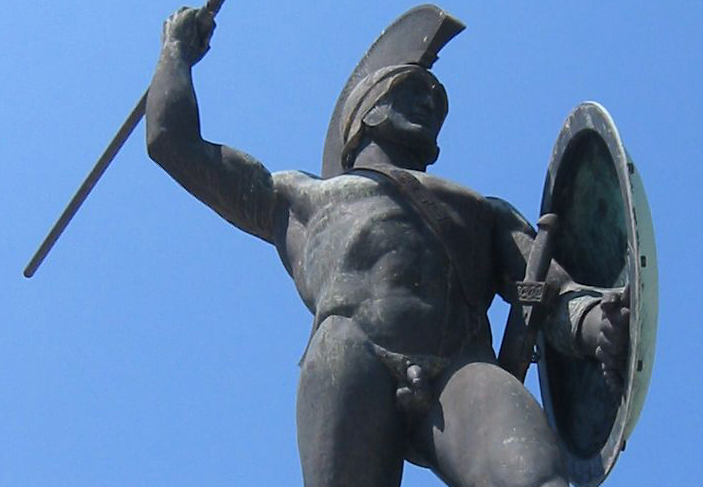



MANHOOD: A LEXICON
FIGHT IS THE FATHER OF ALL
The Ubiquity of Fighting Manhood
Fighting Manhood is the Father and Author of All
Fighting Manhood and Manly Love
Fighting Manhood and Manly Justice
Fighting Manhood and the Idea of Good





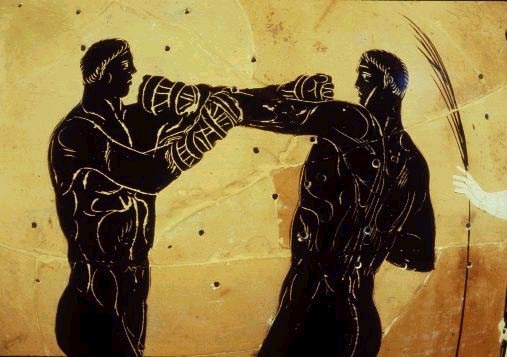

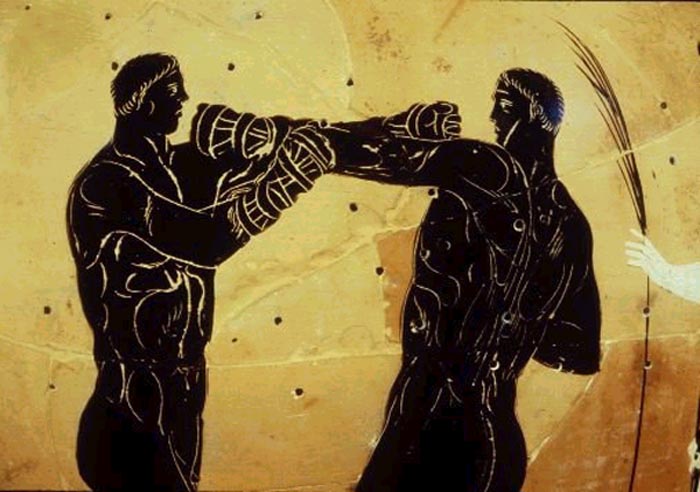


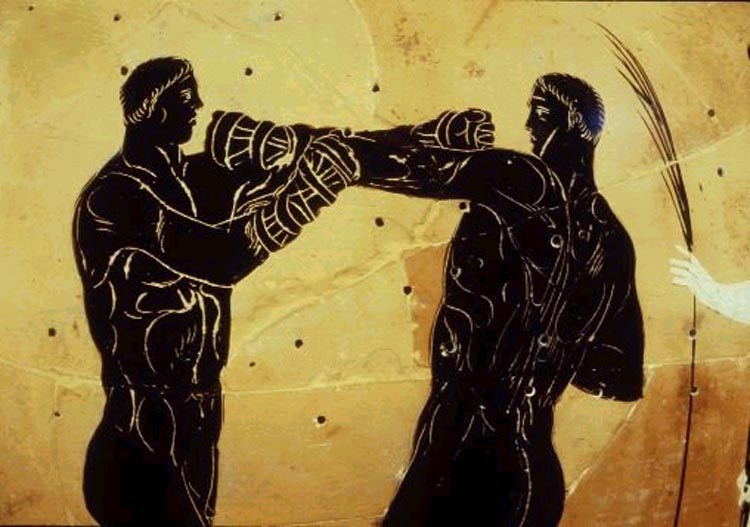

MANHOOD: A LEXICON
FIGHT IS THE FATHER OF ALL
Manly Moral Order : Fighting Manhood and Manly Justice

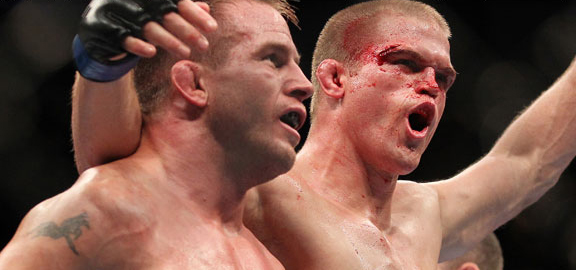
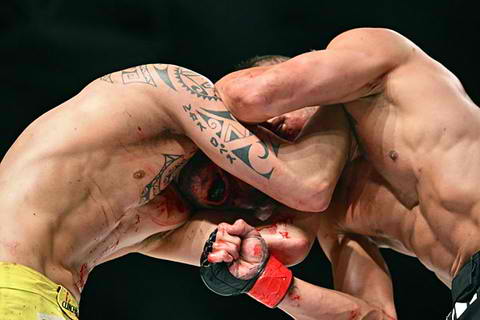
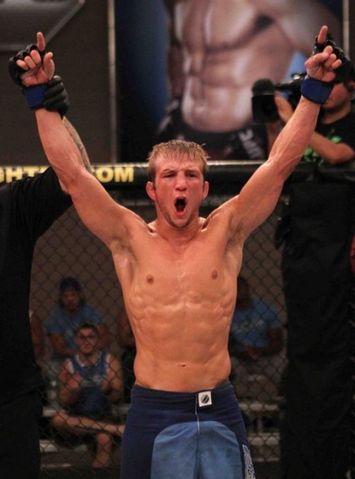
the social, political, and ethical ideals of the Republic and Laws as a whole [constitute] a Dorian [Spartan] and Pythagorean ideal of order, harmony, discipline, and restraint opposed to the laxity of the Athenian democracy



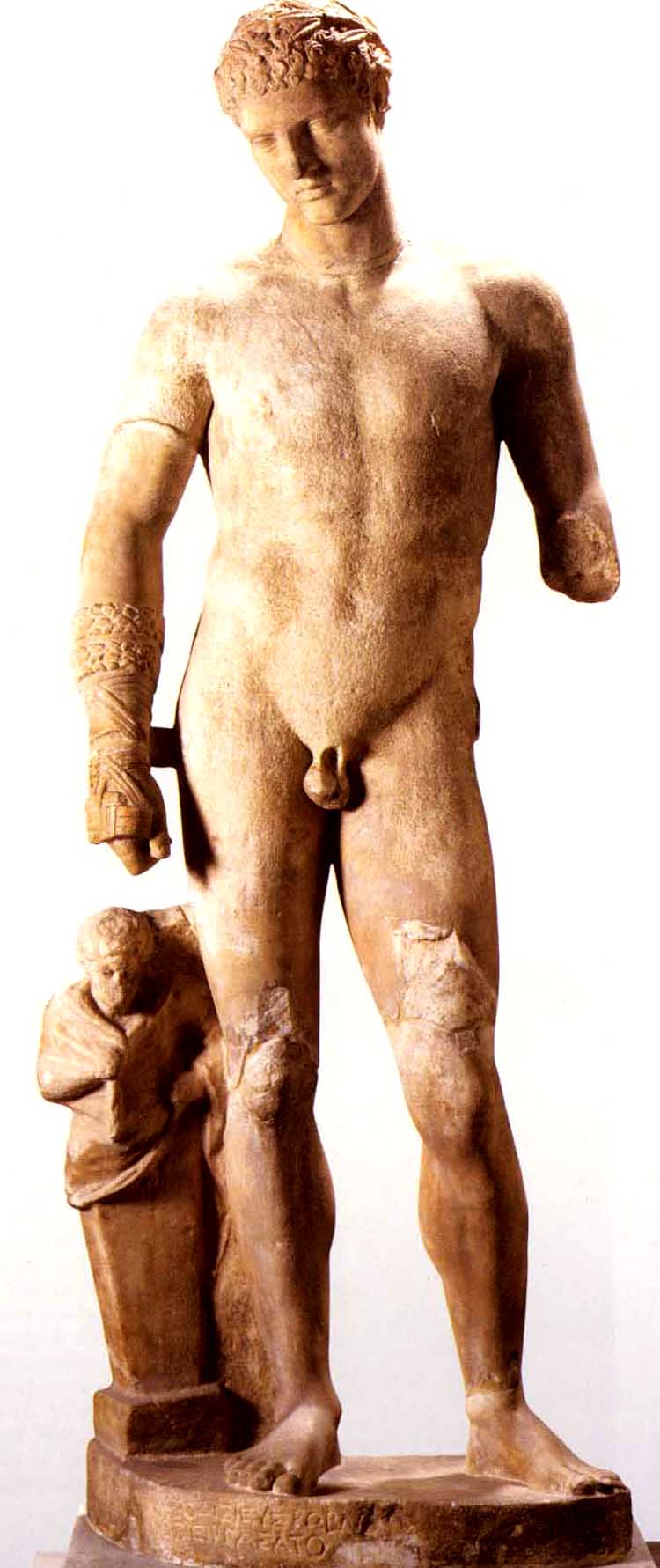

They learned to read and write for purely practical reasons; but all other forms of education they banned from the country, books and treatises being included in this quite as much as men. All their education [paideia] was directed toward prompt obedience to authority, stout endurance [karteria] of hardship [ponos], and victory or death in battle [mache].


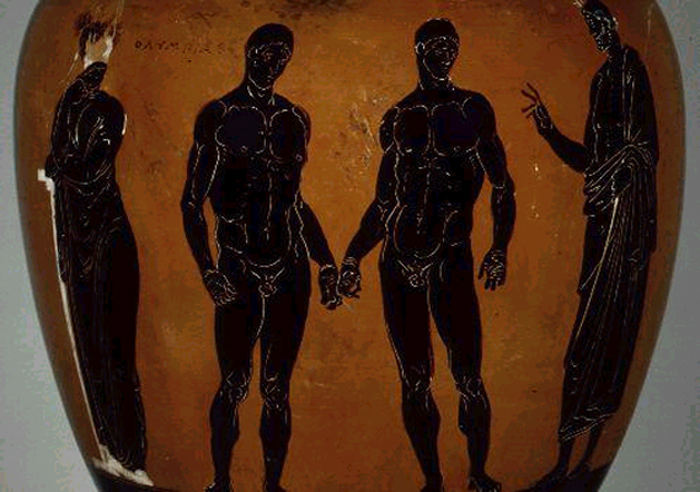


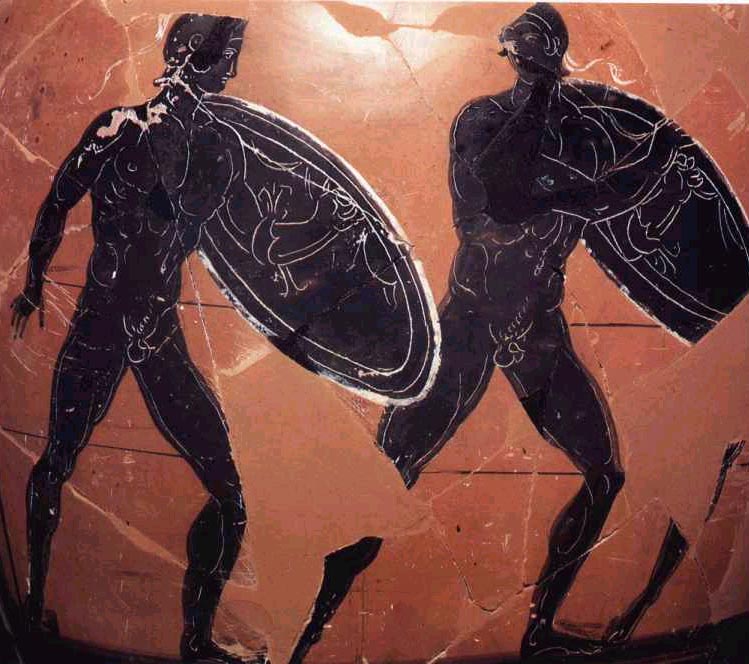






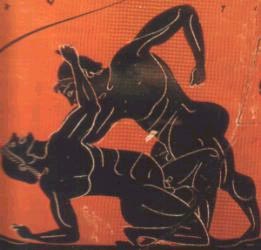
MANHOOD: A LEXICON
FIGHT IS THE FATHER OF ALL
In Union with Valour : Fighting Manhood and the Idea of Good
Your training, Stranger, has certainly, as it seems to me, given you an excellent understanding of the legal practices of Crete. But tell me this more clearly still: by the definition you have given of the well-constituted State you appear to me to imply that it ought to be organized in such a way as to be victorious in war over all other States. Is that so?
Certainly it is; and I think that our friend here shares my opinion.
No Lacedaemonian, my good sir, could possibly say otherwise.
If this, then, is the right attitude for a State to adopt towards a State, is the right attitude for village towards village different?
By no means.
It is the same, you say?
Yes.
Well then, is the same attitude right also for one house in the village towards another, and for each man towards every other?
It is.
And must each individual man regard himself as his own enemy? Or what do we say when we come to this point?
O Stranger of Athens, for I should be loth to call you a man of Attica, since methinks you deserve rather to be named after the goddess Athena, seeing that you have made the argument more clear by taking it back again to its starting-point; whereby you will the more easily discover the justice of our recent statement that, in the mass, all men are both publicly and privately the enemies of all, and individually also each man is his own enemy.
What is your meaning, my admirable sir?
It is just in this war, my friend, that the victory over self is of all victories the first [protos] and best [aristos] while self-defeat is of all defeats at once the worst [aischros] and the most shameful [kakos]. For these phrases signify that a war against self exists within each of us.
The lawgiver ought to commune with himself and reason thus -- "Come now, what men am I to rear up, when I have made ready the whole State [polis]? Are they not to be competitors in the greatest of contests, wherein their antagonists will be numberless?" "Most certainly," one would rightly reply. What then? Suppose we had been rearing boxers [puktes] or pancratiasts [pankratiastes] or competitors in any similar branch of athletics [agonisma], should we have gone straight into the contest [agon] without previously engaging in daily combat [prosmachomai] with someone? If we were boxers, for a great many days before the contest we should have been learning how to fight, and working hard, practicing in mimicry all those methods we meant to employ on the day we should be fighting for victory, and imitating the real thing as nearly as possible: thus, we should don padded gloves instead of proper ring-gloves, so as to get the best possible practice in giving blows and dodging them; and if we chanced to be very short of training-mates [syn-gymnastes], do you suppose that we should be deterred by fear of the laughter of fools from hanging up a lifeless dummy and practicing on it? Indeed, if ever we were in a desert, and without either live or lifeless training-mates, would we not have recourse to shadow-fighting of the most literal kind, against ourselves? Or what else should one call the practice of pugilistic posturing?
There is no other name for it, Stranger, than the one you have just given to it.
What then? Is the fighting force of our State to venture to come forward every time to fight for their lives, their children, their goods, and for the whole State, after a less thorough preparation than the competitors we have been describing? And so is their lawgiver, through fear lest these training-bouts may appear ridiculous to some, to refrain from laying down laws whereby he will ordain field-operations, of which the minor kind, without heavy arms, will take place daily, if possible, -- and to this end both the choristry [military dancing] and all the gymnastic [nude physical training] shall be directed -- while the others, as a major kind of gymnastics in full armor, he shall order to be held at least once a month? In this latter kind they will engage in contests with one another throughout the whole country, contending in the capturing of forts and in ambuscades and in all forms of mimic warfare; in fact, they shall do literal fighting with balls and darts as nearly real as possible -- though the points of the darts shall be made less dangerous -- in order that their games of combat may not be devoid of some element of alarm, but may provide terrors and indicate to some extent who is stout-hearted [euphuchos] and who not: to the former the lawgiver shall duly assign honors [timé -- Worth], to the latter degradation [a-timé], that thus he may prepare the whole State to be serviceable throughout life in the real contest. Moreover, if a man gets killed in these sham fights, inasmuch as the murder is involuntary, he shall pronounce the slayer to be pure of hands, when he has been legally purified; for he will reflect that, when a few men die, others equally good will grow up in their place, whereas, once fear is, so to speak, dead, he will be unable to find a test to distinguish, in all such cases, the good from the bad -- and that is a far greater evil than the other for a State.
We, at least, Stranger, would certainly agree that every State should both ordain and practice these things.
Are we all aware of the reason why such military dancing and such contests [agonia] do not at present exist anywhere in the States, except to a very small extent? Shall we say that this is due to the ignorance of the populace and of those who legislate for them?
Possibly.
Not so, by any means, my ingenious Clinias! What we ought to say is that there are two causes, and both most weighty ones.
What are they?
The first springs from a lust for wealth which allows a man no leisure time for attention to anything else save his own private property; and when the soul of every citizen hangs upon this, it is incapable of attending to matters other than daily gain. Whatsoever science or pursuit leads to this, every man individually is most ready to learn and to practice; but all else he laughs to scorn. This we must assert to be one particular cause why a State is unwilling to be in earnest about this, or any other, fine [to agathon] and noble [kalos] pursuit; and why, on the other hand, every individual, because of his greed for silver and gold, is willing to toil at every art and device, noble or ignoble, if he is likely to get rich by it -- willing, too, to perform actions both holy and unholy -- nay, utterly shameful -- without a scruple, provided only that he is able to sate himself to repletion, like a beast, with all manner of foods and drinks and wenchings.
True.
Then let this which I describe be laid down as one cause which hinders the States from adequately practicing either military operations or any other noble pursuits [kalon -- ta kala] and which turns men who are of a quiet nature into traders, ship-owners, and servants, while of the bold [andreios -- Manly] it makes pirates, burglars, temple-robbers, mercenaries, and tyrants.
Manhood is despised.
In the first place, none [of the Guardians, the Warrior Caste of the Republic,] must possess any private property save the indispensable. Secondly, none must have any habitation or treasure-house which is not open for all to enter at will. Their food, in such quantities as are needful for athletes of war sober [sophron] and brave [andreios -- Manly], they must receive as an agreed stipend from the other citizens as the wages of their guardianship, so measured that there shall be neither superfluity at the end of the year nor any lack. And resorting to a common mess like soldiers on campaign they will live together.
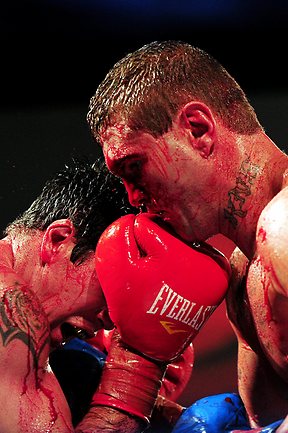

We arrived yesterday evening from the army at Potidaea [the Battle of Potidaea was fought in 432 BC, when Socrates was thirty-seven years old], and I sought with delight, after an absence of some time, my wonted conversations. Accordingly I went into the wrestling-school [palaistra] of Taureas [a trainer], opposite Basile's shrine, and there I came upon quite a number of people, some of whom were unknown to me, but most of whom I knew. And as soon as they saw me appear thus unexpectedly, they hailed me from a distance on every side; but Chaerephon, like the mad creature that he is, jumped up from their midst and ran to me, and grasping me by the hand --
Just in from the country, Terpsion, or did you come some time ago?
Quite a while ago; and I was looking for you in the market-place and wondering that I could not find you.
Well, you see, I was not in the city.
Where then?
As I was going down to the harbor I met Theaetetus being carried to Athens from the camp at Corinth.
Alive or dead?
Just barely alive; for he is suffering severely from wounds, and, worse than that, he has been taken with the sickness that has broken out in the army.
You mean the dysentery?
Yes.
What a man he is who you say is in danger!
A noble man [kalon kai agathon -- a noble, morally beautiful, brave and good man], Terpsion, and indeed just now I heard some people praising him highly for his conduct in the battle.
That is not at all strange; it would have been much more remarkable if he had not so conducted himself. But why did he not stop here in Megara?
He was in a hurry to get home; for I begged and advised him to stop, but he would not. So I went along with him, and as I was coming back I thought of Socrates and wondered at his prophetic gift, especially in what he said about him. For I think he met him a little before his own death, when Theaetetus was a mere boy, and as a result of acquaintance and conversation with him, he greatly admired his qualities. . . .
I assure you that among all the young men I have ever met -- and I have had to do with a great many -- I never yet found one of such marvelously fine qualities. He is quick to learn, beyond almost anyone else, yet exceptionally gentle, and moreover brave [andreios -- Manly] beyond any other; I should not have supposed such a combination existed, and I do not see it elsewhere.
What a man he is who you say is in danger!
A noble man [kalon kai agathon -- a noble, morally beautiful, brave and good man], Terpsion, and indeed just now I heard some people praising him highly for his conduct in the battle.
That is not at all strange; it would have been much more remarkable if he had not so conducted himself.
"O children, that you are born of valiant [agathos] sires is clearly shown by the facts now before you: we, who might have ignobly lived choose rather to die nobly, before we bring you and those after you to disgrace, and before we bring shame upon our own fathers and all our earlier forebears, since we deem that life is unworthy [un-timé] to be lived for the man who brings shame upon his own, and that such an one has no friend amongst gods or man, either here on earth, or under the earth when he is dead.
To our sons this message:
To our sons this message:
From the same root [ARES] comes areté ... the first notion of goodness being that of manhood, bravery in war; cf. Lat. virtus.
goodness, excellence, of any kind, esp. of manly qualities, manhood, valour, prowess.
O children, that you are born of valiant [agathos] sires . . .
Manhood, manliness, strength, vigor, bravery, courage, excellence; Valour, gallantry, fortitude; Goodness, moral perfection, high character, virtue; Worth, merit, value, strength
O children, that you are born of valiant [agathos] sires is clearly shown by the facts now before you: we, who might have ignobly lived choose rather to die nobly. . .
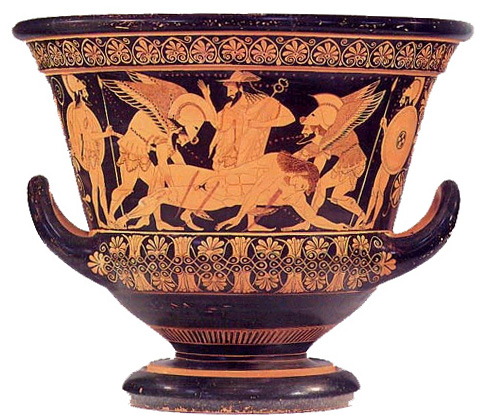
The God Hermes directs Death and Sleep
to carry the body of Sarpedon,
a Warrior who died nobly at Troy,
to his native land for funeral rites.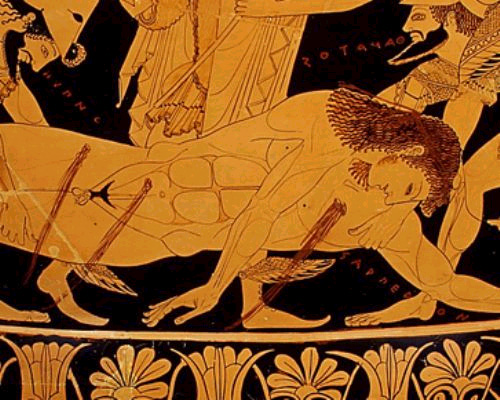

Notice the two Warriors flanking the scene.
This is a "krater" -- a vessel for mixing wine and water
which would have been the centerpiece at a Symposion --
an all-male and Manly celebration -- a banquet and drinking party.
whatsoever else you practice -- whatever else you do -- you must do it in union with valor, [areté -- Fighting Manhood], being well assured that when divorced from this all possessions and pursuits are base and ignoble.
neither does wealth bring honor to its possessor if combined with cowardice [an-andria -- want of manhood, UN-manliness] -- for such an one is rich for another rather than for himself -- nor do beauty and strength appear comely, but rather uncomely, when they are attached to one that is cowardly and base
every form of knowledge when sundered from justice [dikaios] and the rest of virtue [areté -- Fighting Manhood] is seen to be plain roguery rather than wisdom.
whatsoever else you practice -- whatever else you do -- you must do it in union with valor [areté -- Manhood]
every form of knowledge when sundered from justice [dikaios] and the rest of virtue [areté -- Fighting Manhood] is seen to be plain roguery rather than wisdom.
Virtue is one [that is, unitary] because each of the virtues is a form of knowledge, or because each, when taken in the highest sense, involves all the others.
every form of knowledge --
each, when taken in the highest sense, involves all the others.
whatsoever else you practice you must practice it in union with valor [areté -- Manhood], being well assured that when divorced from this all possessions and pursuits are base and ignoble.

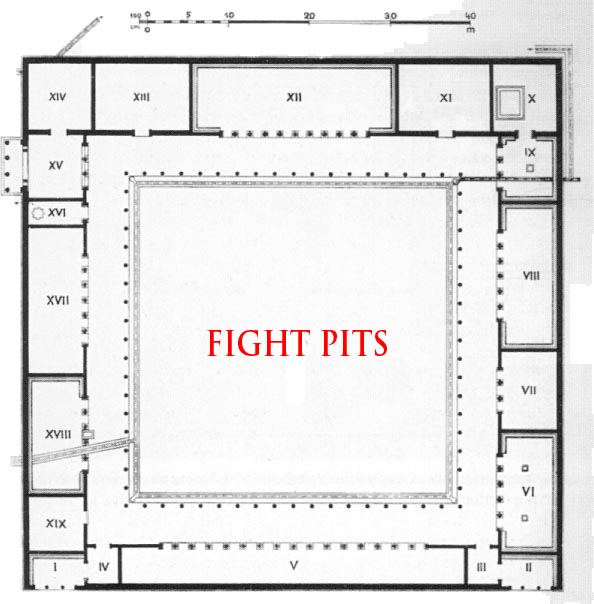
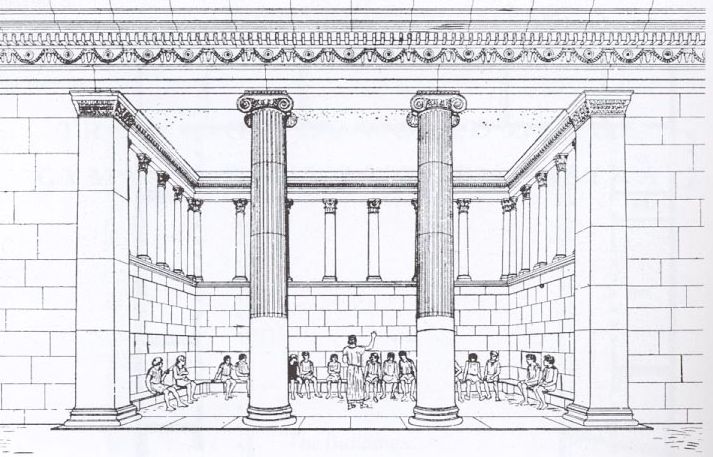
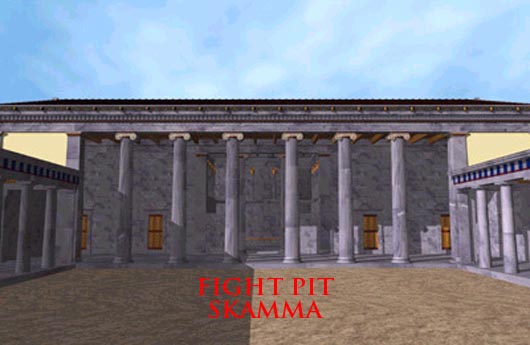
[T]he Sensible [sophron = sensible, temperate, having control over the sensual desires, self-controlled σωφρων sophrosyne] Man will do what is fitting as regards both Gods and Men; for he could not be sensible if he did what was unfitting. That must needs be so. And again, when he does what is fitting as regards Men, his actions will be Just [dikaios], and as regards the Gods, Pious [hosios]; and he who does what is Just and Pious must needs be a Just and Pious Man. That is so. And surely he must be Brave [andreios = Manly] also: for you know a sound or temperate mind is shown, not by pursuing and shunning what one ought not, but by shunning and pursuing what one ought, whether they be things or people or pleasures or pains, and by steadfastly persevering in one's duty; so that it follows of strict necessity, Callicles, that the Temperate [sophron] Man, as shown in our exposition, being Just [dikaios] and Brave [andreios = Manly] and Pious [hosios], is the perfection of a Good Man; and that the Good Man does well and fairly whatever he does and that he who does well is blessed and happy, while the wicked man or evil-doer is wretched.
so that the Self-Controlled Man, being Just and Manly and Pious, is the Perfection of a Good Man
so that the Manly Man, the Man in full possession of his Fighting Manhood, being Just and Self-Controlled and Pious, is the Perfection of a Good Man
Courage [andreios = Manliness] is, presumably, one part of virtue [areté].
Certainly.
Now that you have heard the argument, judge for yourself whether you would welcome as housemate [syn-oikos] or neighbor a man who is extremely courageous, but licentious rather than temperate [sophron = self-controlled].
Don't suggest such a thing!
Well then, a man wise in arts and crafts, but unjust [a-dikia].
Certainly not.
But justice, surely, is not bred apart from temperance [sophrosyne].
Impossible.
Nor is he whom we recently proposed as our type of wisdom, the man who has his feelings of pleasure and pain in accord with the dictates of right reason and obedient thereto.
No, indeed.

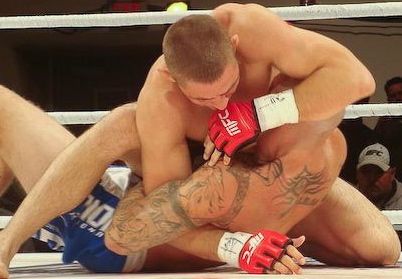


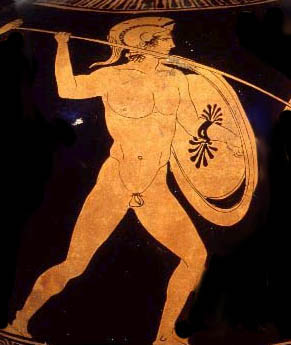
Whatever else you practice you must practice it in union with Manhood, being well assured that when divorced from this all possessions and pursuits are base and ignoble.
Whatever else you practice you must practice it in union with Manhood, being well assured that when divorced from this all possessions and pursuits are base and ignoble.
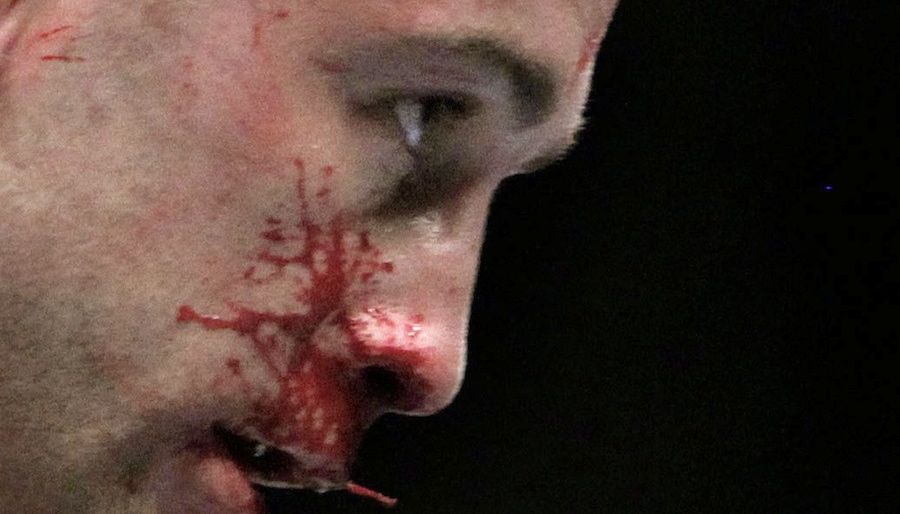





The whole soul consists of three parts, reason, spirit, and desire. The excellence [areté] of reason is wisdom [phronesis], of spirit courage [andreia -- Manliness], of desire, temperance [sophrosyne], of the whole soul justice [dikaiosyne, from dikaios].
The whole soul consists of three parts, reason, spirit, and desire. The Manhood [areté] of reason is wisdom [phronesis], of spirit courage [andreia -- Manliness], of desire, temperance [sophrosyne], of the whole soul justice [dikaiosyne, from dikaios, just, well-ordered].
Reason must make a right judgment, spirit must, in obedience to reason, despise seeming dangers, and desire must pursue not seeming pleasure but reasonable pleasure.
Manly Reason must make a Manfully right judgment, Manly spirit must, in obedience to Manly reason, despise seeming dangers, and desire must pursue not seeming pleasure but Manfully reasonable pleasure.
"Then will not law-suits and accusations against one another vanish, one may say, from among them, because they have nothing in private possession but their bodies, but all else in common? So that we can count on their being free from the dissensions that arise among men from the possession of property, children, and kin."
there could not rightly arise among them any law-suit for assault or bodily injury. For between age-fellows[1] and comrades we shall say that to defend oneself, to repel an assault is morally beautiful and just, well-ordered, and righteous, thereby compelling them to keep their bodies in condition.
[1] Cf. [compare] A.J.P. vol. xiii. p. 364, Aeschines iii. 255, Xenophon Rep. Lac. 4. 5, Laws 880 A.
For between comrades we shall say that to defend oneself, to repel an assault is morally beautiful and just


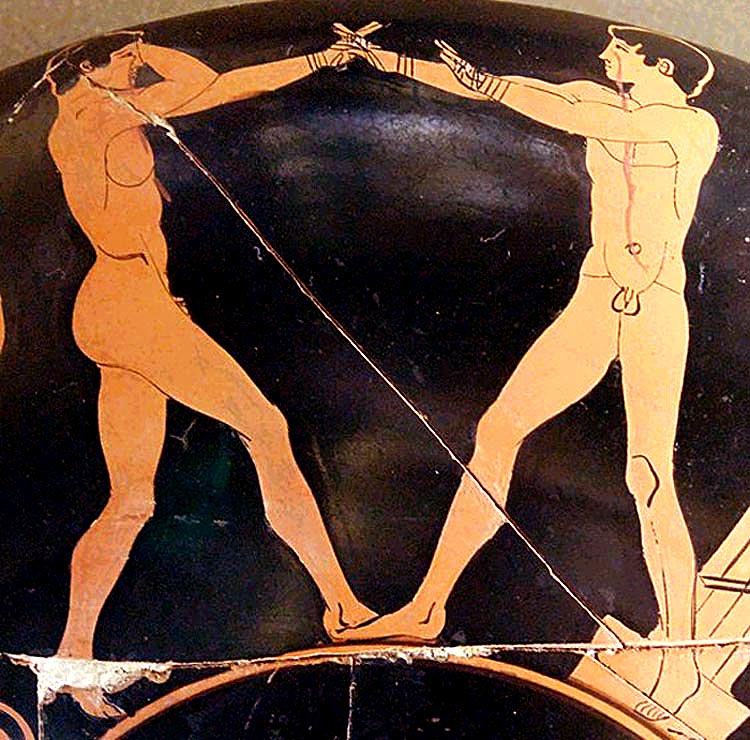
there could not rightly arise among them any law-suit for assault or bodily injury. For between age-mates and comrades we shall say that to defend oneself, to repel an assault is both morally beautiful and just, well-ordered, and righteous, thereby compelling them to keep their bodies in condition.





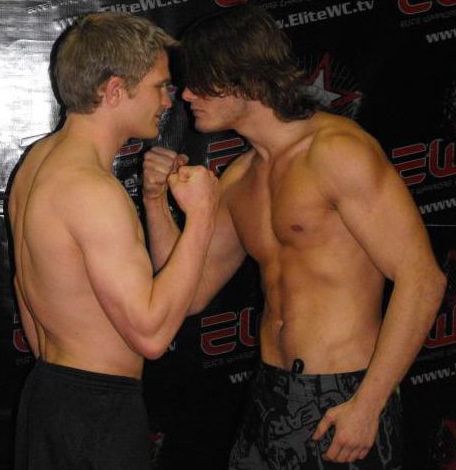

Contemporary Bare Knux Fighter after a Fight
Might one of Plato's Guardians have looked like this?
Yes!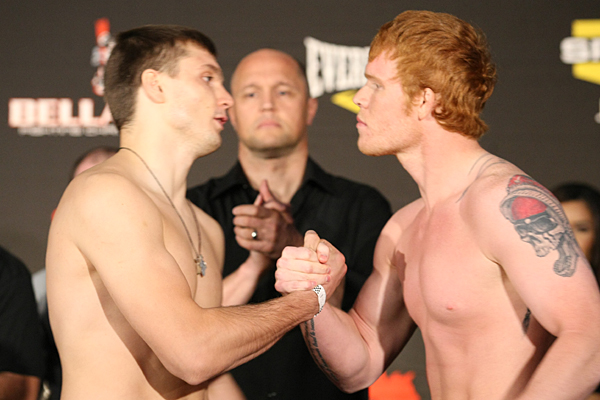
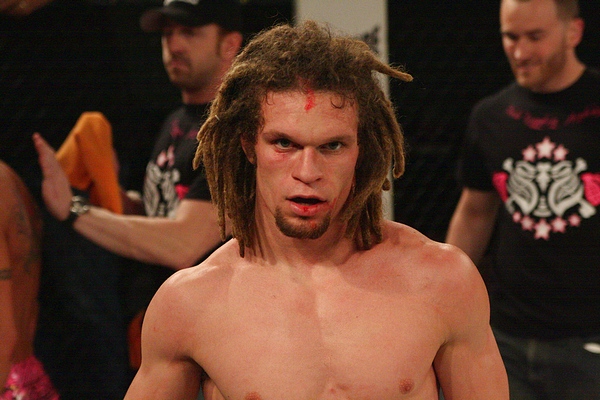
Ares Hypostatized: Manhood is God
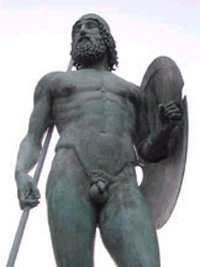
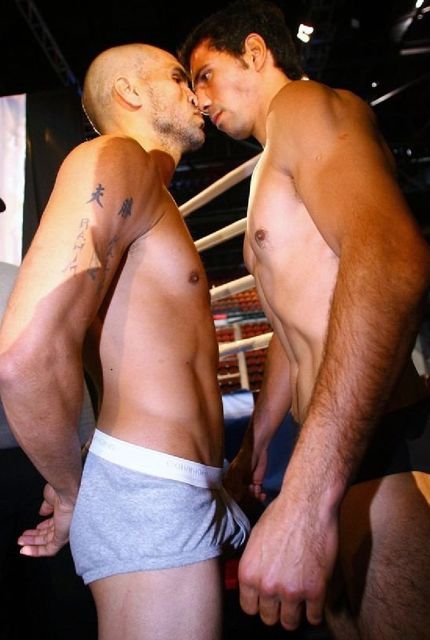
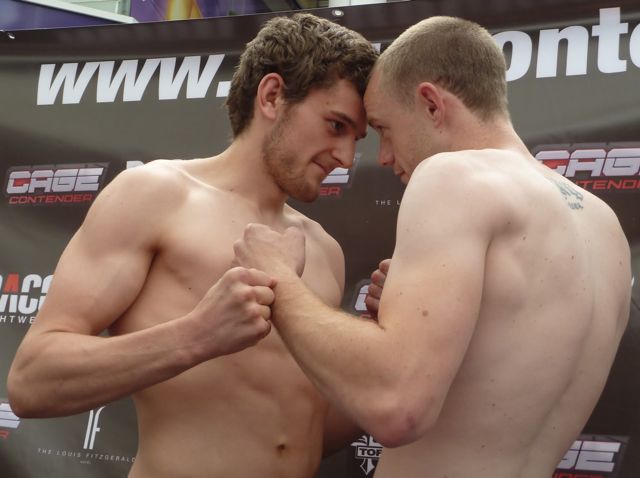
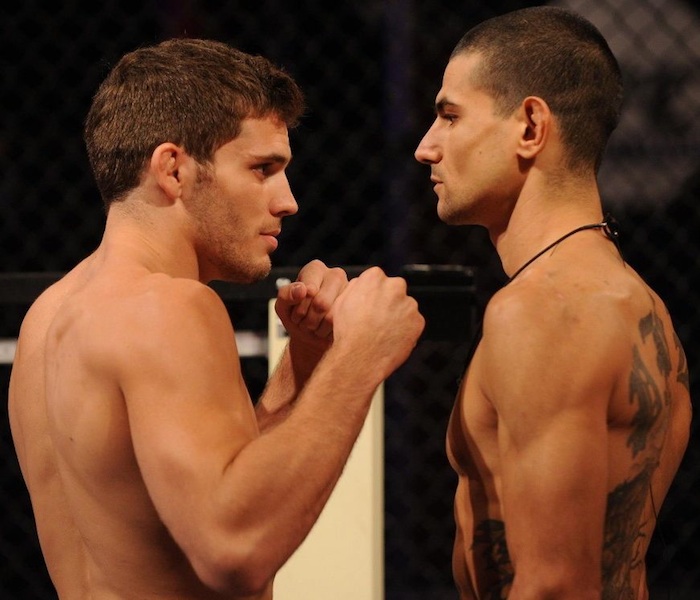
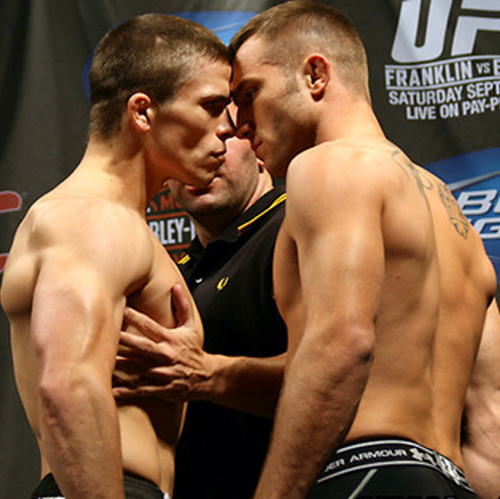
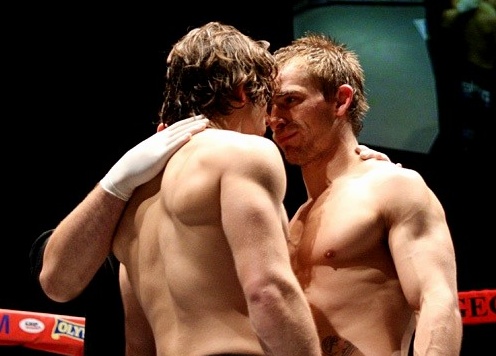
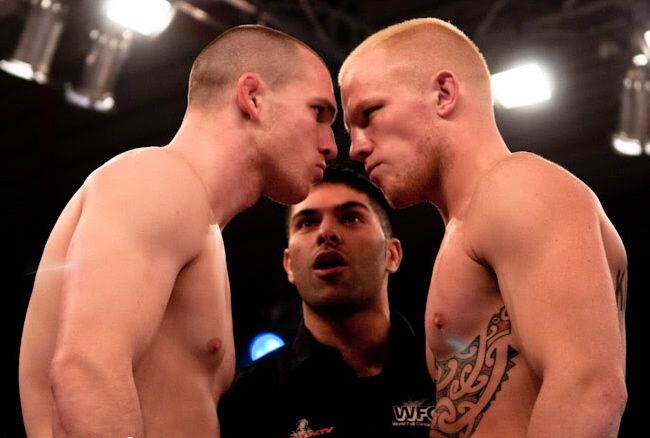
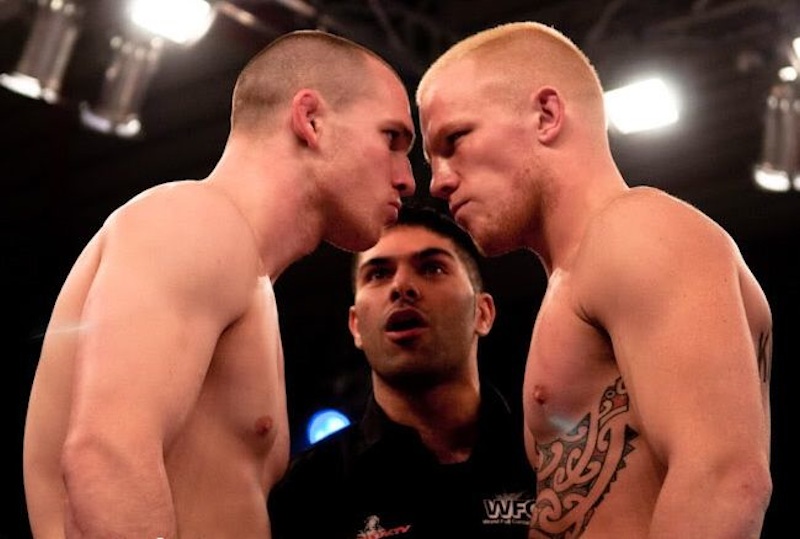
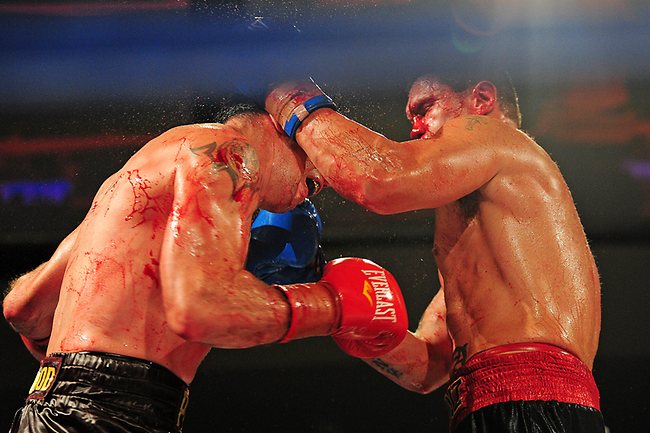
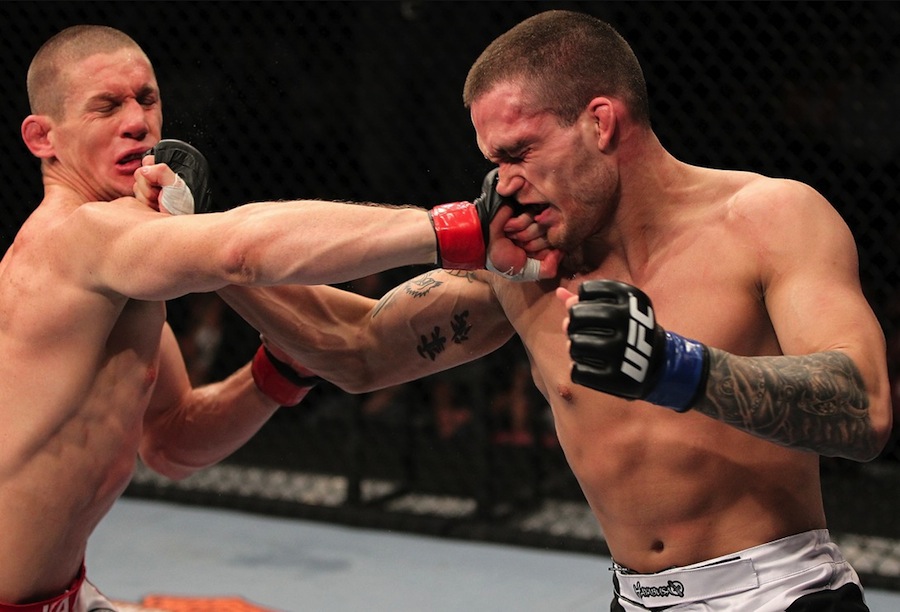
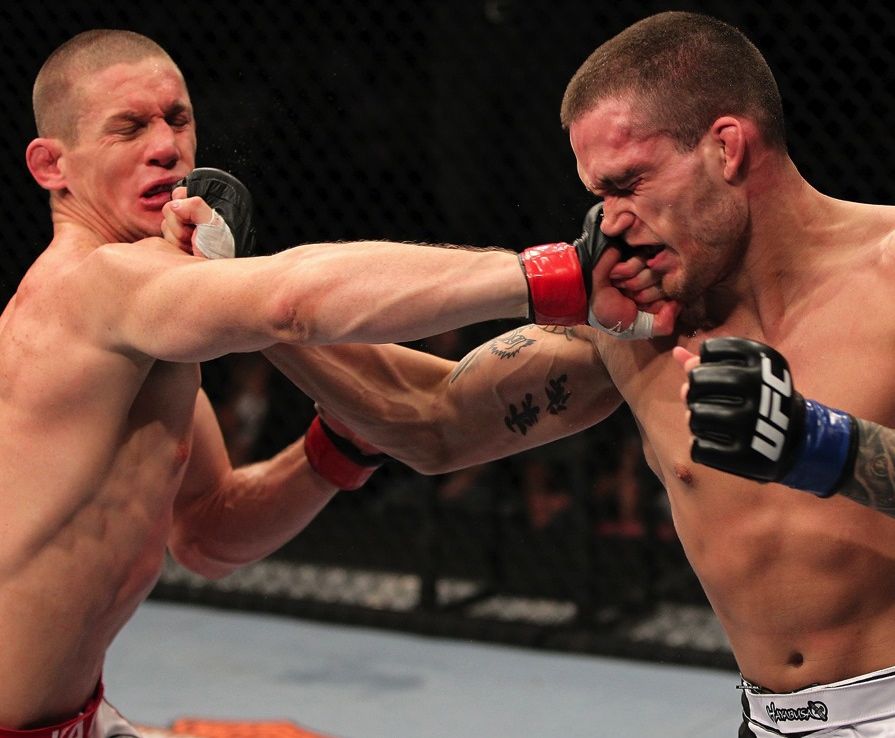
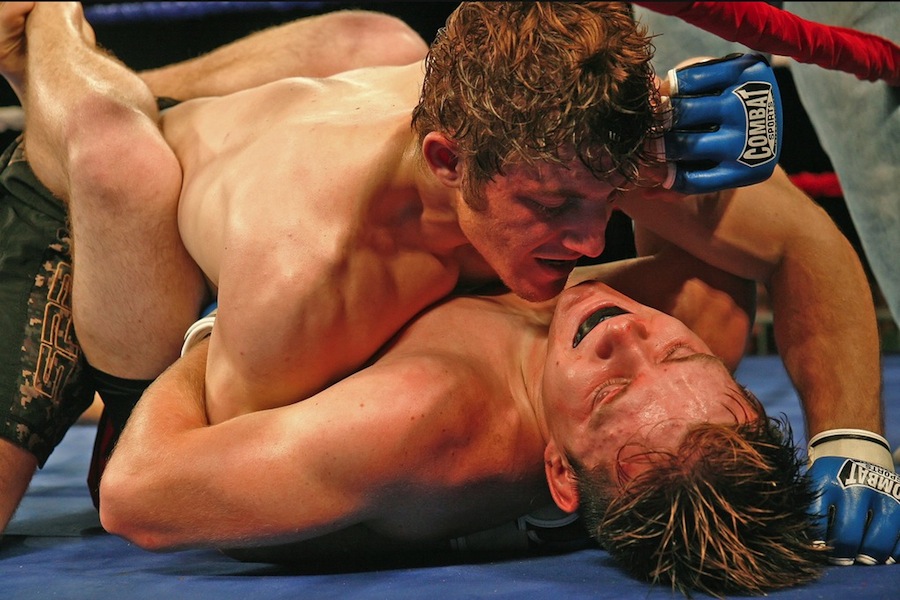
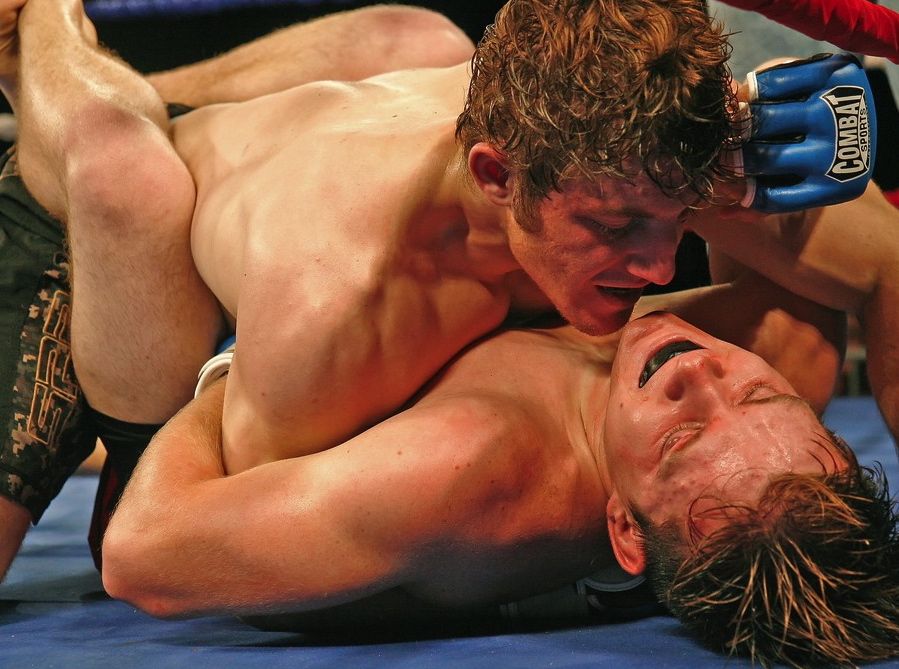

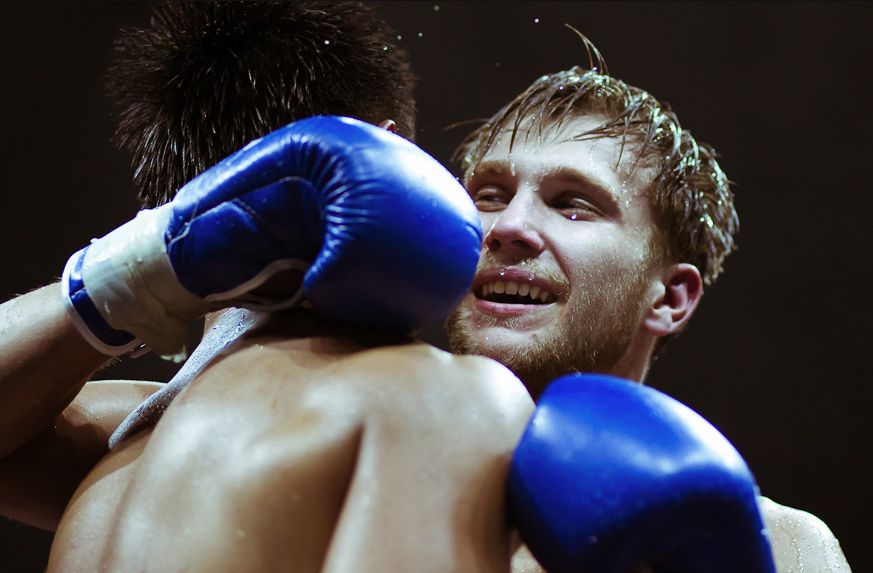
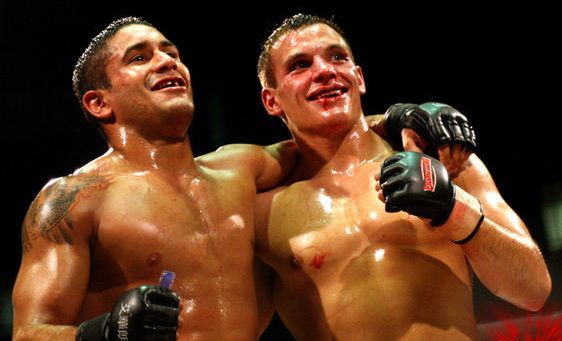

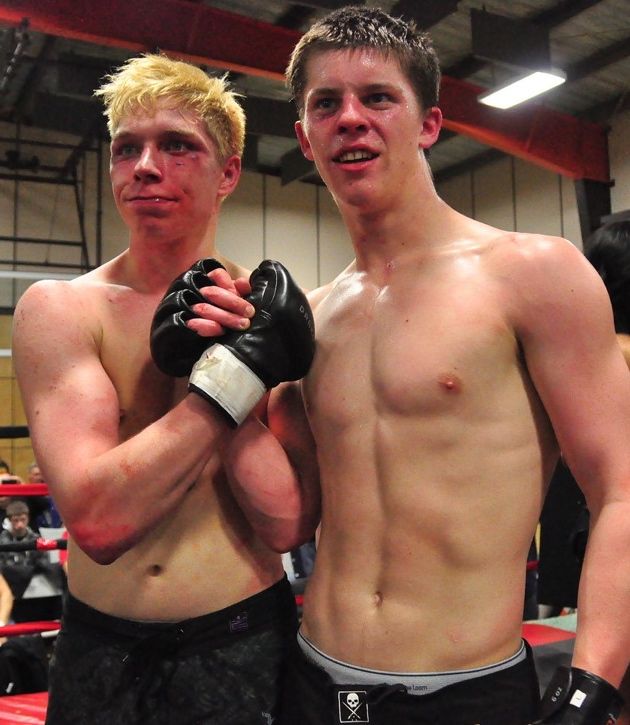
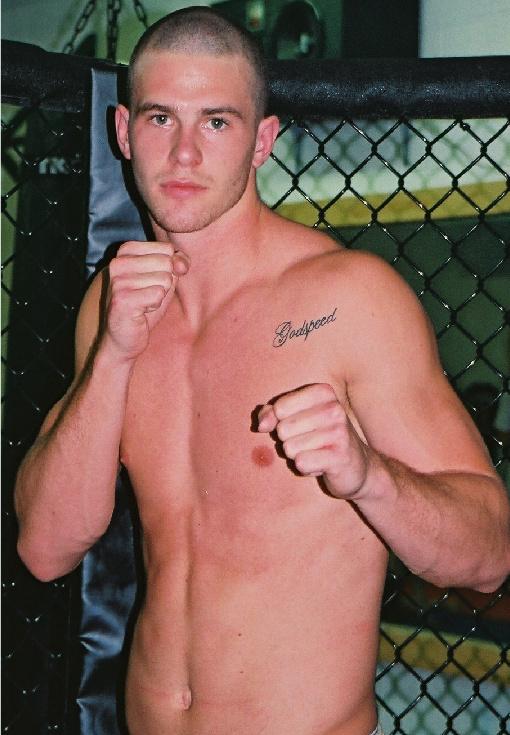

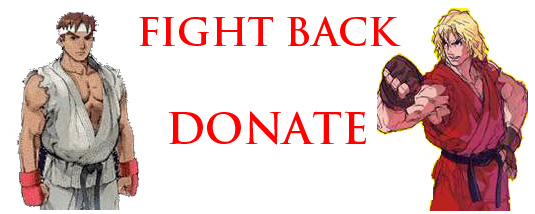
Manhood: A Lexicon
Contents.
List of Sections in Biblion Tetarton.
to 


![]()
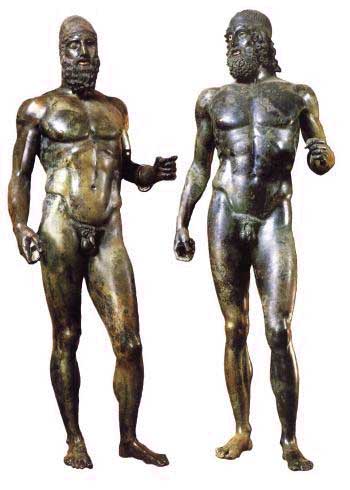
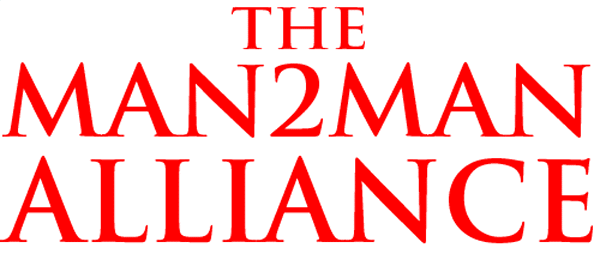






who reject anal penetration, promiscuity, and effeminacy
among men who have sex with men








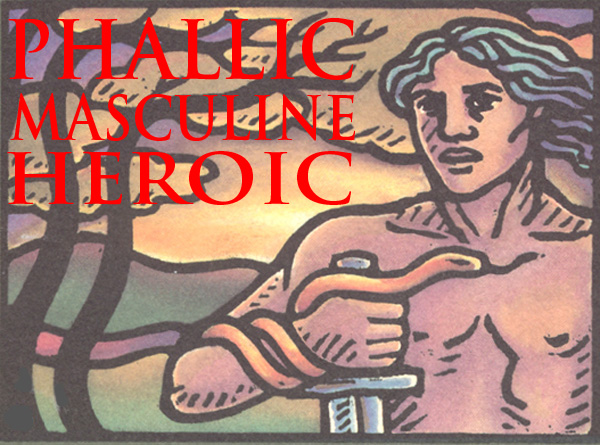


![]()

Who Celebrate, Exalt, and Worship
Fighting Manhood
In the Divine and Sacred Person of
L o r dxA r e s,
The Warrior God
God of Fight, God of Manhood, God of Fighting Manhood

| Heroes Site Guide | Toward a New Concept of M2M | What Sex Is | In Search of an Heroic Friend | Masculinity and Spirit |
| Jocks and Cocks |
Gilgamesh | The Greeks | Hoplites! | The Warrior Bond | Nude Combat | Phallic, Masculine, Heroic | Reading |
| Heroic Homosex Home | Cockrub Warriors Home | Heroes Home | Story of Bill and Brett Home | Frot Club Home |
| Definitions | FAQs | Join Us | Contact Us | Tell Your Story |

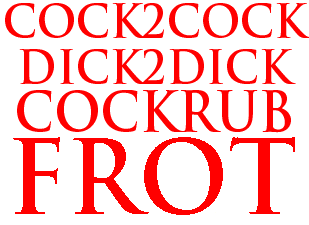

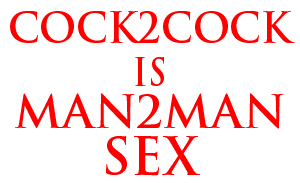
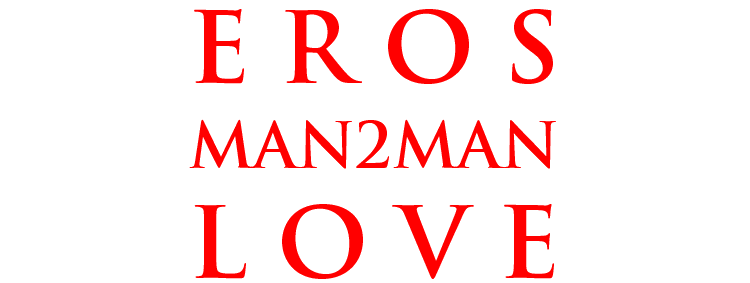
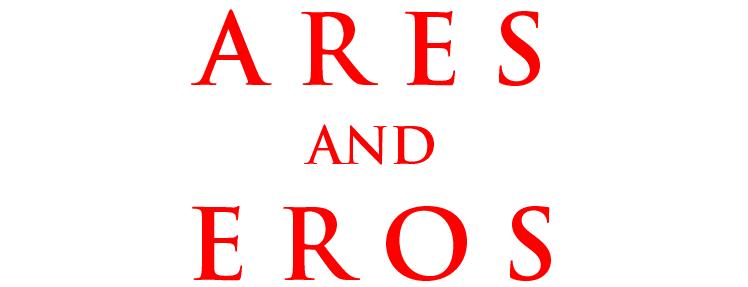
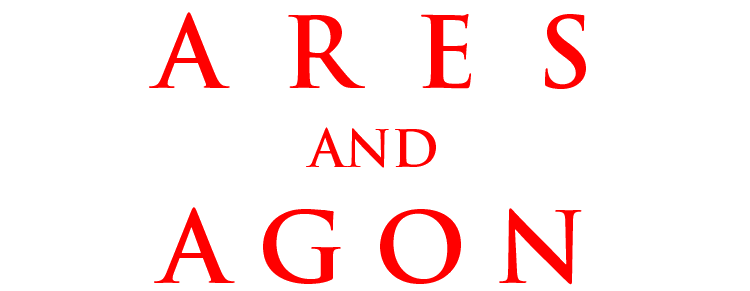
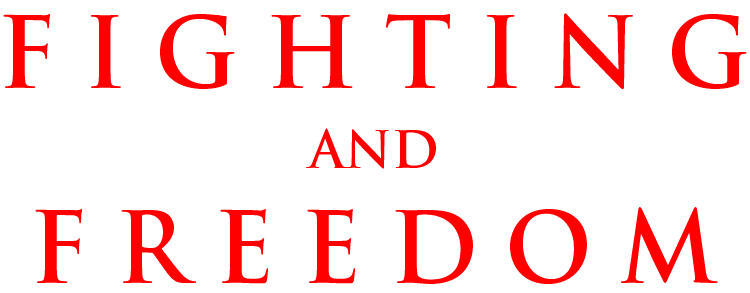
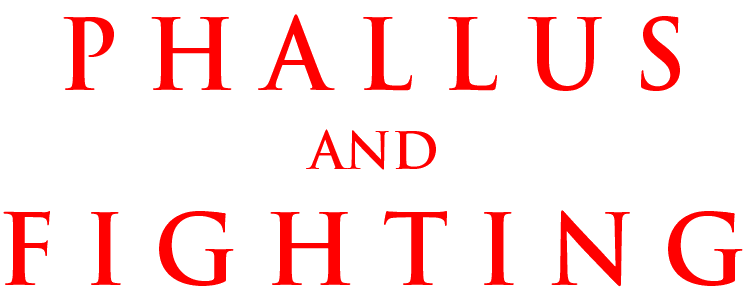
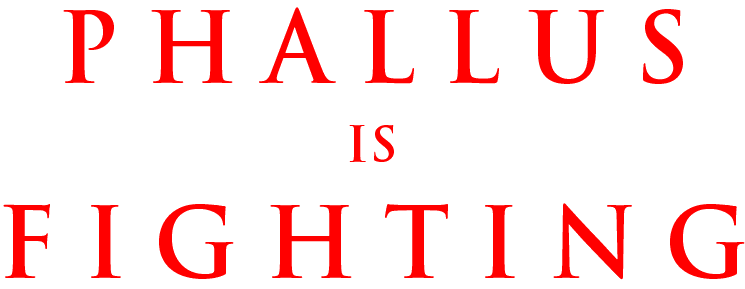
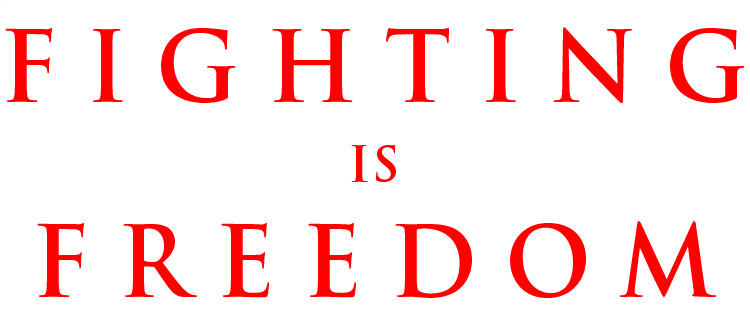
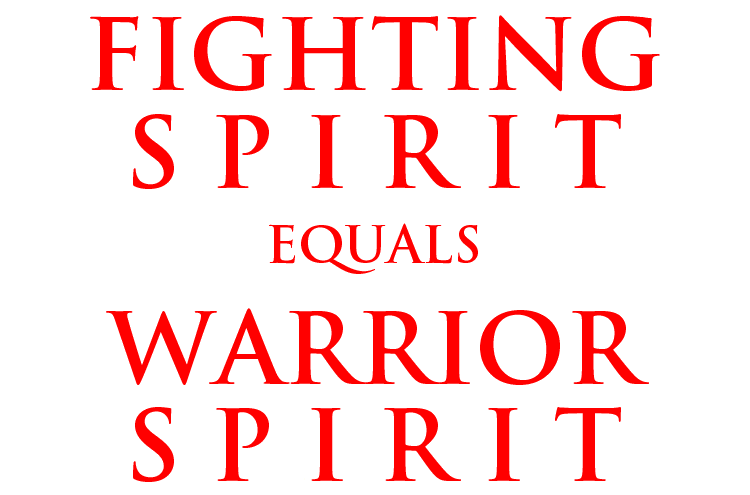

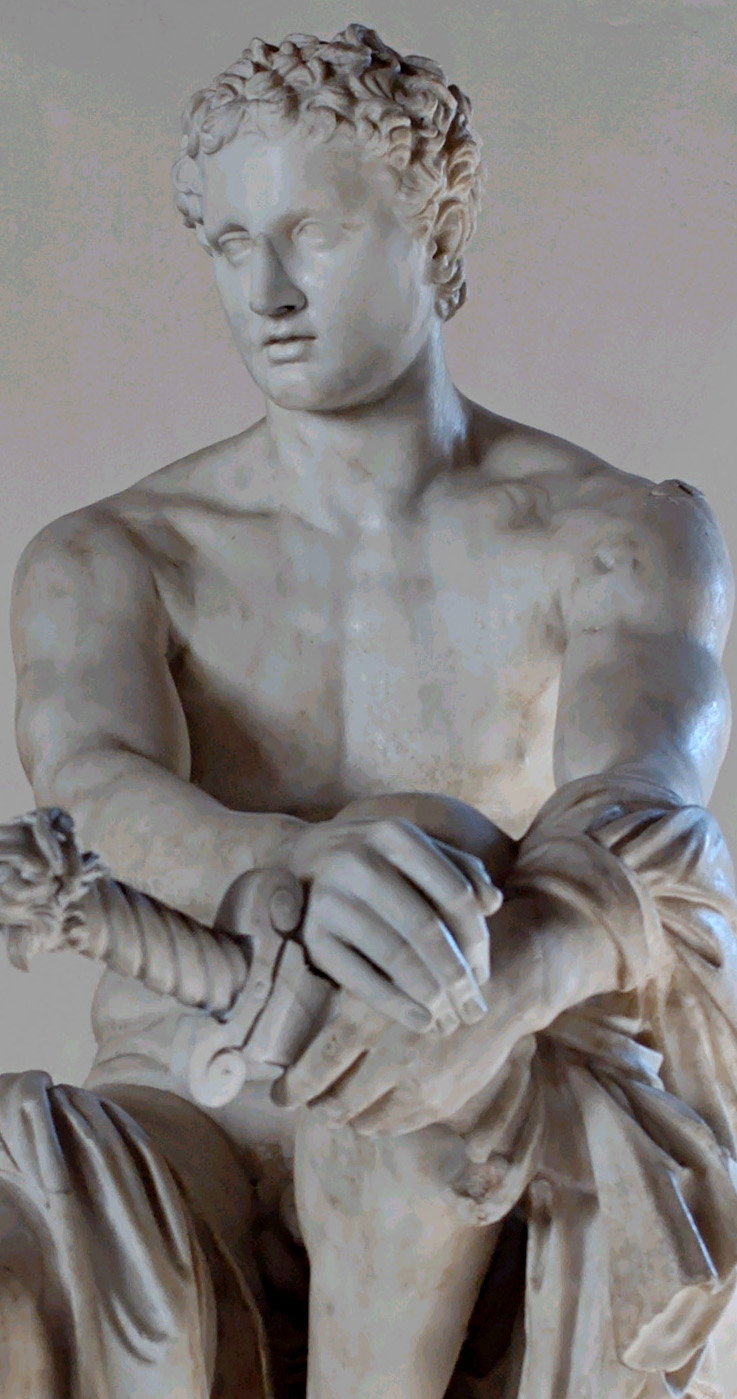

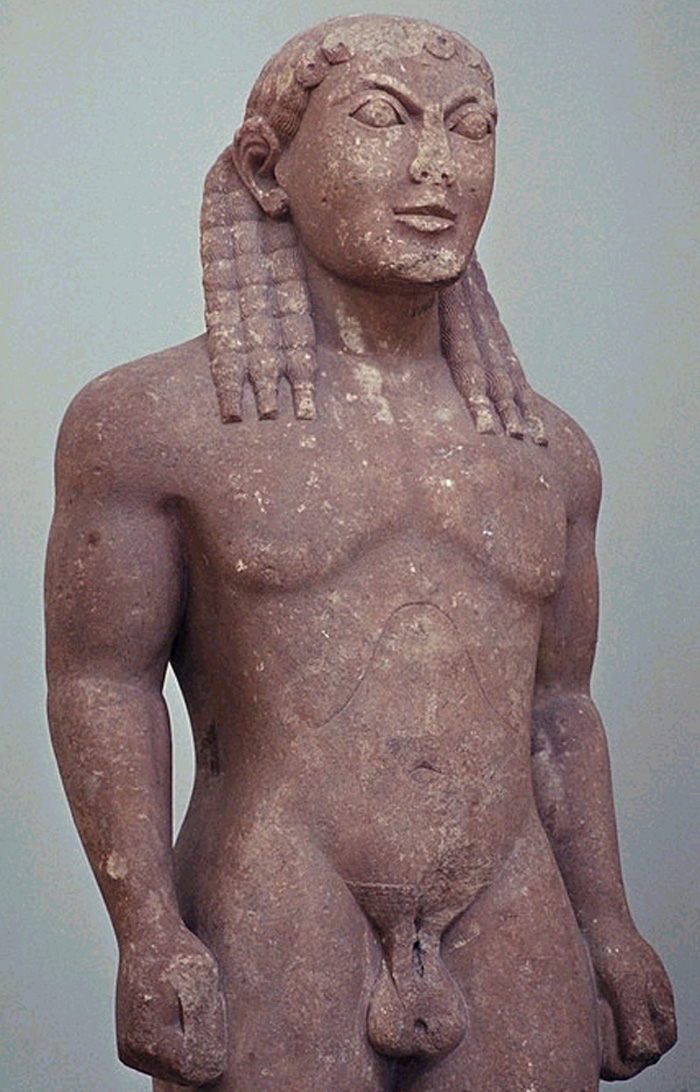

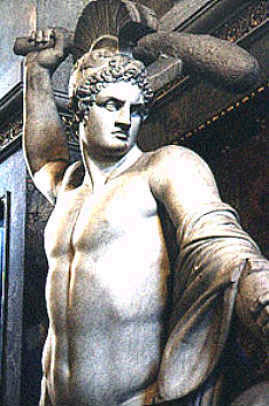
































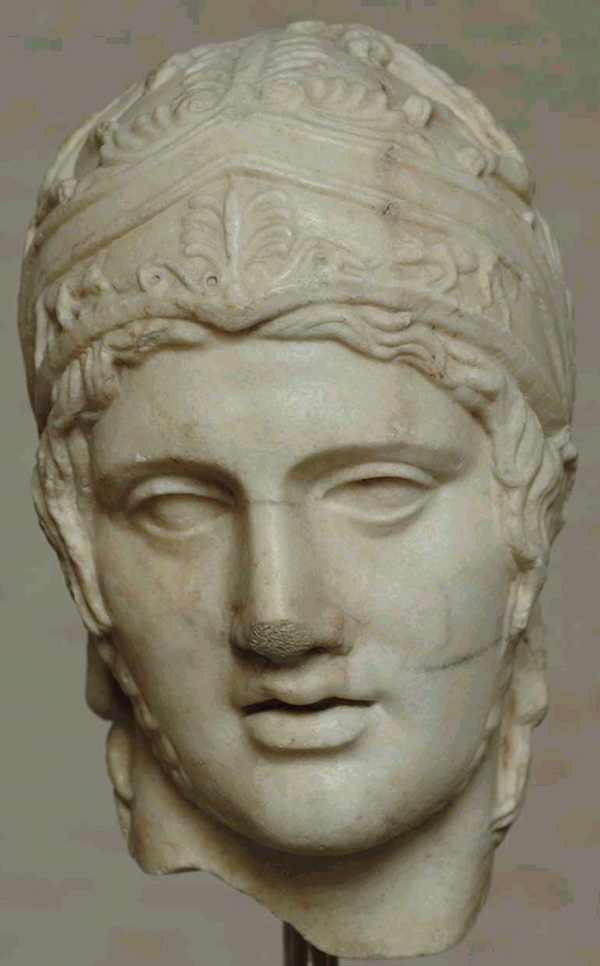














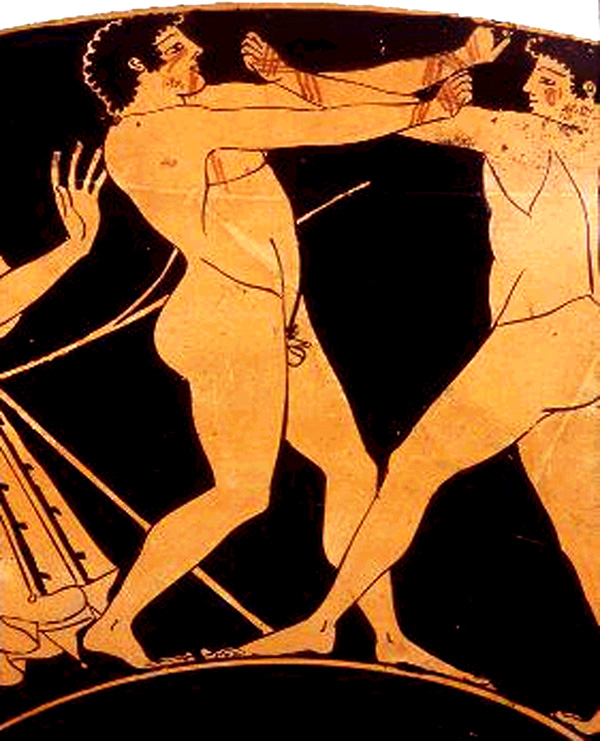


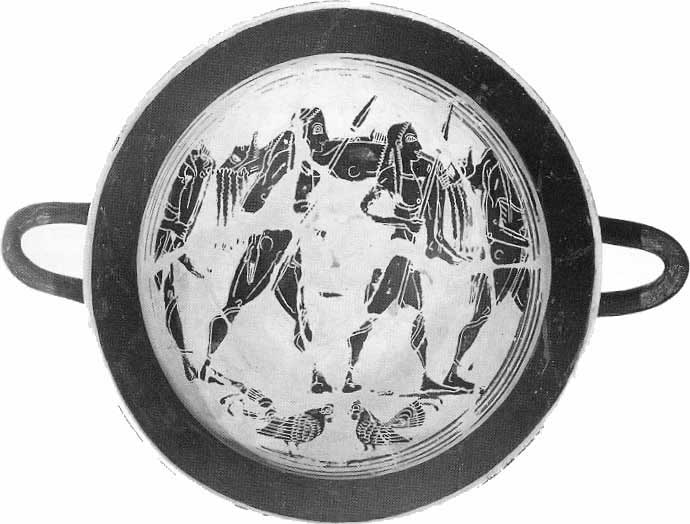














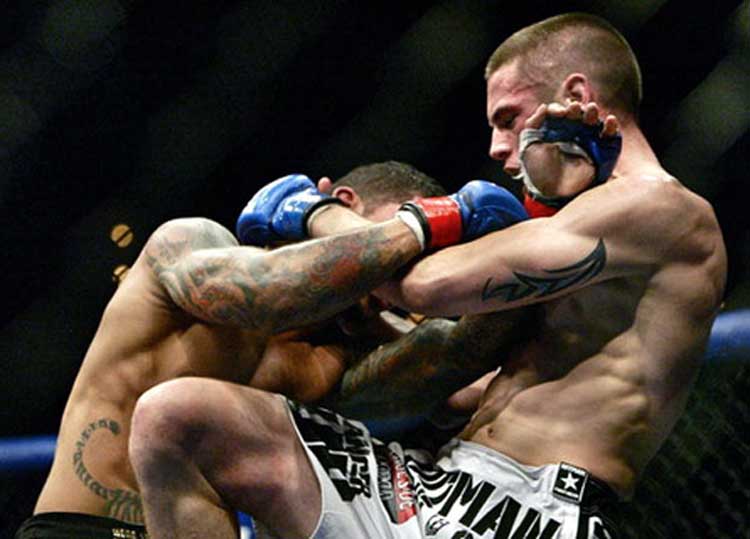














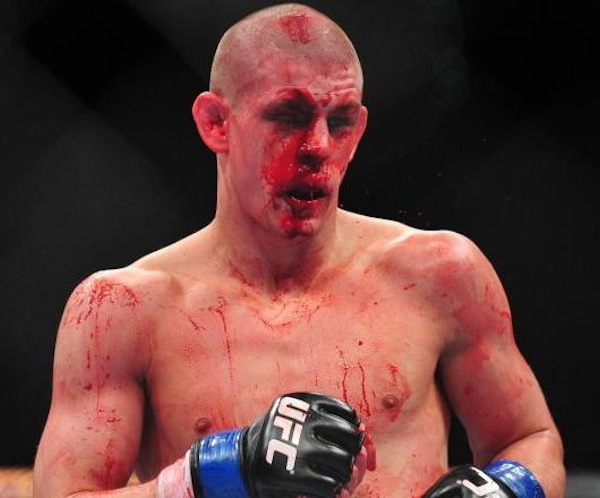

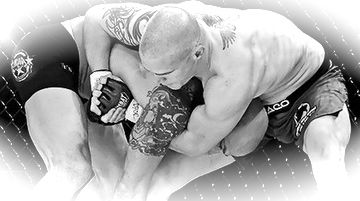
Recently I've been reading John Milton, the great English poet and defender of the Puritan and Parliamentary Revolution.
I've been reading his prose pieces -- which were written to advance that Revolutionary cause.
If you think I'm dogmatic and militant -- you should read Milton.
But his militancy helped bring about the freedoms we have today.
If an army went into battle without proper training and organisation they would lose. Historic example, in the English Civil War (1642 to 1646) the army of King Charles 1st was better organised and won most of the first battles; however Oliver Cromwell trained and organised the men fighting on Parliament's side into the New Model Army, and they won! If they had not been so organised the King would have carried on as the dictator he had been. Maybe eventually we would have got the freedoms that we enjoy now but it would have come more slowly and the monarch would have given them very grudgingly; so organisation is as you say vital to winning.









MANHOOD: A LEXICON
Word ListAncient Greek Words:
Manhood, manliness, strength, vigor, bravery, courage, excellence; Valour, gallantry, fortitude; Goodness, moral perfection, high character, virtue; Worth, merit, value.
Manhood, manliness, strength, vigor, bravery, courage, excellence; Valour, gallantry, fortitude; Goodness, moral perfection, high character, virtue; Worth, merit, value --
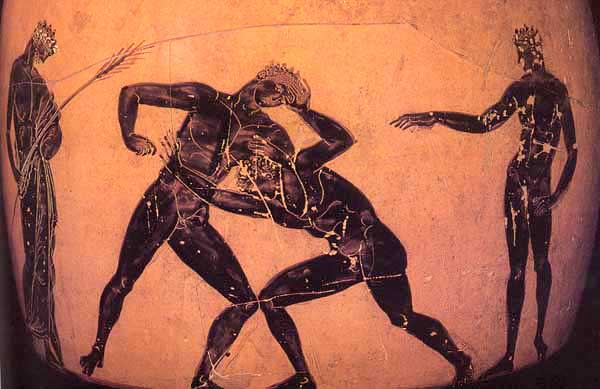
While the games were being held at Olympia, an old man was desirous of seeing them, but could find no seat. As he went to place after place, he met with insults and jeers, and nobody made room for him. But when he came opposite the Spartans, all the boys and many of the men arose and yielded their places. Whereupon the assembled multitude of Greeks expressed their approbation of the custom by applause, and commended the action beyond measure; but the old man, shaking "His head grey-haired and grey-bearded," and with tears in his eyes, said, 'Alas for the evil days ! Because all the Greeks know what is right and fair [ta kala -- The Noble Warrior Way of Manly Moral Beauty], but the Spartans alone practise it.'
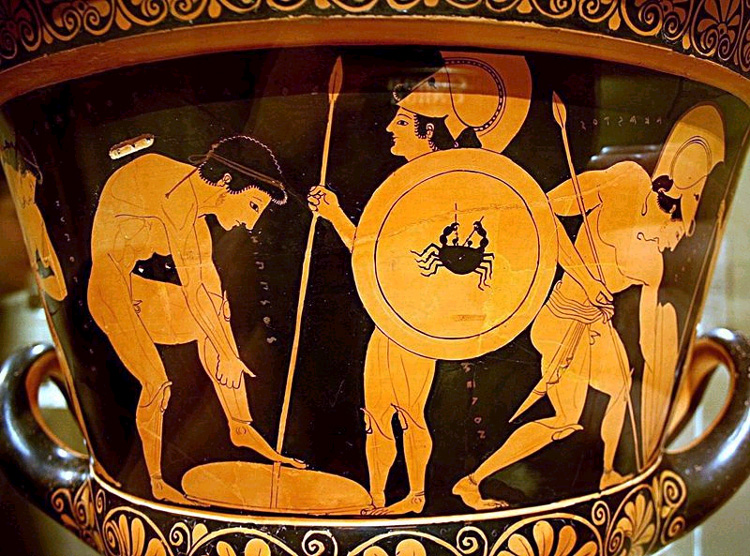
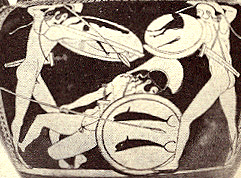
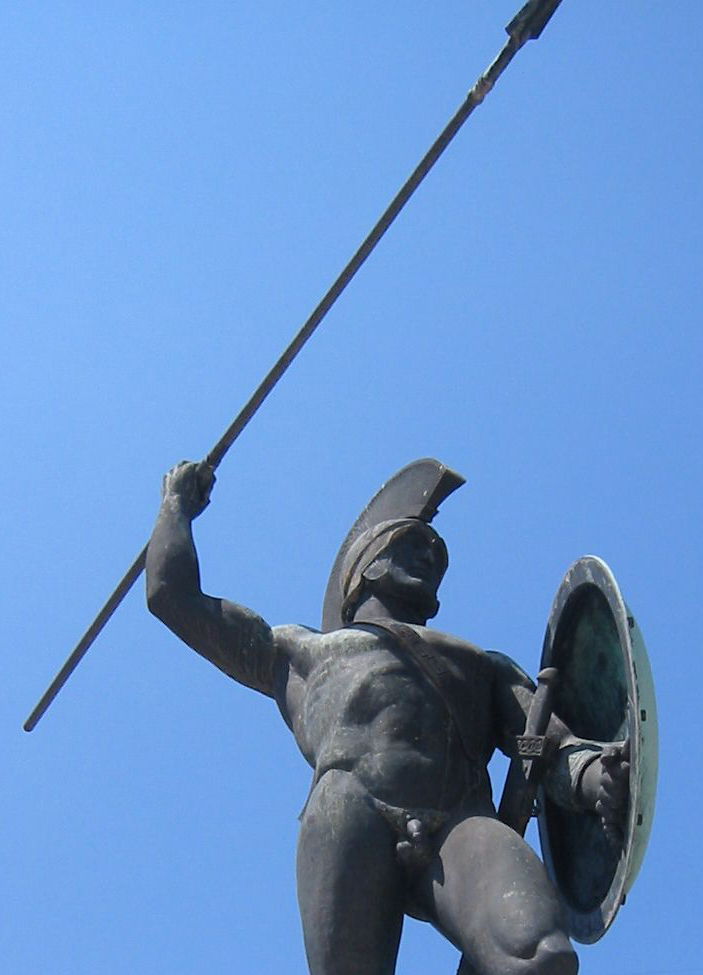



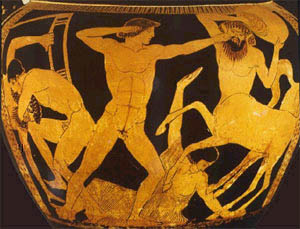
Manhood, manliness, strength, vigor, bravery, courage, excellence; Valour, gallantry, fortitude; Goodness, moral perfection, high character, virtue; Worth, merit, value.

From the same root [ARES] come areté, ari-, areion [better], aristos [best], the first notion of goodness being that of manhood, bravery in war; cf. Lat. virtus.
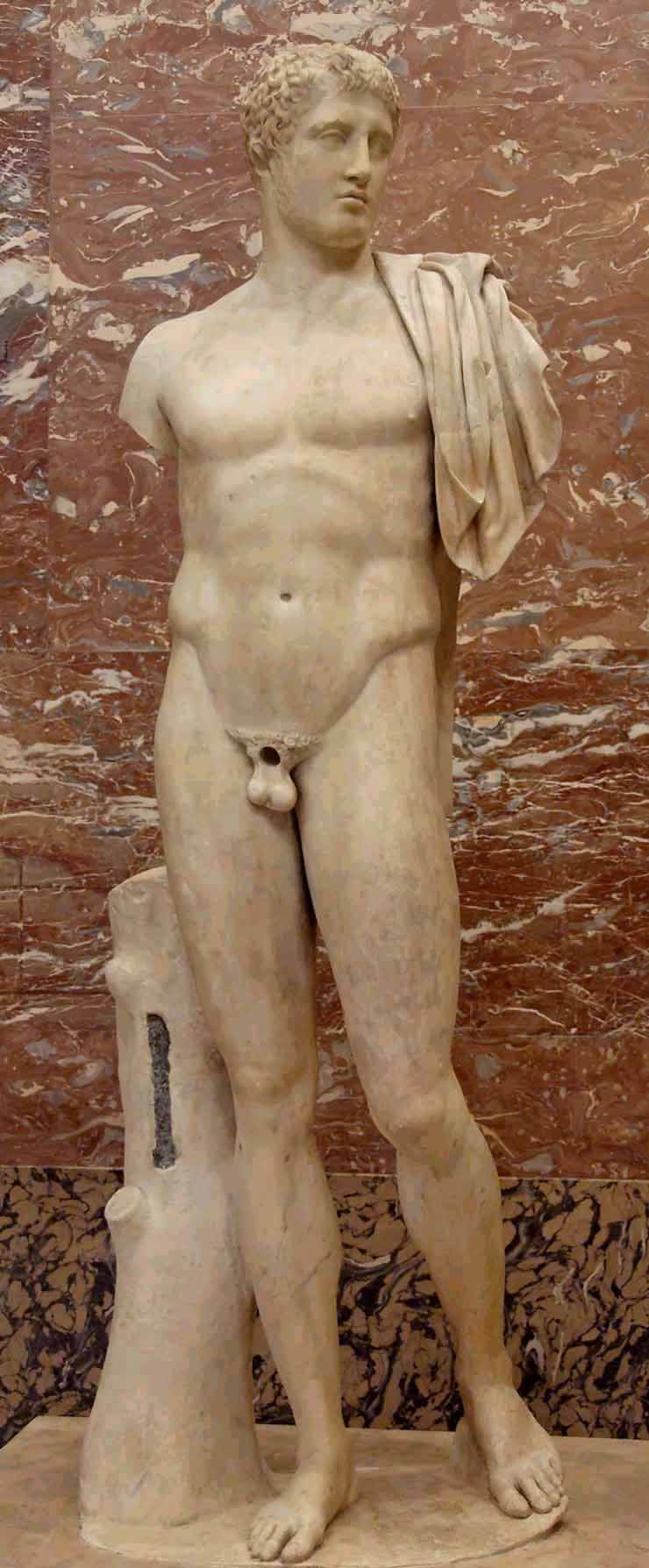
Diomedes
the short but glorious aristeia [heroism] of the Greek spirit. The basic motive of Greek areté is contained in the words 'to take possession of the beautiful'. The courage of a Homeric nobleman is superior to a mad berserk contempt of death in this -- that he subordinates his physical self to the demands of a higher aim, the beautiful. And so the man who gives up his life to win the beautiful, will find that his natural instinct for self-assertion finds its highest expression in self-sacrifice.
Ares, then, if you like, would be named for his virility [arren] and courage [andreion = courage, Manliness], or for his hard and unbending nature, which is called arratos; so Ares would be in every way a fitting name for the God of War.


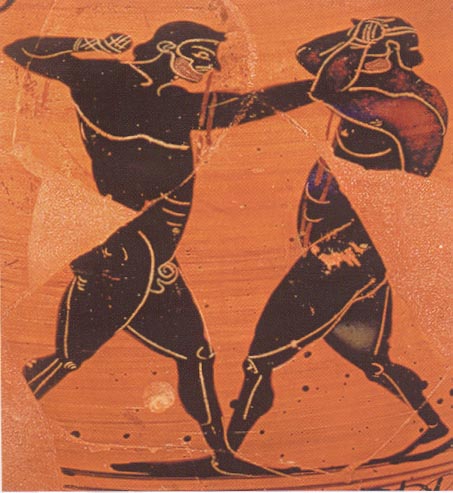
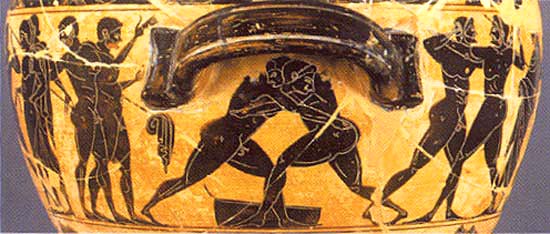
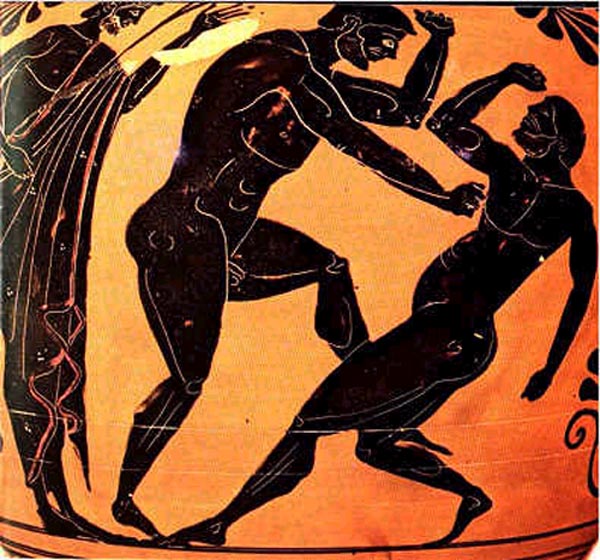
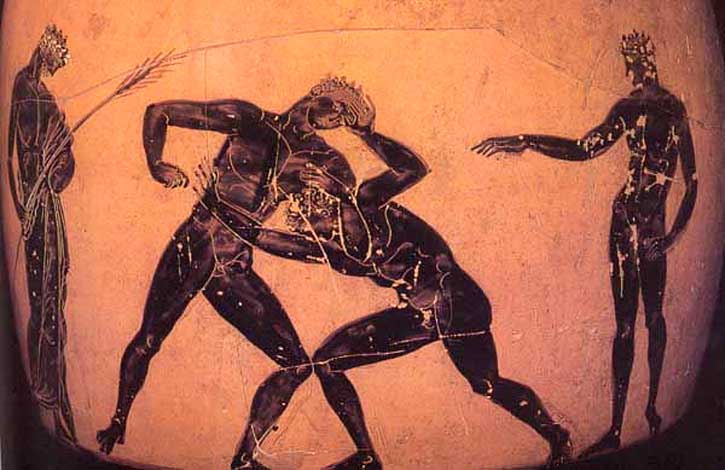
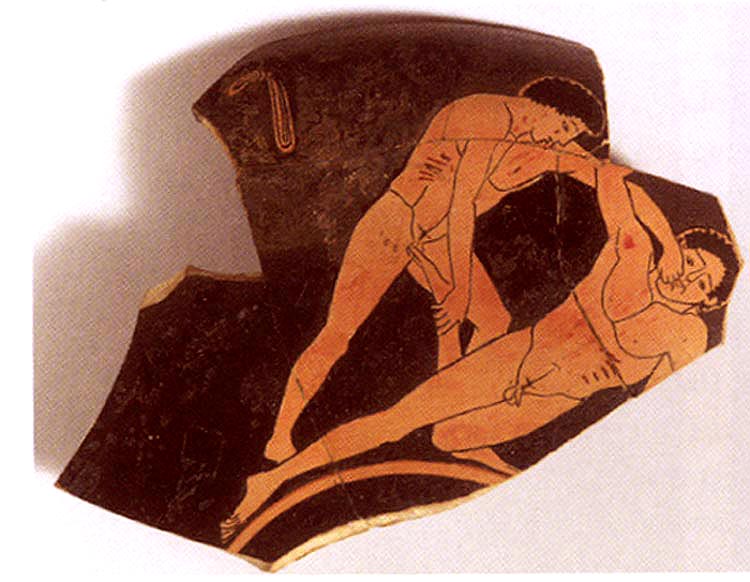

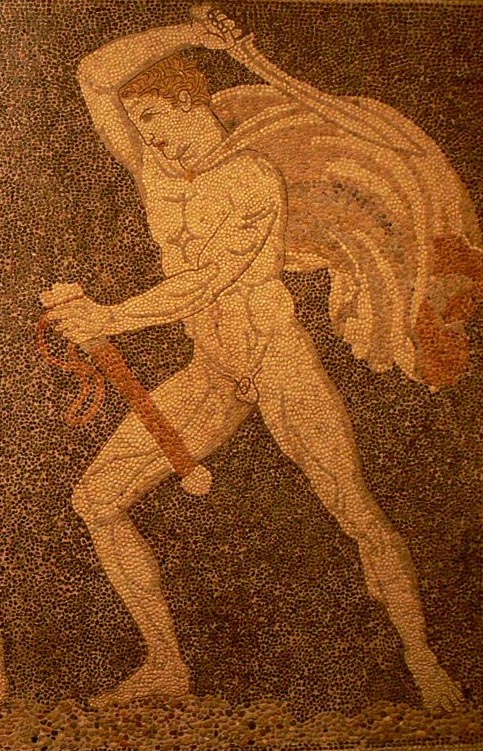
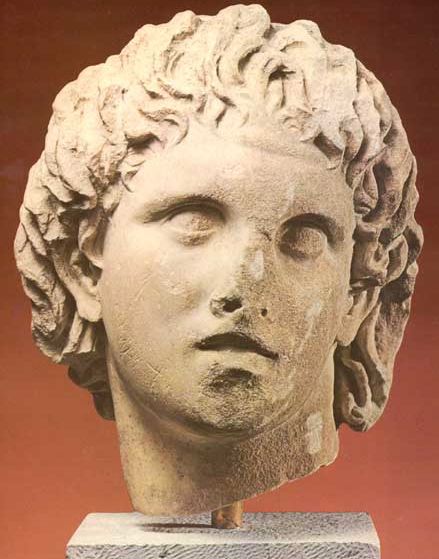
Alexander
Myth represents the active operations [daimonia] of the Gods.





The contemplation of the ειδωλον, image or symbol, leads us to the reality. The reality is always the Platonic Idea [which resides in the World of Being]. The ειδωλον, in the case of ordinary "things," is the material copy which men mistake for the reality. In the case of spiritual things and moral ideas, there is no visible image or symbol, but imperfect analogies, popular definitions, suggestive phrases . . .
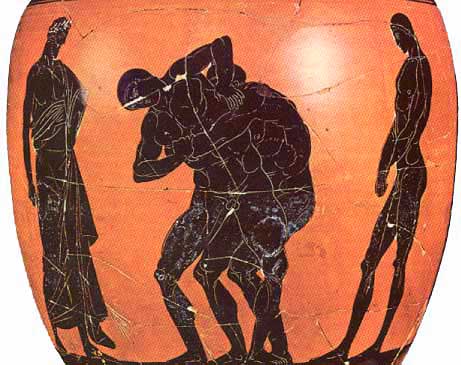
Wrestling
The ephedros is on the right ;
he'll Wrestle the Victor of the bout
[V]ictory in competition for timé also carried with it a strong entitlement to the obedience and deference of others and, therefore, lay at the basis of the loyalty of man for man. For it was simply in the nature of things, Greeks thought, for lesser men to respect and obey persons of the highest timé, worth, inasmuch as they were "worthy" of such treatment. Both gods [sic] and men paid automatic, unthinking respect to timé, and men paid respect to the gods [sic] at least in part because of their supreme timé.
The troops were, indeed, suffering terribly, but their discipline was wonderful. They made no attempt to beat off the enemy who were attacking them, but simply waited for the word from their God and their general, while they were shot and struck down at their posts.
The ruin of Paganism, in the age of Theodosius, is perhaps the only example of the total extirpation of any ancient and popular superstition; and may therefore deserve to be considered as a singular event in the history of the human mind.
The order was passed along the line to prepare for action, and suddenly there came over the whole phalanx the look of some ferocious beast, as it wheels at bay, stiffens its bristles, and turns to defend itself, so that the barbarians could no longer doubt that they were faced with Men who would Fight to the Death.
Hybris was both the act of insult -- whatever the reason for it -- and the arrogant disposition that disposed a man to the insult.
[T]he Athenians would not grant the Spartans the highest meed of valor [aristeia], nor allow them to erect a general trophy [tropaion], and the cause of the Hellenes had certainly gone at once to destruction from their armed contention, had not [the Athenian general and politician] Aristides, by abundant exhortation and admonition, checked his fellow-generals, especially Leocrates and Myronides, and persuaded them to submit the case to the Hellenes for decision.
Thereupon, in the council of the Hellenes, Theogeiton the Megarian said that the meed of valor must be given to some third city, unless they desired the confusion of a civil war. At this point Cleocritus the Corinthian rose to speak. Every one thought he would demand the meed of valor for the Corinthians, since Corinth was held in greatest estimation after Sparta and Athens. But to the astonishment and delight of all, he made a proposition in behalf of the Plataeans, and counselled to take away contention by giving them the meed of valor, since at their honor neither claimant could take offence.
